En opération - In operation
Mustang Mk I et IA : premiers combats
Mustang Mk I and IA : first fights
Les premiers "Mustang Mk I" furent livrés en janvier 1942 au Squadron n° 26 basé à Gatwick (Angleterre). Il devint opérationnel en février. En avril, les Squadrons de reconnaissance n° 2 et 16 furent équipés puis dans les mois suivants les n° 4, 63, 169, 239, 241, 268, 309 (Polonais), 400 (RCAF), 414 (RCAF), 430 et 613. Beaucoup de ces avions étaient équipés d'une caméra oblique derrière l'appui-tête du pilote. Des bandes jaunes furent peintes autour des ailes pour distinguer les Mustang des Me-109.
Le 10 mai 1942, le Flying Officer G.N. Dawson (SQN 26) effectue la première mission de combat : reconnaissance et mitraillage au dessus du terrain de Berck, et mitraillage sur le chemin du retour d'un train de marchandises.
The first "Mustangs Mk I" were delivered in January 1942 to Squadron n° 26 based in Gatwick (England). It became operational in February. In April, reconnaissance Squadrons n° 2 and 16 were equipped and in the following months Squadrons n° 4, 63, 169, 239, 241, 268, 309 (Polish), 400 (RCAF), 414 (RCAF), 430 and 613. Many of these planes were equipped with an oblique camera behind the pilot head-rest. Yellow strips were painted around the wings to distinguish the Mustang from the Me-109.
On May 10th, 1942, Flying Officer G.N. Dawson (SQN 26) made the first mission of combat : reconnaissance and machine-gunning over Berck airfield (North of France), and machine-gunning of a train on the way back.
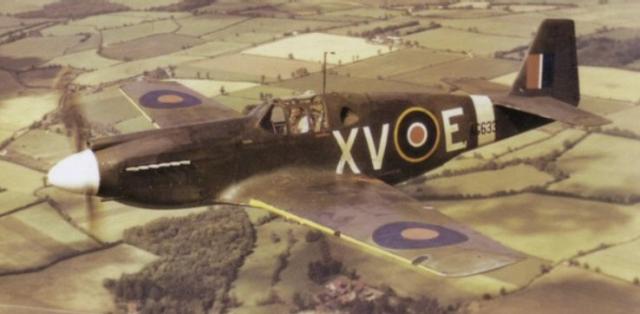
Mustang MkI (AG633) - Squadron 2
(source inconnue, probablement U.S.A.F. ou N.A.A. - Source unknown, probably U.S.A.F. or N.A.A.)
En juillet 1942, le Mustang n° AG415, en mission de "strafing" dans la région du Touquet, fut le premier Mustang abattu.
Le 19 août 1942, lors des opérations sur Dieppe, eut lieu la première victoire d'un "Mustang" (immatriculé RU-M s/n AG470 du SQN 414 de la RCAF), celui du pilote américain Hollis H. Hills (de Pasadena, Californie) sur un Focke Wulf Fw 190. Le même jour, l'ailier de Hills, le Flt Lt Freddie Clarke, fut abattu par les allemands (il fut secouru et revint à Gatwick le lendemain).
En octobre 1942, le "Mustang" fut mis de nouveau à l'honneur en étant le premier monomoteur allié à pénétrer en territoire allemand au cours d'un raid sur le canal Dortmund-Ems.
In July 1942, the Mustang # AG415, in mission of "strafing" in the area of Le Touquet, was the first Mustang shot down.
The first operational mission for some of these planes occurred on July 27th, 1942, to prepare the landing on Dieppe (France) planned in August. Despite the failure of this operation, it was the occasion of the first victory of a "Mustang" on August 19th (registered RU-M, s/n AG470 from RCAF SQN 414), flew by flying officer Hollis H. Hills (from Pasadena, California) on a Focke Wulf Fw 190. The same day, Hollis wingman, Flt Lt Freddie Clarke, was shot down by the Germans (he was rescued and joined Gatwick the following day).
In October 1942, the "Mustang" was again at the honored by being the first single-engined allied aircraft to penetrate in German territory during a raid on the Dortmund-Ems channel.
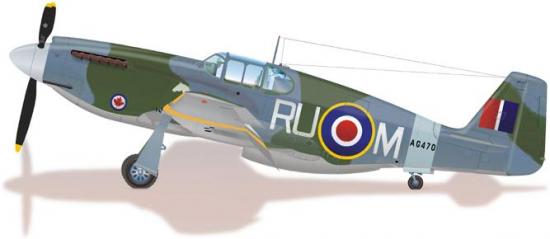
Mustang Mk I -RCAF SQN 414 , Hollis H. Hills
© John H. Stanley - source : http://graphicommunication.com
Au final, les 618 Mustang I (620 moins les 2 prototypes XP-51) furent affectés à 14 escadrilles : les 2e, 4e, 16e, 26e, 63e, 169e, 239e, 241e, 268e et 613e de la RAF, les 400e, 414e et 430e de la RCAF et la 309e escadrille polonaise de la RAF.
Les 93 Mustang IA furent affectés aux escadrons 2, 63, 168, 170, 268 et 516 de la RAF.
Finally, the 618 Mustang I (620 except the 2 prototypes XP-51) were assigned to 14 squadrons : the 2nd, 4th, 16th, 26th, 63rd, 169th, 239th, 241st, 268th and 613th of the RAF, the 400th, 414th and 430th of the RCAF and the 309th Polish squadron of the RAF.
The 93 Mustang IA were assigned to squadrons #2, 63, 168, 170, 268 and 516 of the RAF.

Mustang I - 16 Sqn, Army Co-Operation Command, RAF
Angleterre, juin 1942 - England, June 1942.
artiste inconnu - artist unknown - source : http://wp.scn.ru

Mustang I - 309 Sqn (Polish), Army Co-Operation Command, RAF
Angleterre, 1942 - England, 1942.
artiste inconnu - artist unknown - source : http://wp.scn.ru

Mustang I - 613 Sqn, RAF
Manchester 1942
artiste inconnu - artist unknown - source : http://wp.scn.ru

Mustang IA - 170 Sqn, Ford Air Base, RAF
Angleterre, hiver 1942-43 - England, Winter 1942-43.
artiste inconnu - artist unknown - source : http://wp.scn.ru
Premiers "Mustang" américains au combat
First american "Mustang" at war
Sur les 55 avions F6-A prélevés par l'USAAF parmi les Mustang Mk IA prévus pour les anglais, 35 furent envoyés en Afrique du Nord via l'Angleterre. La toute première mission fut effectuée le 9 avril 1943 par le Lt Alfred Schwab, à bord du n°41-37328 affecté au 154e Observation Sqn, 68e Observation Group de la 12e Air Force ; l'avion, basé à Sbeitla (Tunisie) effectua des photos de l'aérodrome de Kairouan. Quelques jours plus tard, le 23 avril 1943, le premier Mustang américain, piloté par le Lt John F. Osbrone, fut malheureusement abattu par la DCA alliée.
On the 55 planes F6-A taken by the USAAF out of the Mustang Mk IA planned for the English, 35 were sent in North Africa via England. The very first mission was carried out on April 9th, 1943 by Lt Alfred Schwab, on board n°41-37328 affected to the 154th Observation Sqn, 68th Observation Group of the 12th Air Force ; the plane, based in Sbeitla (Tunisia) brought back photographs of the Kairouan airfield. A few days later, on 23rd April, 1943, the first american Mustang flown by Lt. John F. Osborne, was unfortunately shot down by the allied AA gun.
A-36 et P-51 A en guerre
A-36 and P-51 A at war
Afrique du Nord - Northern Africa

North American A-36A (42-83956), 27th BG (Light), Ras el-Ma (Maroc - Morocco)
© Jean-Marie Guillou
300 A-36A seront expédiés en Méditerranée pour équiper les 27th et 86th Bombardment Groups. Le 27e FBG (Fighter Bomber Group), transformé sur A-36 en avril 1943 au Maroc à Ras el-Ma, puis basé à Korba (Tunisie) et équipé de A-36A, participa le 6 juin 1943 aux attaques contre les îles italiennes de Pantelleria et Lampedusa. Le 27e FBG, avec le 86e, également équipé de A-36 depuis novembre 1942, participèrent à l'invasion de la Sicile puis à la campagne d'Italie.
300 A-36A were shipped in the Mediterranean area to the 27th and 86th Bombardment Groups. The 27th FBG (Fighter Bomber Group), transformed to A-36 in April 1943 at Ras el-Ma in Morocco, then based in Korba (Tunisia) and equipped with A-36A, particpated on June 6th, 1943 to the attacks against the Italian islands of Pantelleria and Lampedusa. The 27th FBG, with the 86th, also equipped with A-36 since November 1942, took part in the invasion of Sicily and then Italy.
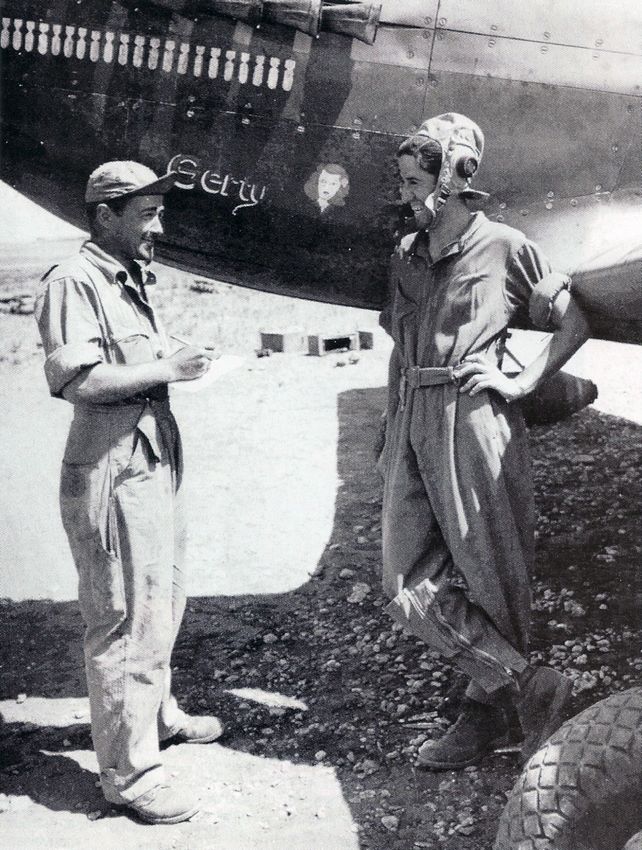
1st Lieutenant Joseph Carparelli, 522th FBS, 27th FBG
Devant son A-36A (42-84041)- Standing near his A-36A (42-84041)
photo : auteur inconnu - author unknown
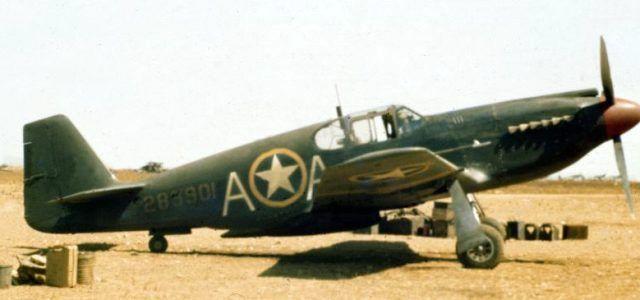
North American A-36A, 42-83901
Version initiale - Early version
Photo : auteur inconnu - author unknown (John P. Crowder ?)
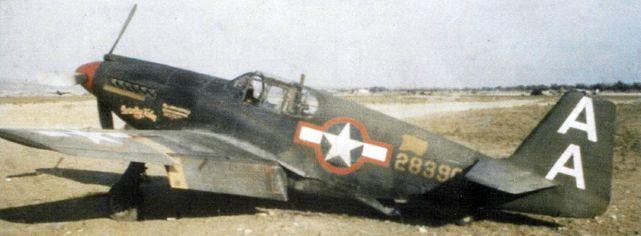
North American A-36A, 42-83901
Seconde version - Later version
© USAF - Domaine public - Public domain

North American A-36A-1-NA (42-83901),
John P. Crowder, 524th FBS, 27th FBG, 12th AF
ou/or Major R.D. Rathburn, 522nd FBS, 27th FBG, 12th AF
© Jean-Marie Guillou
Le 18 juillet, le 27th BG opère depuis le terrain de Gela, rejoint 2 jours plus tard par le 86th BG (D). C'est lors de la conquête de la Sicile, en août 1943, que l'A-36 sera baptisé définitivement "Invader", pour le distingué du "P-51" ou du "Mustang". Commence alors la conquête de l'Italie : les Squadrons du 86th FBG sont renumérotés à partir du 23 août : le 309th devient le 525th, le 310th le 526th et le 312th le 527th FBS.
On July 18th, the 27th BG moved to the airfield of Gela, joined 2 days later by the 86th BG(D). At the time of the conquest of Sicily, in August 1943, that A-36 was definitively nicknamed “Invader”, to distinguish it from the “P-51” or the “Mustang”. Then began the conquest of Italy : the Squadrons of 86th FBG were renumbered on August 23rd : the 309th became the 525th, the 310th the 526th and the 312th the 527th FBS.
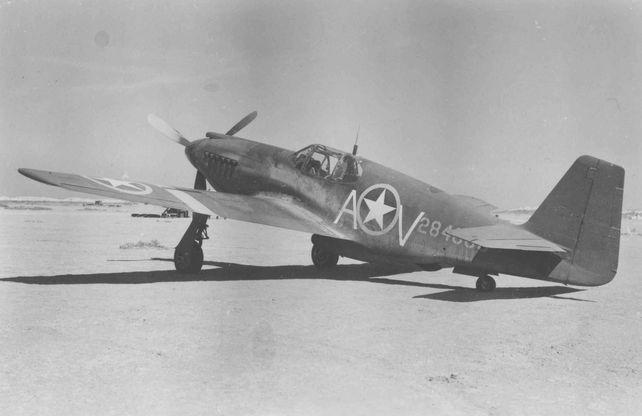
North American A-36A, 86th FBG
© USAF - Domaine public - Public domain

North American A-36A (42-84057), 525th FBS (Dive), 86th FBG (Dive), Camp Cazes, 1943 (Maroc - Morocco)
© Jean-Marie Guillou
Fin août 1943, les 27th et 86th FBG sont regroupés au sein du 63rd Fighter Bomber Wing. Le 13 septembre 1943, le 2nd Lieutenant Michael T. Russo abat un FW 190. Il deviendra rapidement as avec 5 victoires et sera le seul as du 27th FBG mais aussi seul as sur A-36.
Late August 1943, the 27th and 86th FBG were gathered in the 63rd Fighter Bomber Wing. On September 13th, the 2nd Lieutenant Michael T. Russo shot down a FW 190. He became rapidly an ace with 5 air kills et was the only ace of the 27th FBG but also only ace on A-36.

North American A-36A-1-NA (42-83803), Lt Michael T. Russo, 522nd FBS, 27th FBG, 12th Air Force
Auteur inconnu - Author unknown
Le 14 janvier 1944, le Captain Robert M. Dungan est abattu et tué par la Flak à bord du A-36A n°42-84067 à Sant'Angelo in Theodice près de Monte Cassino.
On January 14th, 1944, the Captain Robert M. Dugan was shot down and killed by the Flak on board his A-36A s/n 42-84067 at Sant'Angelo in Theodice near Monte Cassino.
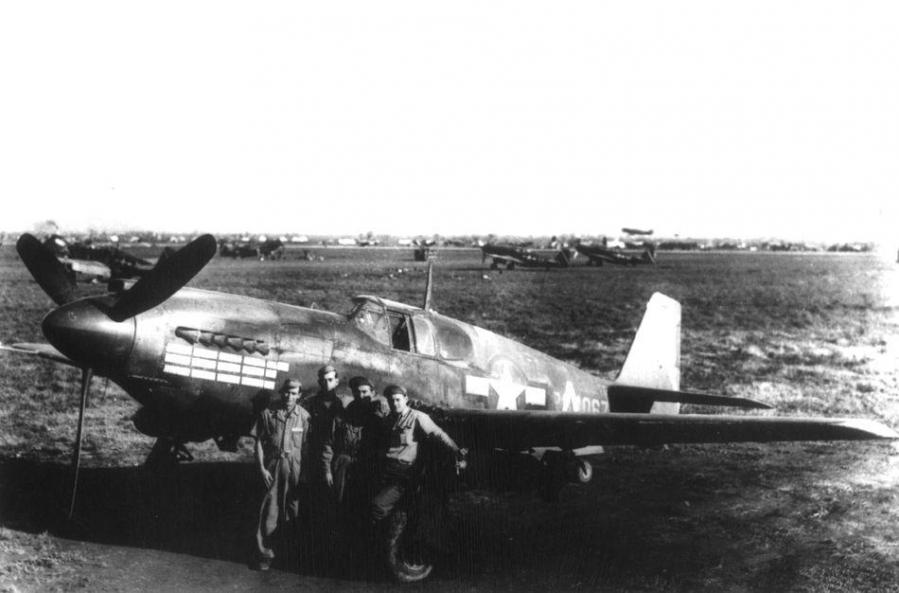
North American A-36A (42-84067), Captain Robert M. Dungan, 527th FBS, 86th FBG selon le/according to 86th FBG
ou/or 27th FBG, 12th AF selon l'American Air Museum/according to American Air Museum
(Sicile, 1943 - Sicily, 1943)
Photo FRE 8776 © IWM - www.americanairmuseum.com

North American A-36A (42-84067), Captain Robert M. Dungan, 527th FBS, 86th FBG
Pormigliano (Italie, janvier 1944 - Italy, January 1944)
© Jean-Marie Guillou
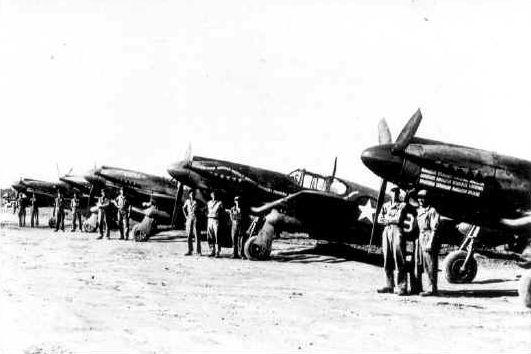

North American A-36A, 27th FBG
(Italie, 1944 - Italy, 1944)
© USAF - Domaine public - Public domain
Lors de la bataille de Salerne, le Lieutenant J.B. Walton et ses ailiers du 524th FBS largueront des médicaments et munitions à la place des habituelles bombes, à un détachement de la 82nd Division Aéroportée isolé. En février 1944, les A-36 sont regroupés au sein du 86th FBG et le 27th FBG vole dorénavant sur P-40 Warhawk. Le 86th FBG continue la conquête de l'Italie.
During the battle of Salerno, the Lieutenant J.B. Walton and his wingers dropped drugs and ammunition to an isolated group of the 82nd Airborne Division. In February 1944, the A-36 were gathered in the 86th FBG and the 27th FBG flew P-40s Warhawk. The 86th FBG continued the conquest of Italy.
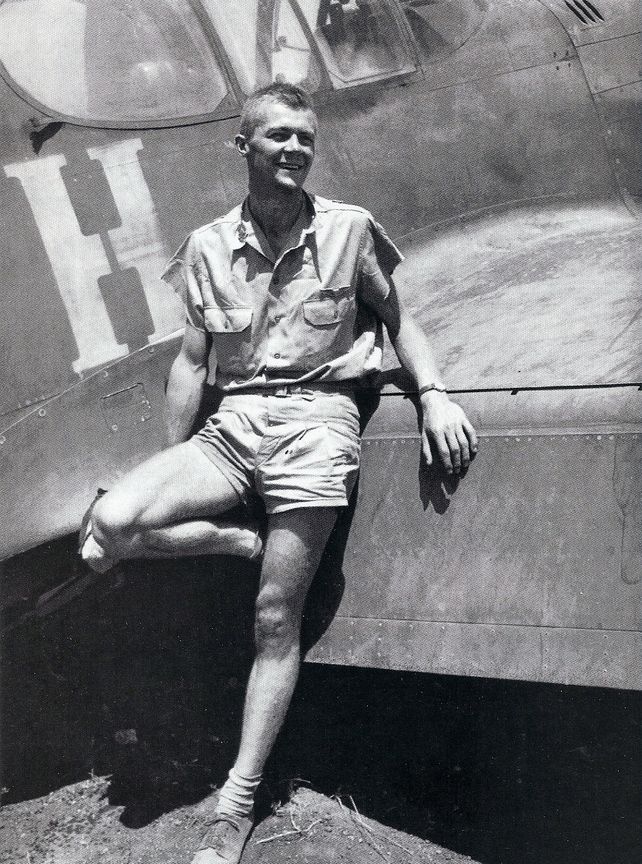 Ma
Ma
Major Robert J. Kirsch, 527th FBS, 86th FBG - Été 1943, Sicile - Summer 1943, Sicily
photo : auteur inconnu - author unknown
Le 13 mars 1944, des FW 190 du I./JG 2 menés par l'Oberleutnant Georg Schröder surpennent et abattent 4 A-36 du 526th FBS (pilotes tués), tandis que 20 autres A-36 attaquent des installations ferroviaires près d'Attigliano. En juin 1944, il ne reste qu'une trentaine d'Invader fatigués dans le 86th FBG. Quelques uns seront transférés au 111th TRS, et les autres détruits. Le 86th FG sera équipés ensuite de P-47 Thunderbolt.
On March 13th, 1944, FW 190s of I./JG 2, leaded by Oberleutnant Georg Schröder, surprised and shot down 4 A-36 of 526th FBS (pilots killed), when 20 other A-36 attacked railway inbstallations near Attigliano. In June 1944, remained only about thirty "tired" Invaders in the 86th FBG. Some were transferred to the 111th TRS, and the others were destroyed. The 86th FG ws then equipped with P-47 Thunderbolt.
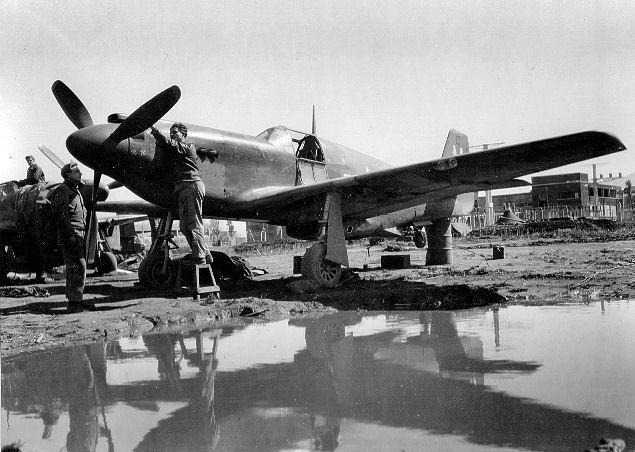
North American A-36A, 86th FBG
© USAF - Domaine public - Public domain
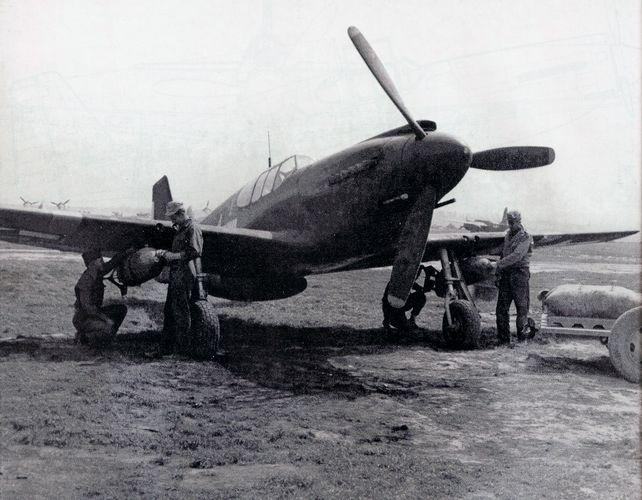
North American A-36A, 86th FBG, Pomigliano d'Arco, 1944
© USAF - Domaine public - Public domain
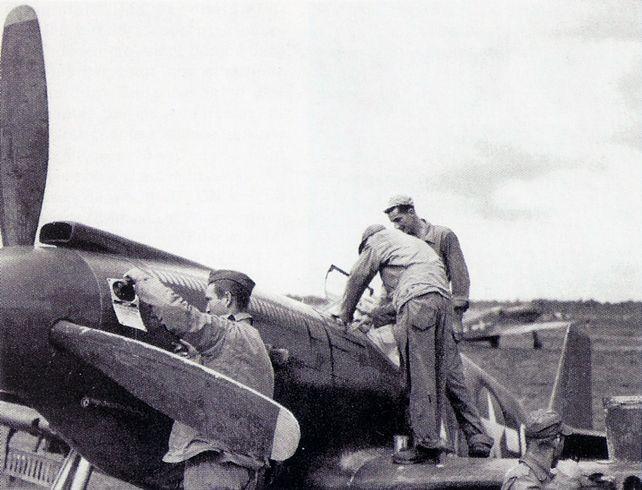
North American A-36A, 100ème victoire - 100th air kill
© USAF - Domaine public - Public domain
Inde et Birmanie - India and Burma
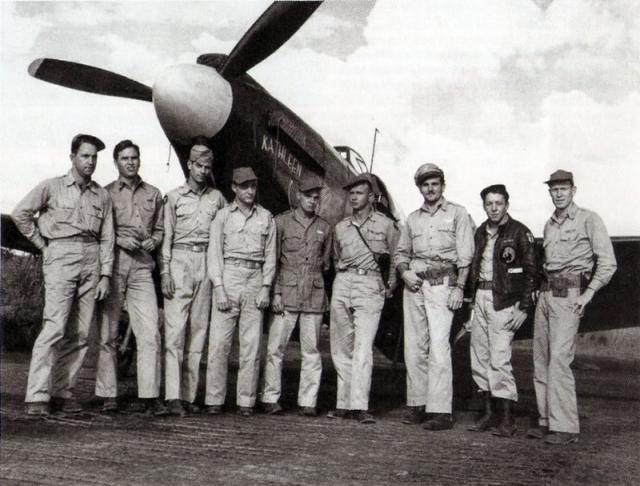
North American P-51A "Kathleen", 311th FBG, Dinjan, Inde, 15 août 1944 - India, 15th August, 1944
(à gauche - on left : Captain James J. England) - © USAF - Domaine public - Public domain
Les premiers A-36 et P-51A furent envoyés aux Indes au 311th FBG (10th Air Force), mené par le Lieutenant Colonel Charles G. Chandler, à la fin de l'été 1943. Les A-36 sont d'abord basés à Nawadih puis à Dinjan en octobre 1943. Puis les Squadrons sont dispersés : le 530th FBS à Sookerating, le 528th FBS à Mohabari et le 529th FBS à Dinjan.
The first A-36 and P-51A were sent in the Indies to the 311th FBG (10th Air Force), leaded by Lieutenant Colonel Charles G. Chandler, late summer 1943. The A-36s were then based in Nawadih and then in Dinjan in October, 1943. Then the Squadrons were divided : the 530th FBS in Sookerating, the 528th FBS in Mohabari and the 529th FBS in Dinjan.
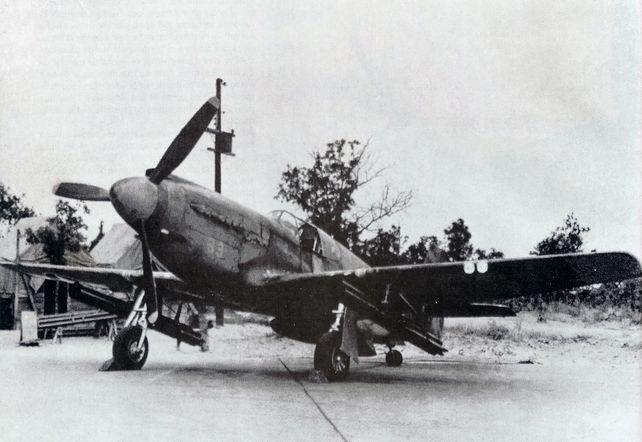
North American A-36A, 311th FBG
Lance roquettes expérimentaux, début 1944, Birmanie - Experimental rocket launchers, early 1944, Burma
© USAF - Domaine public - Public domain
La première mission fut pour 8 A-36 de bombarder une garnison japonaise près de la frontière birmane. Le 18 janvier 1944, le Flying Officer Hoyt M. Hensley abat un Zero "Zeke", ce qui constitue la 1ère victoire d'un A-36 sur ce théâtre d'opérations. Le 27 mars, 8 appareils japonais sont abattus, dont 4 par le Captain James J. England du 530th FS.
The first mission was for 8 A-36 to bomb a japanese garrison close to the Burmese border. On January 18th, 1944, Flying Officer Hoyt M. Hensley shot down a Zero "Zeke" which was the first air kill of a A-36 in this theater of operations. On March 27, 8 japanese aircrafts were shot down, almong them 4 by Captain James J. England of 530th FS.
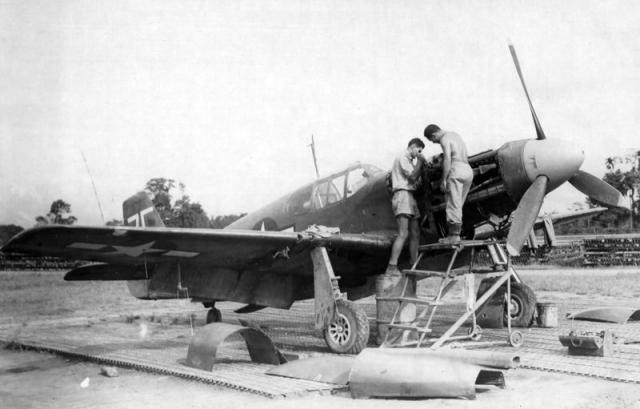
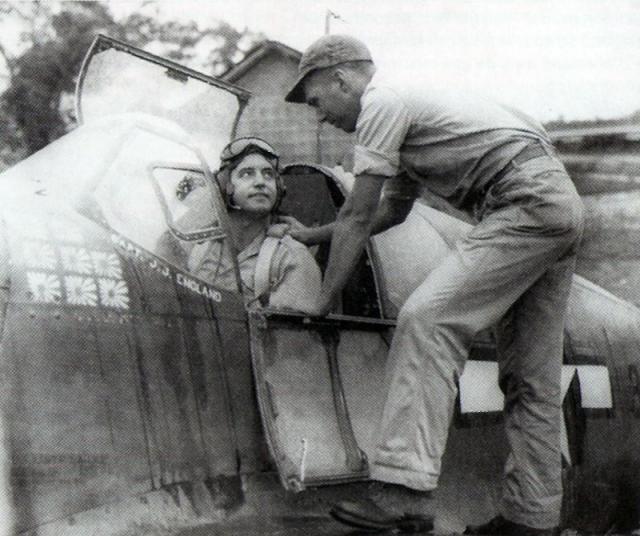
North American P-51A-1 "Jackie" (s/n 43-6077), Maj. James J. England, 311th FBG, 530th FBS
© USAF - Domaine public - Public domain
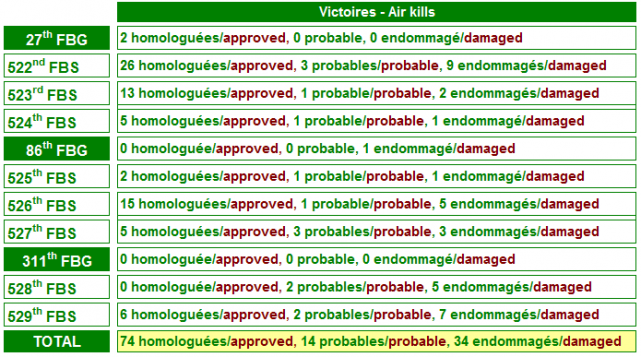
Les victoires des unités sur A-36 - Air kills of A-36 units
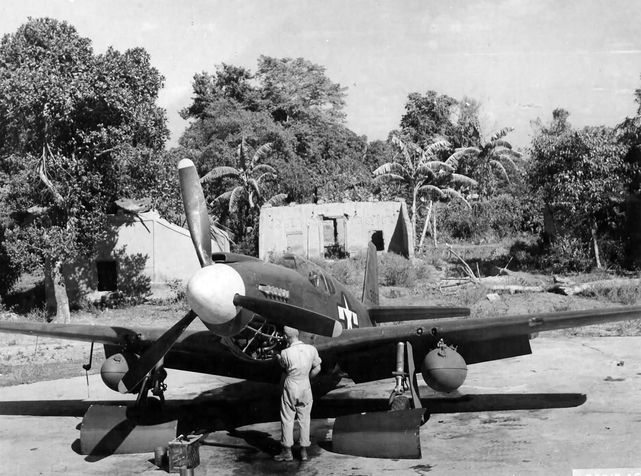
North American P-51A-5-NA (43-6109), 311th FBG, Tingkawk Sakan, Birmanie 1944 - Burma 1944
© USAF - Domaine public - Public domain
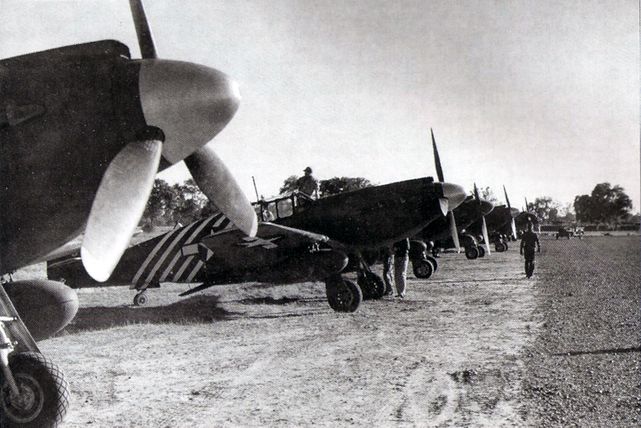
P-51A - Ist Air Commando Group, Karachi
Photo : auteur inconnu - author unknown
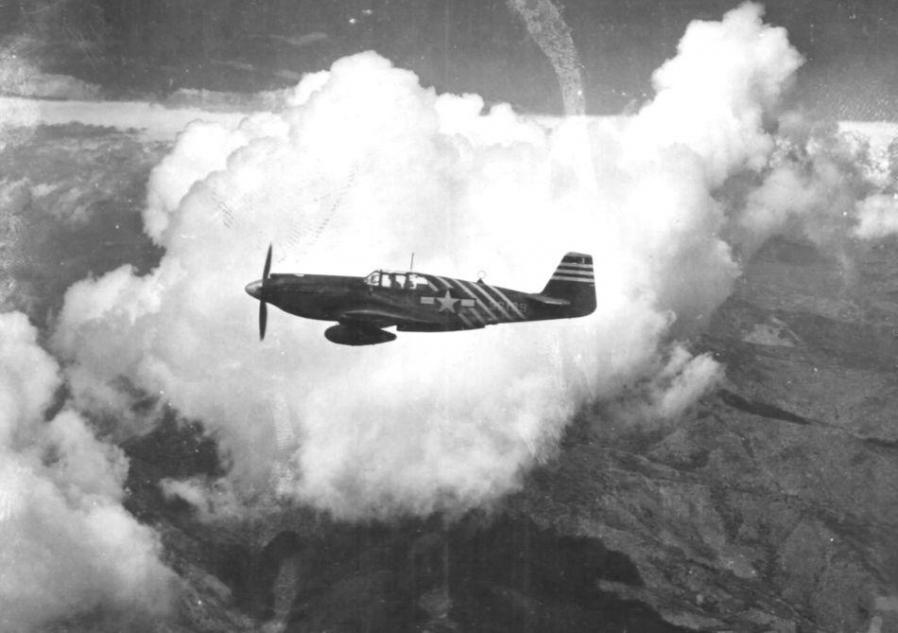
P-51A (s/n 43-6189) - Col. Philip Cockran, CO Ist Air Commando Group, Birmanie/Burma, 1944
Photo : auteur inconnu - author unknown
La dotation de la 1ère unité d'opérations spéciales de l'USAAF fut de 348 avions dont 30 P-51A, sous le nom de "Project 9", qui devint "project CA 281", puis 5318th Provisional Air Unit puis enfin 1st Air CommandoGroup.
The equipment of the 1st unit of special operations of the USAAF gathered 348 aircrafts, including 30 P-51A, under the name of “Project 9”, which became “project CA 281”, then 5318th Provisional Air Unit then finally the 1st Air CommandoGroup.
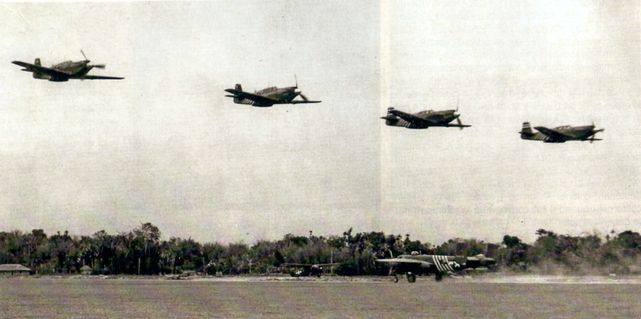
P-51A - 5318th Provisional Air Unit, Broadway Airfield, Birmanie - Burma
Photo : source inconnue - source unknown
Cette unité fut utilisée en support des troupes de Wingate engagées sur les arrières japonais en Birmanie. Les 23rd et 51st Fighter Groups furent également équipés de P-51A. En Angleterre, le 107e Squadron de Reconnaissance fut formé et équipé de F6-B.
This unit was assigned to support Wingate's troops engaged on the Japanese backs in Burma. The 23rdst Fighter Groups were also equipped with P-51As. In England, the 107th Reconnaissance Squadron was created and equipped with F6-B.
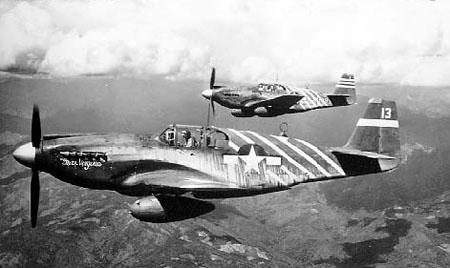
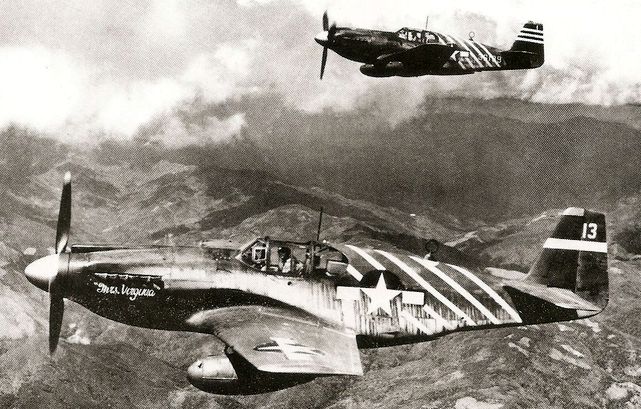
P-51A - Ist Air Commando Group
Au fond : avion du Lt.Col. Philip G.Cochran piloté par le 2nd Lt. Aurele R. Van de Weghe
Au premier plan : Major Robert L. Petit
Background : aircraft of Lt. Col. Philip G. Cochran flown by 2nd Lt. Aurele R. Van de Weghe
Foreground : Major Robert L. Petit
(source : National Museum of the U.S.A.F. - USAF - Domaine public - Public domain)
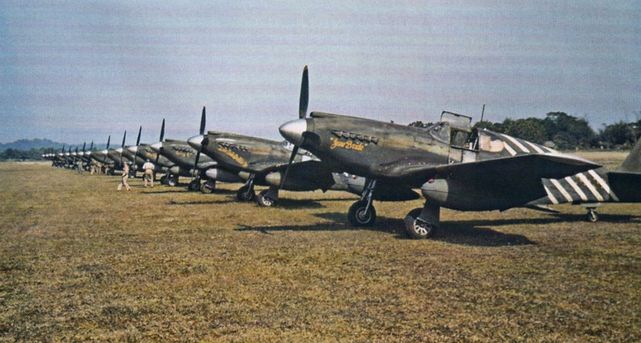
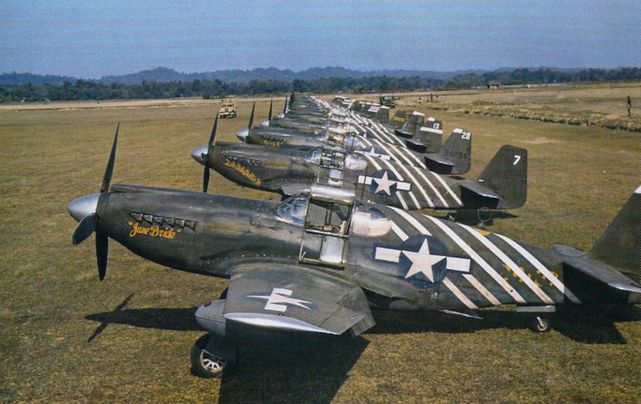
P-51A - Ist Air Commando Group, Hailakandi, India
Photo : source inconnue - source unknown
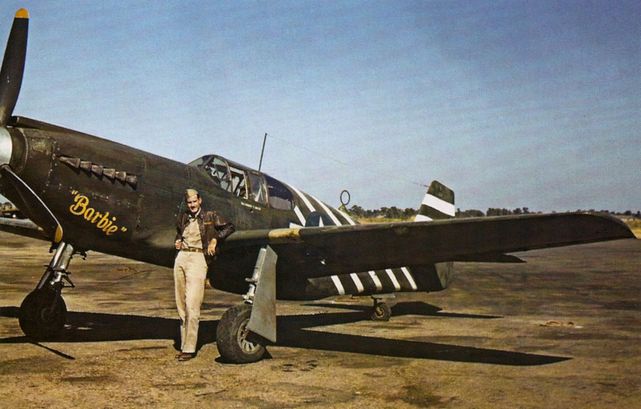
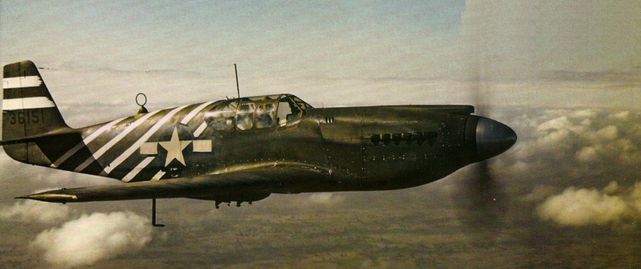
P-51A-5-NA (43-6151) Lt.Col. R.T.Smith - Ist Air Commando Group
© Smith family
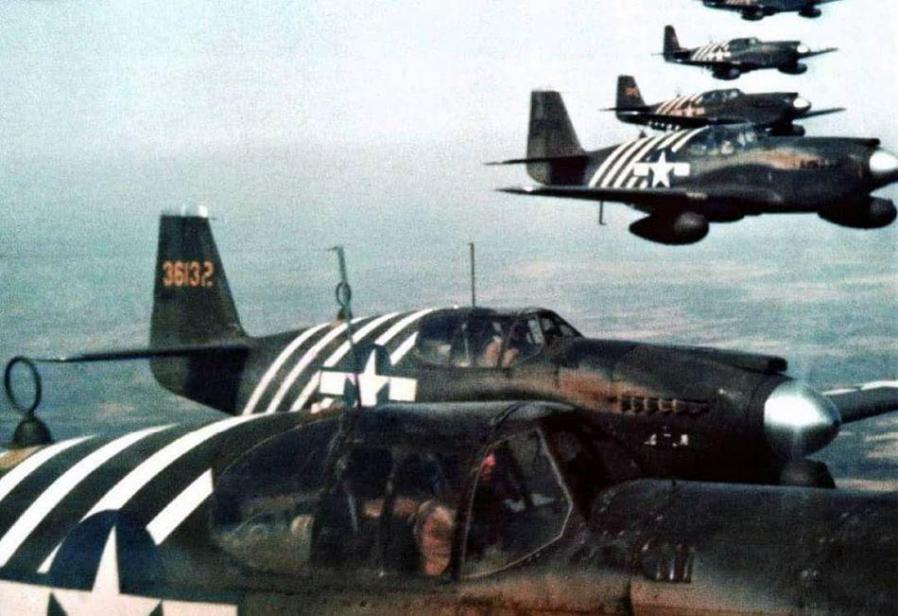
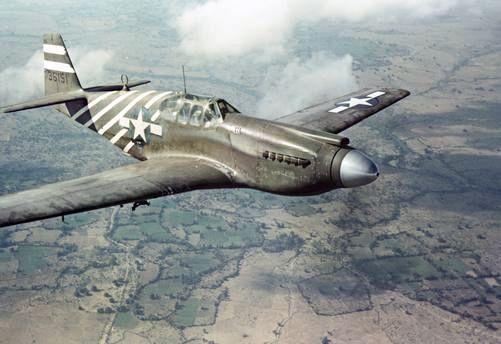
P-51A - Ist Air Commando Group, Birmanie/Burma 1944
© Smith family
Victoires 1st Air Commando - 1st Air Commando air kills
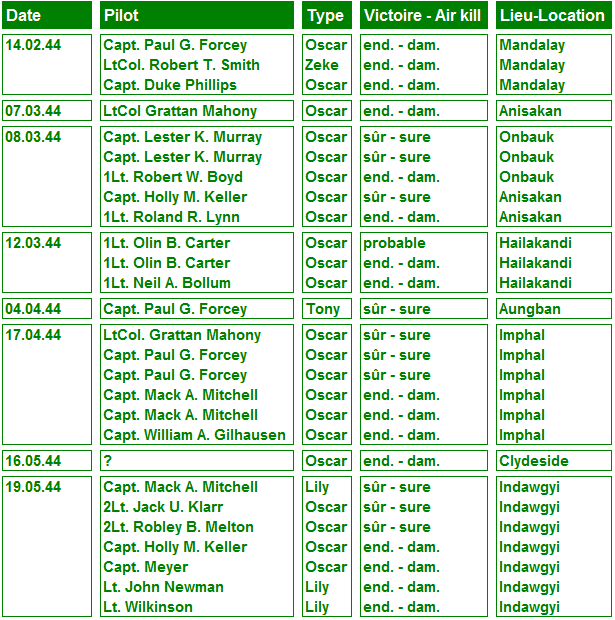
end. - dam. : endommagé - damaged
Lily : Kawasaki Ki-48 - Oscar : Nakajima Ki-43 - Tony : Kawasaki Ki-61 - Zeke : Mitsubishi A6M
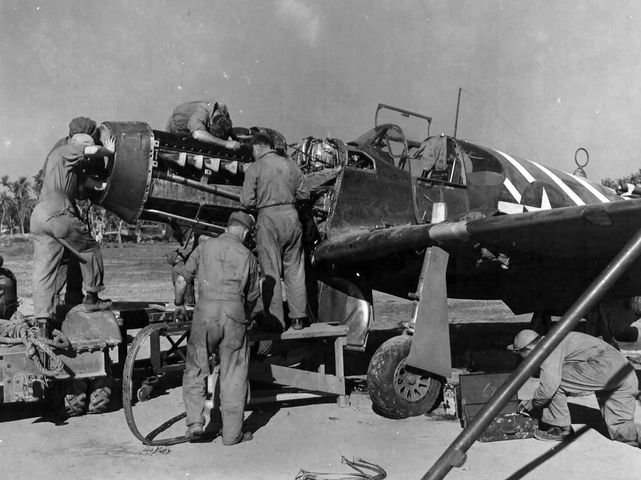
P-51A-5-NA "Barbie" (43-6151) Lt.Col. Robert T.Smith - Ist Air Commando Group
© US NARA (domaine public - public domain)
Avec la RAF - With the RAF
La 12th Air Force prêta 6 A-36A Apache au n° 1437 Flight de la RAF basé à Matariya en Egypte. Ils porteront les numéros HK944 "C" (42-84018), HK945 "B" (42-83898), HK946 "F" (42-84117), HK947 "A" (42-84107), HK955 "D" (42-83906) et HK956 "E" (42-83829). Ils débuteront leurs missions depuis Luga (Malte), le 12 juillet 1943.
The 12th Air Force lent 6 Apaches A-36A to the RAF n° 1437 Flight based in Matariya in Egypt. They were registered HK944 "C" (42-84018), HK945 "B" (42-83898), HK946 "F" (42-84117), HK947 "A" (42-84107), HK955 "D" (42-83906) and HK956 "E" (42-83829). They began their missions from Luga (Malta), on July 12th, 1943.
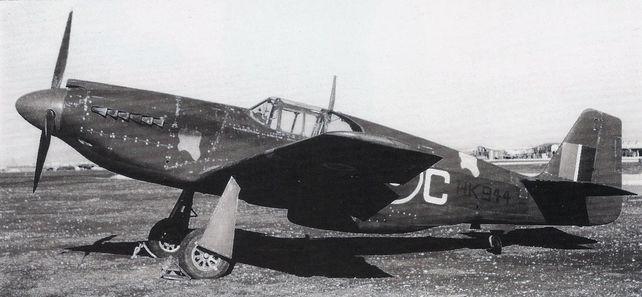
North American A-36A HK944, 1437 Flight
© UK Government - Domaine public - Public domain
2 Apaches seront abattus par la Flak, dont celui du Flight Sergeant K.C.E. Stanley le 31 juillet (pilotes saufs). Le Flight sera dissous le 17 octobre 1943 et les 4 avions restants resteront à la RAF et seront radiés fin août 1944.
2 Apaches were shot down by the Flak, such as the Flight Sergeant K.C.E. Stanley on July 31st (pilots safe). The Flight was dissolved on October 17th, 1943 and the 4 remaining planes remained in the RAF and were erased at the end of August 1944.
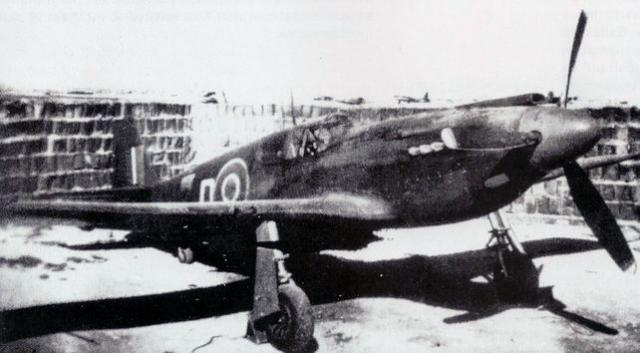
North American A-36A HK955, 1437 Flight
Photo : auteur inconnu - author unknown
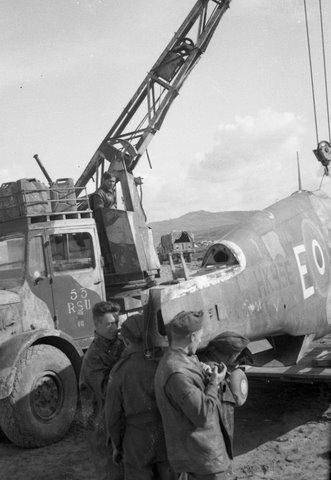
North American A-36A HK956, 1437 Flight, Squadron Leader S.G. Welshman
Probablement le 4 Septembre 1943 lors d'une panne moteur.
Probably on September 4th, 1943 after an engine failure
© UK Government - Domaine public - Public domain
Les P-51 B et C au combat
P-51 B and C at war
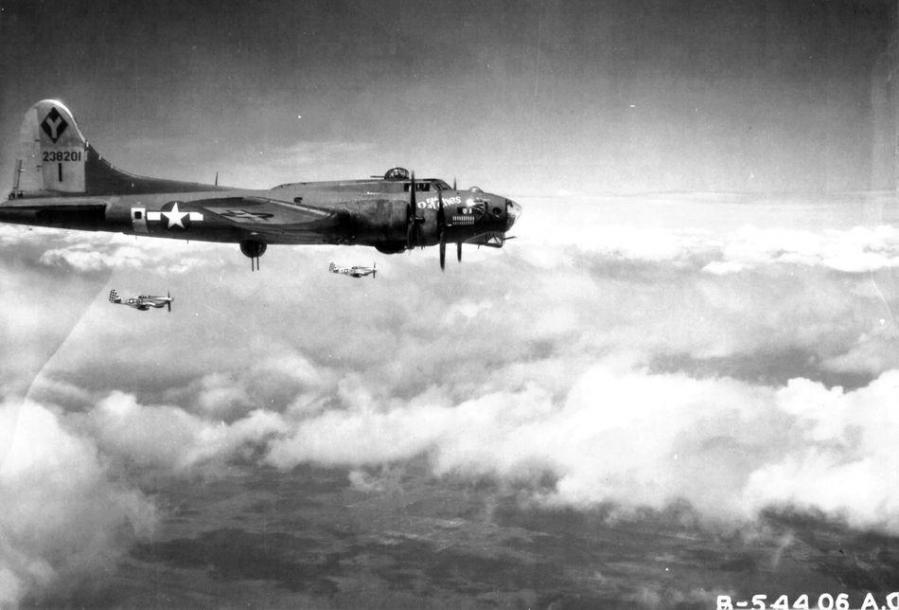
Mustang P-51B (325th FG) & Boeing B-17, Mission navette vers la Russie - Shuttle mission to Russia
Photo UPL40710 © IWM - www.americanairmuseum.com
EN EUROPE - IN EUROPE
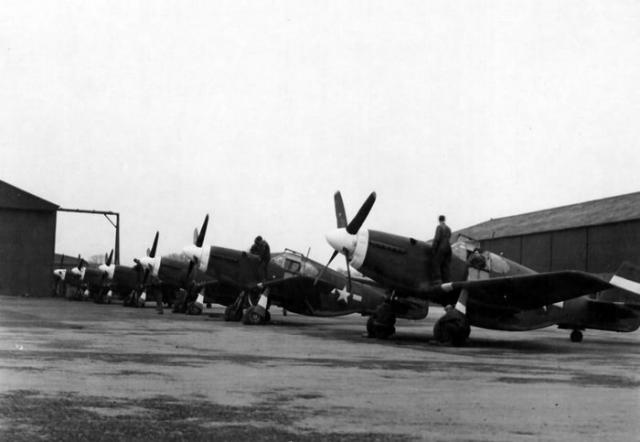
North-American Mustang P-51B, 9th Air Force, Burtonwood (Angleterre, England), 1944
© San Diego Air and Space Museum (domaine public - public domain)
Le premier groupe équipé de ces nouveaux P-51fut le 354e FBG (9e Air Force) en Angleterre. Ce groupe s'entraîna à la base de Colchester en novembre 1943 puis devint opérationnel à la base de Boxsted. Le 1er décembre eut lieu la première incursion en France. Le 13 décembre, première mission d'escorte à long rayon d'action sur Kiel.
The first group equipped with these new P-51 was the 354th FBG (9th Air Force) in England. This group was based at Colchester airfield in November 1943 and became operational at Boxsted airfield. On December 1st was done the first incursion in France. On December 13th, first long range escort mission on Kiel.
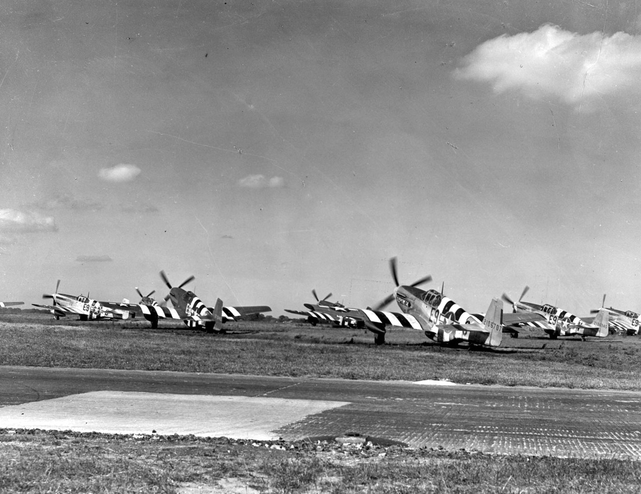
Mustang P-51B 376th Fighter Squadron, 361st Fighter Group
© USAF - Domaine public - Public domain
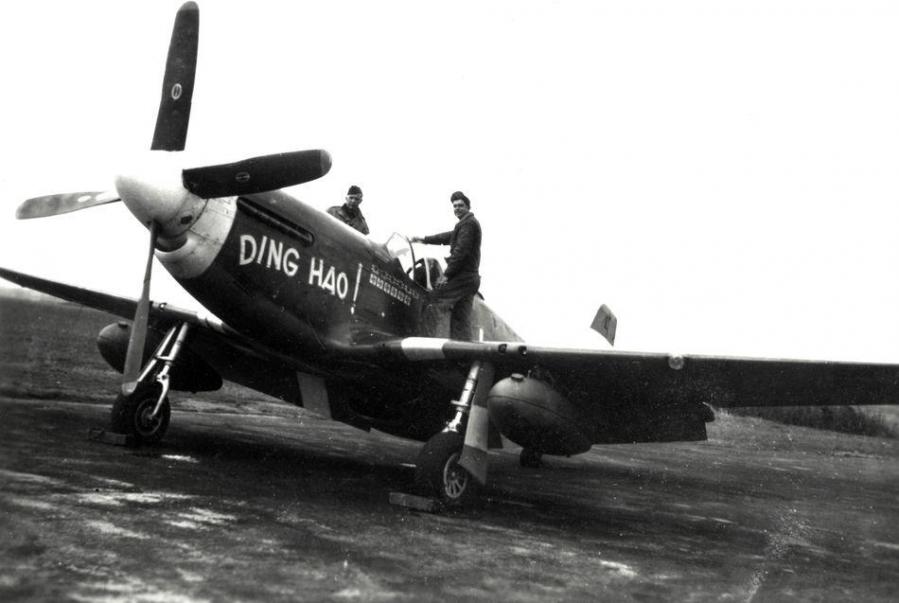
Mustang P-51B-5-NA 'AJ-A' (s/n 43-6315) 356th FS, Major James Howard
Photo UPL27695 © IWM - www.americanairmuseum.com
Le 11 janvier 1944, le major James H. Howard, commandant du 356e Squadron (du 354e FBG) mit seul en déroute une quarantaine de chasseurs allemands (Me Bf 110) après en avoir abattu 3 sûrs et 3 probables.
On January 11th, 1944, major James H. Howard, Commander of the 356th Squadron (354th FBG) faced alone around forty German fighters (Me Bf 110) and shot 3 sure and 3 probable aircrafts.
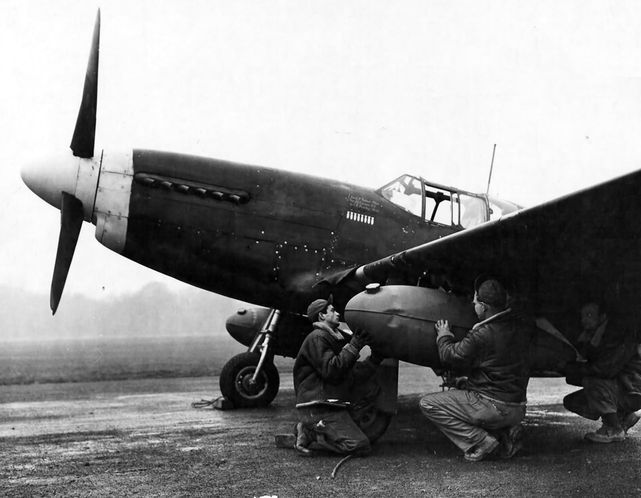
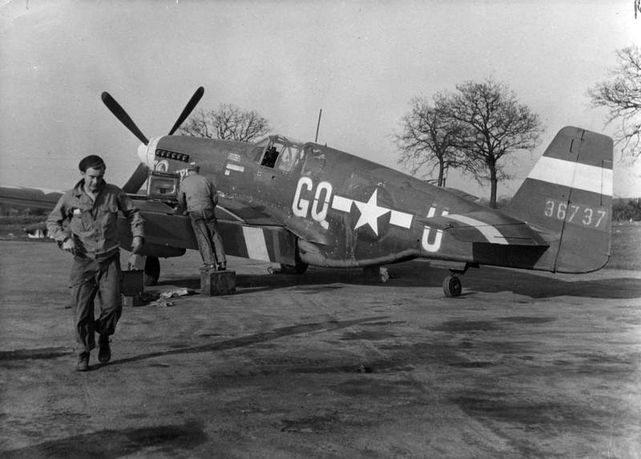
Mustang P-51B-5, 43-6737, 1st Lt Gilbert F. Talbot, 355th FS, 354th FG
© USAF - Domaine public - Public domain
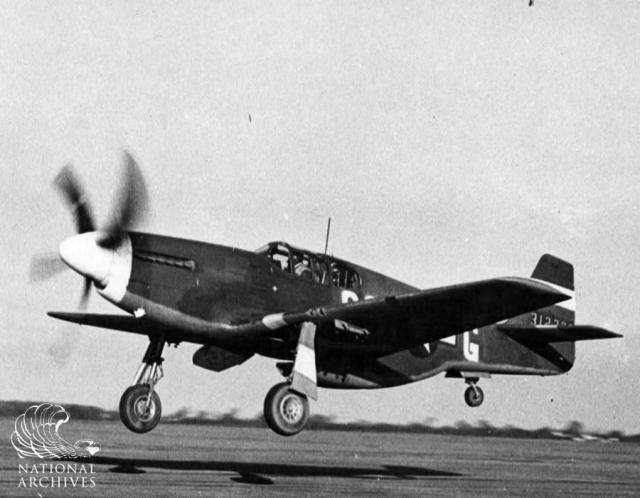
Mustang P-51B-1-NA, "GQ-G" 43-12320, 1st Lt "Gory Gus" Allen, 355th FS, 354th FG,
Boxted, Angleterre, février 1944 - England, February 1944.
© U.S. National Archives and Records Administration - Domaine public - Public domain
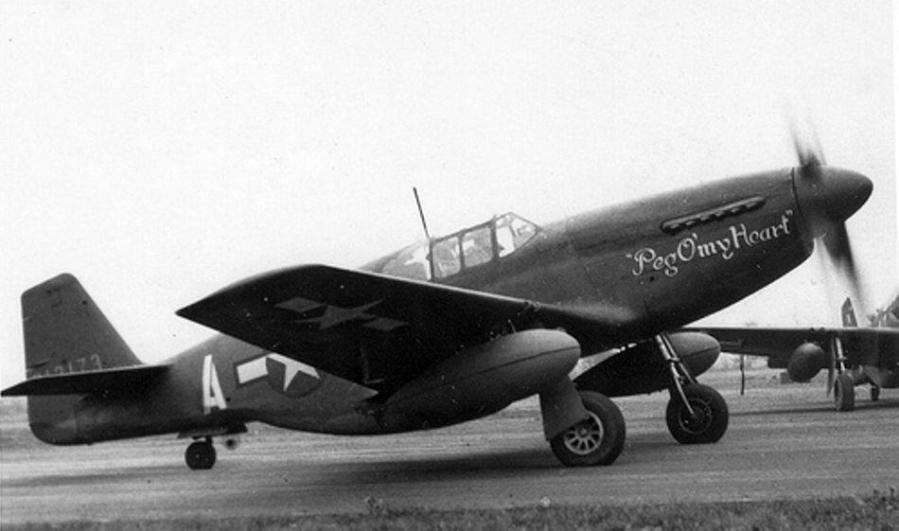
Mustang P-51B-1-NA, "GQ-A" "Peg O' my Heart", 43-12173, 355th FS, 354th FG,
Boxted, Angleterre, England
Photo UPL17016 © IWM - www.americanairmuseum.com
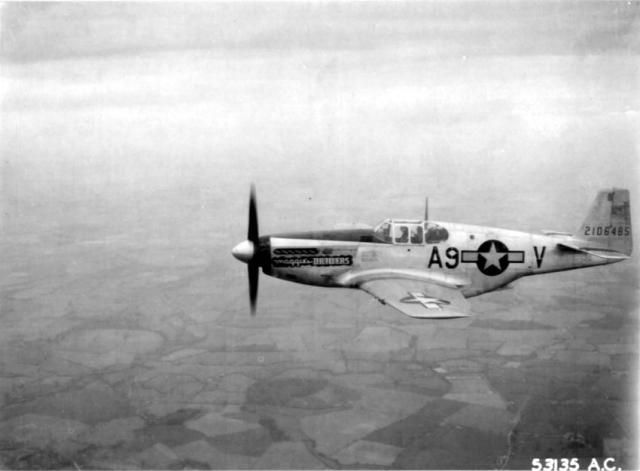
North American P-51B-10-NA Mustang, 42-106485 "Maggie's Drawers", 380th FS, 363th FG, 9th AF
Photo UPL33449 © IWM - www.americanairmuseum.com
Pendant ses 55 premiers jours opérationnels, le 354e FBG réalisa 13,1 victoires en moyenne pour 100 sorties (2,7 pour les P-47 et 4,3 pour les P-38 sur la même durée). Le 354e FG participa au débarquement du 6 juin 1944 ainsi que le 361st FG.
During the first 55 operational days, the 354th FBG obtained 13.1 victories on average for 100 exits (2.7 for P-47 and 4.3 for P-38 over the same period). The 354th FG took part into the D-Day on 6th June, 1944 as well as the 361st FG.
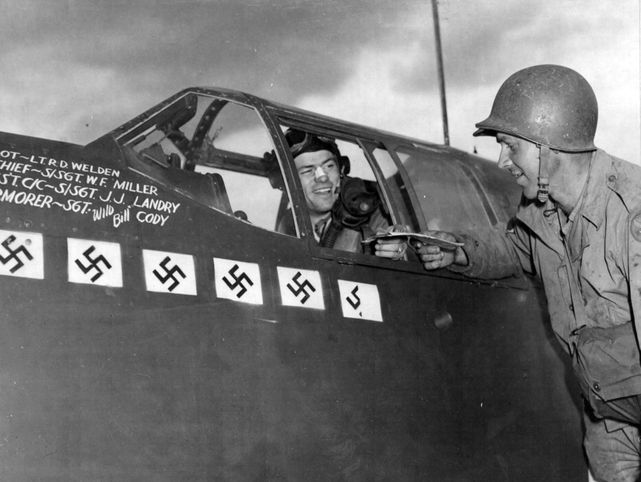
Mustang P-51B-1-NA "AJ-W" Mackie The 3rd, 356th FS, 354th FG
Le 2/Lt Thomas Whelan revient de mission le 6 juin 1944 sur l'avion du Lt Robert Welden.
Il est accueilli par le chef mécanicien S/Sgt William Miller.
2/Lt Thomas Whelan comes back from mission on June 6th, 1944 with Lt Robert Welden's aircraft.
He's welcomed by the chief engineer S/Sgt William Miller
© USAF - Domaine public - Public domain
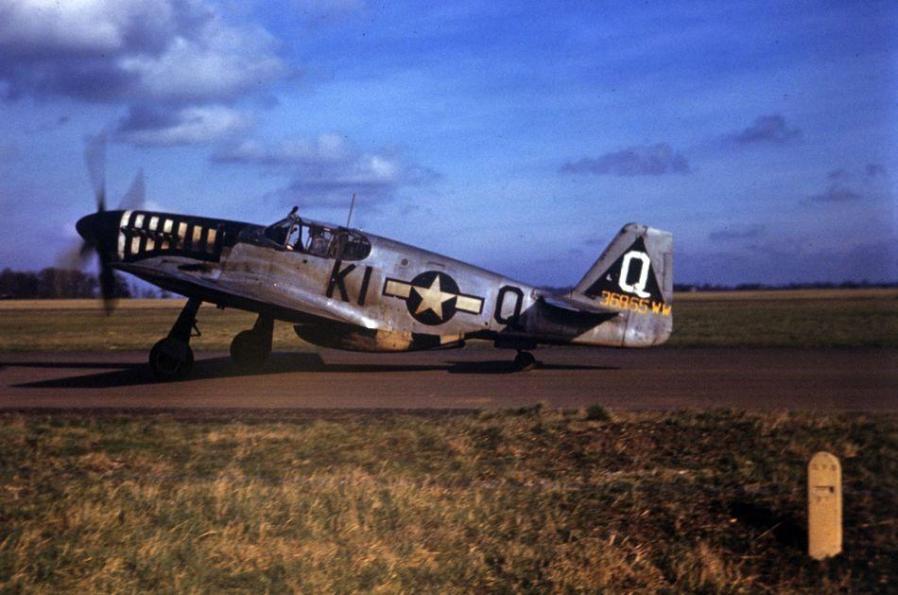
North-American Mustang P-51B-5 (s/n 43-6865) 20th FG, Angleterre/England, 1944-1945
marqué "ww" sur la queue pour "war weary" (usé par la guerre)
marked "ww" on the tail for "war weary"
Photo FRE 5437 © IWM - www.americanairmuseum.com
En décembre 1943, le 382nd FS fut équipé de Mustang et forma, avec les 381st et 383rd FS le 363rd FG. Arrivés en Angleterre fin 1943, ils ne percevront leurs 11 premiers P-51B que le 22 janvier 1944 sur la base de Rivenhall (base n°166) dans l'Essex. C'est début juin 1944 que le 382nd FS percevra son 1er P-51D
In December 1943, the 382nd FS was equipped with Mustang and formed, with the 381st and 383rd FS the 363rd FG. They arrived in England at the end of 1943, but received their first 11 P-51B only on 22 January, 1944 on the base of Rivenhall (base No. 166) in Essex. In early June 1944, the 382nd FS received its 1st P-51D
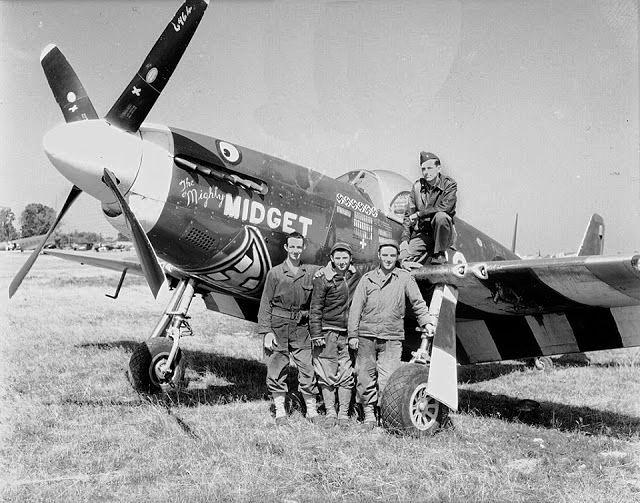
© USAF - Domaine public - Public domain

© Jean-Marie Guillou
Mustang P-51B-7-NA (43-6964) "The Mighty MIDGET", 382th FS, 1st Lt James Clark
Juillet 1944 - July 1944
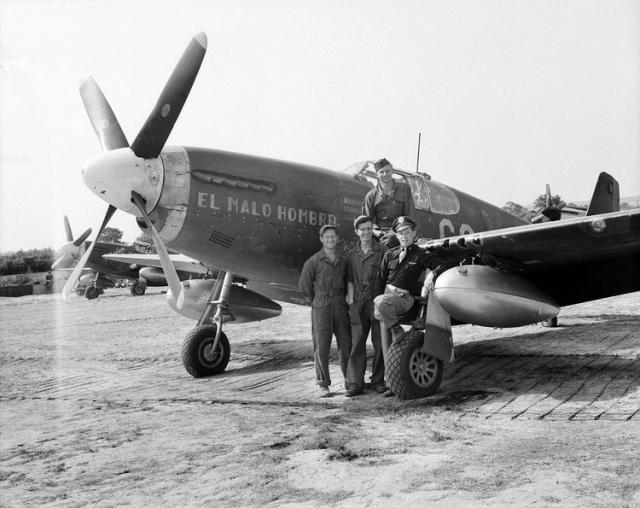
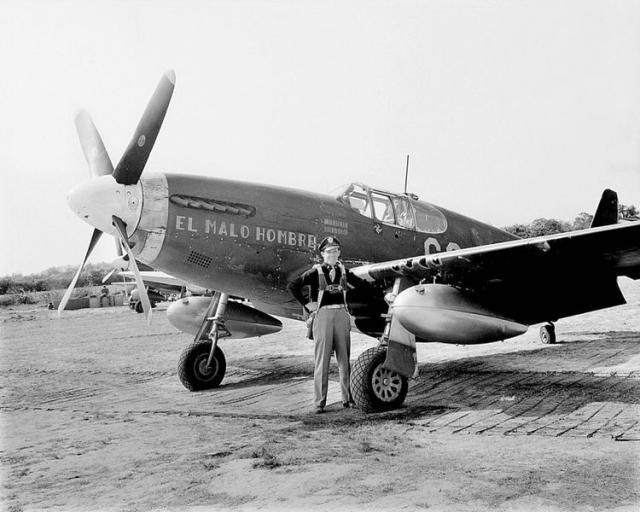
Mustang P-51B-7-NA (43-6830), 382th FS
© USAF - Domaine public - Public domain

Mustang P-51B-7-NA (43-6830), 382th FS, Lt W. Bullard
Avril 1944 - April 1944
© Jean-Marie Guillou
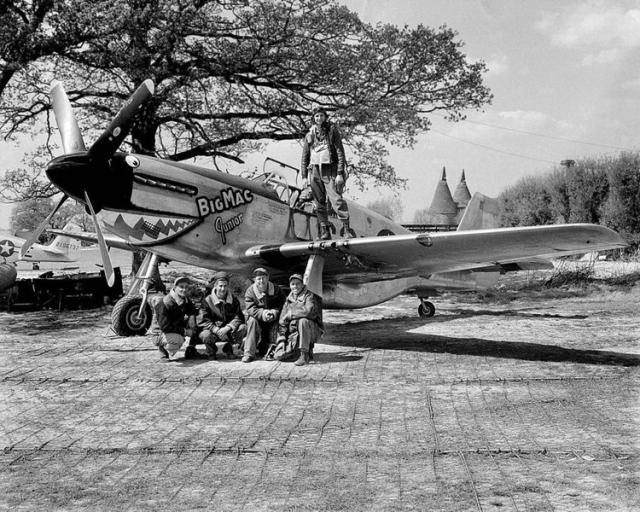
© USAF - Domaine public - Public domain

© Jean-Marie Guillou
Mustang P-51B-10-NA (42-106647 ?) "Big Mac Junior", 382th FS, Capt. John Brown
Stapplehurst, mai 1944 - Stapplehurst, May 1944

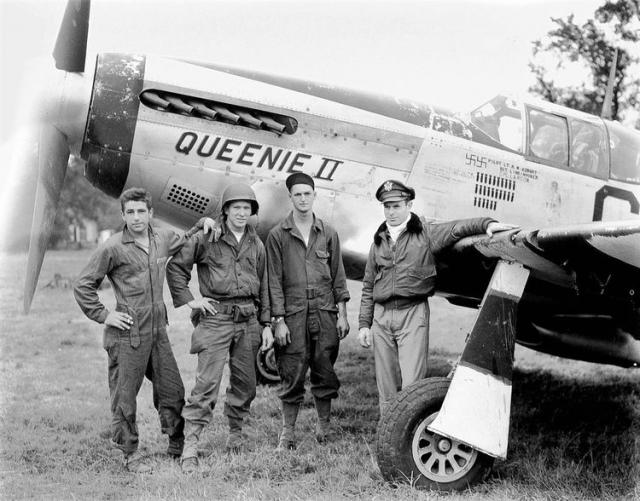
Mustang P-51B "Queenie II", 382th FS, Lt. Richard Asbury
© USAF - Domaine public - Public domain

Mustang P-51B-5-NA (43-6438), 382th FS, Major McWerther
Mai 1944 - May 1944
© Jean-Marie Guillou
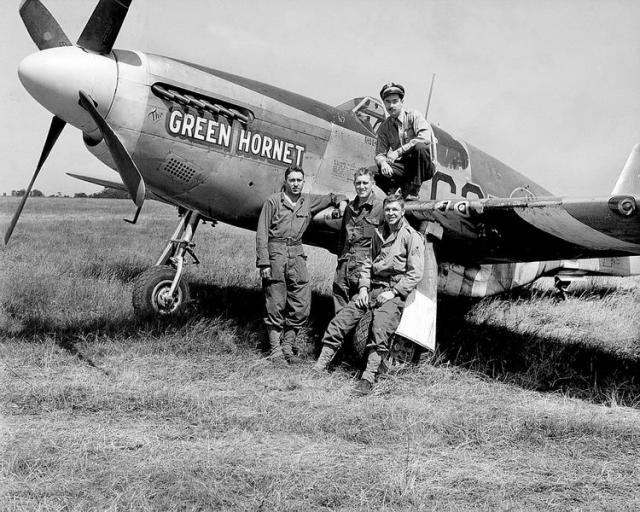
© USAF - Domaine public - Public domain

© Jean-Marie Guillou
Mustang P-51C-5-NT (42-103613) "The Green Hornet", 382th FS, Lt. John Stricker, Normandie/Normandy
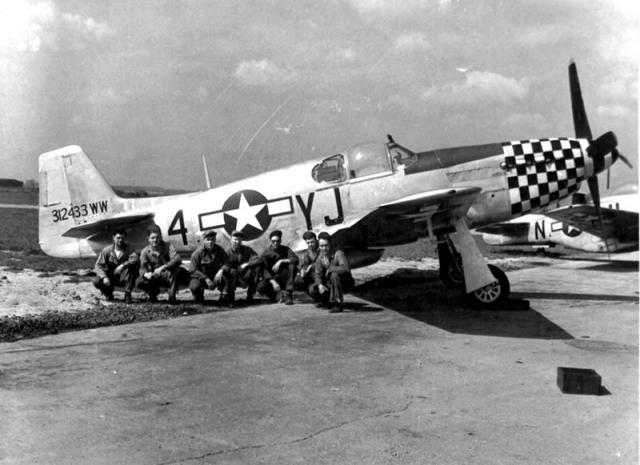
North American P-51B-1-NA #43-12433 (ex-Mustang III s/n FX905) - 362nd FS 357th FG, 8th Air Force
Photo UPL 7554 © IWM - www.americanairmuseum.com
Le second groupe équipé de P 51 B/C fut le 357e (8e Air Force) en Angleterre également. Sa première mission fut un raid sur Rouen le 11 février 1944. Après avoir volé sur un Mustang du 354e groupe, le Colonel Don Blakeslee exigea des P-51 pour son groupe, le 4e FG, qu'il obtint à condition d'être opérationnel sous 24 heures après réception.
The second group equipped with P 51 B/C was the 357th (8th Air Force) also in England. Its first mission was a raid over Rouen on February 11th, 1944. After having flown on a Mustang of the 354th group, the Colonel Don Blakeslee required P-51s for his group, the 4th FG, which he obtained under the condition that his group had to be operational 12 hours after aircrafts reception.
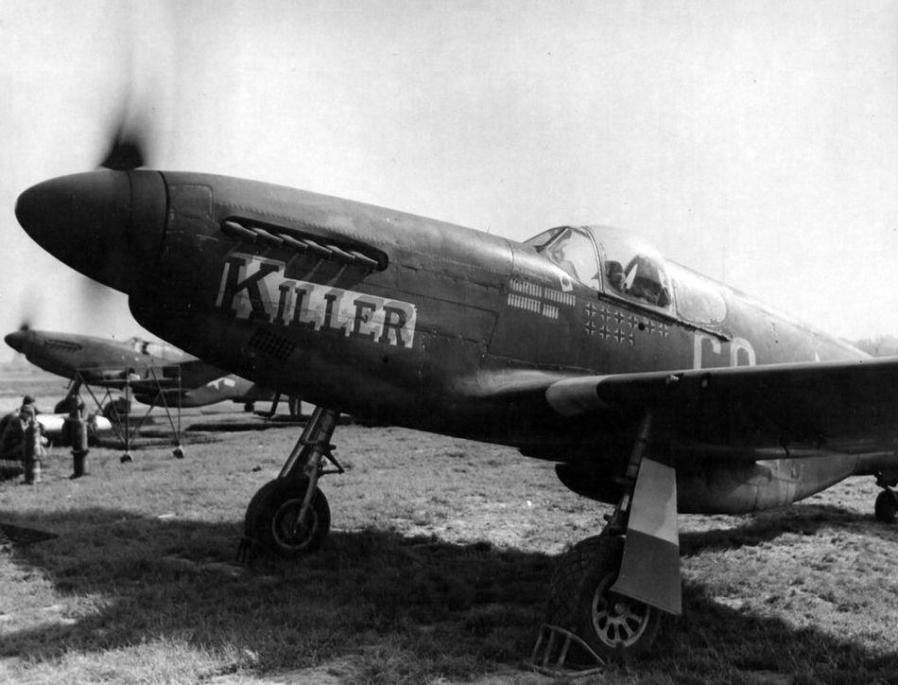
P-51B-1-NA (s/n 43-12152) "Killer", Captain Robert W. Stephen, CO. 355th FS, 354th FG, Lashenden, Mai/May 1944
© USAF - Domaine public - Public domain
Equipé le 27 février 1944, le 4e FG partait au combat le 28 après 1 heure de vol de prise en main par pilote. 156 victoires furent remportées le premier mois puis 207 le mois suivant. Le 4e FG allait devenir leader au nombre de victoires.
Equipped on February 27th, 1944, the 4th FG had his first combat on the 28 after that each pilot had 1 training flight hour. 156 victories were obtained the first month and 207 the following one. The 4th FG became leader in terms of aerial kills.
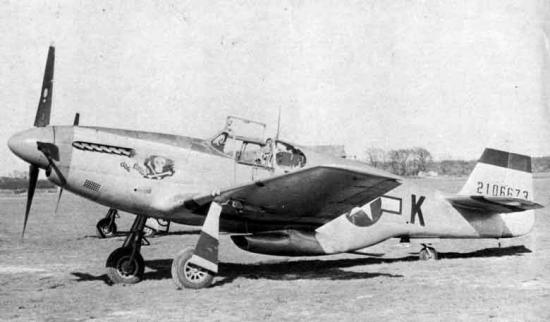
P-51B 42-106673 VF-K "Hey Rube!" - Capt. Reuben Simon - 336th FS, 4th FG
with courtesy http://www.littlefriends.co.uk (Peter Randall)
En Italie, ce sont 4 groupes qui furent équipés de P-51 B et C : les 52e FG (12e AF), 31e, 325e et 332e (15e AF). Ils escortèrent des bombardiers lors de raids sur la Roumanie ou l'Allemagne.
In Italy, 4 groups were equipped with P-51 B and C : the 52th FG (12th AF), 31st, 325th and 332nd (15th AF). They escorted bombers during raids over Romania or Germany.
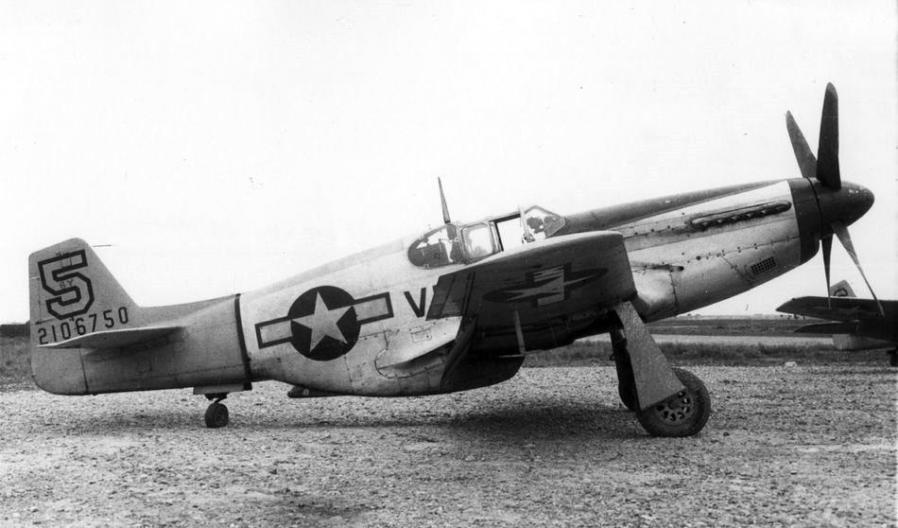
P-51B-15-NA Mustang (s/n 42-106750) 52nd FG, 5th FS, 15th AF - Italie, printemps 1945 - Italy, spring 1945
Photo FRE 8687 © IWM - www.americanairmuseum.com
En mars 1944, le 325e effectua le premier vol d'escorte hors limite de rayon d'action, se posa en URSS et effectua sur le retour un nouveau vol d'escorte de B-17 et B-24 sur Berlin.
In March 1944, the 325th accomplished the first escort flight over limit of range, landed in the USSR to refuel and accomplished on the way back a new escort flight of B-17 and B-24 over Berlin.
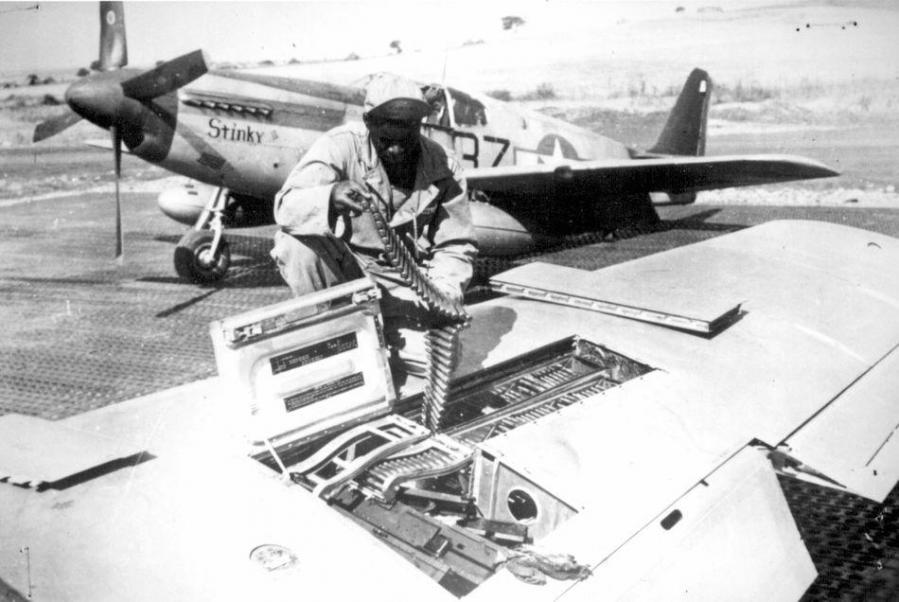
Mustang P-51C 'Stinky II', 100th FS, 332th FG - "Tuskegee Airmen"
Au 1er plan, le première classe John Fields charge des munitions dans un P-51B (Italie)
In the foreground, Pfc John Fields loads the wing guns of a P-51B
Photo NARA 342-FH-3A24042-53702AC - USAF (domaine public - public domain)
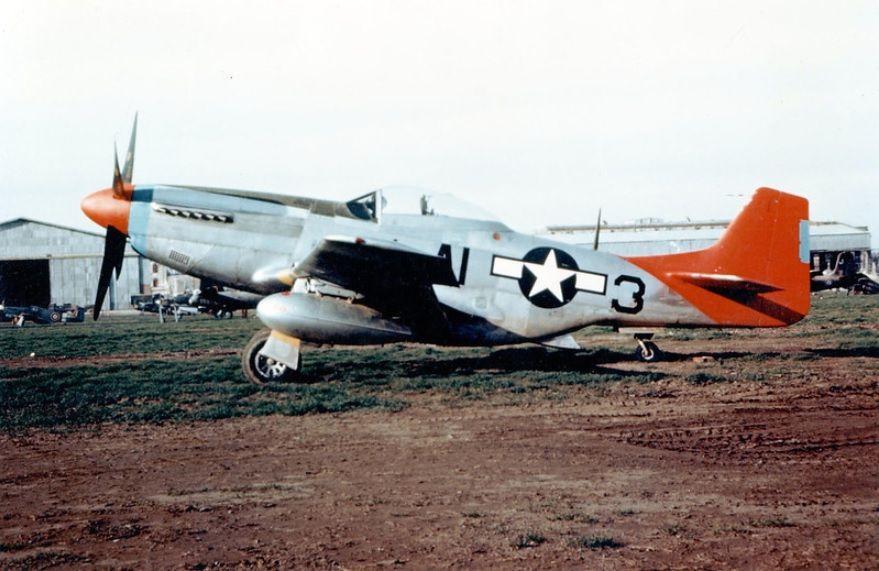
Mustang P-51D 99th FS 332th FG - "Tuskegee Airmen"
Photo : auteur inconnu - author unknown
Le 332nd Fighter Group était le fameux groupe des "Tuskegee Airmen", les aviateurs de couleur, tenant un temps à l'écart à cause de la couleur de leur peau.
The 332nd Fighter Group was the famous group of "Tuskegee Airmen", the aviators of color, kept away for a time because of the color of their skin.
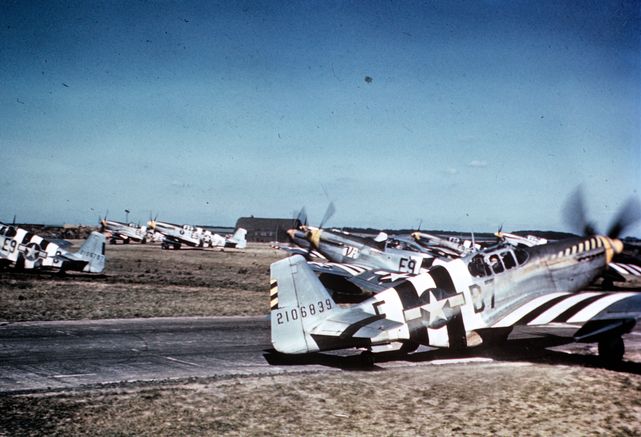
North-American Mustang , 361st Fighter Group, Bottisham, 1944-06-06
P-51B-15-NA "B7-E" (s/n 42-106839) "Bad eagle III, Lt Robert Eckfeldt, 374th FS
P-51B-10-NA "E9-S" (s/n 42-106707) "Sleepytime Gal", Lt Clarence Sullivan, 376th FS
P-51D "E9-K" "Vi", 376th FS
Photo FRE 6207 © IWM - www.americanairmuseum.com
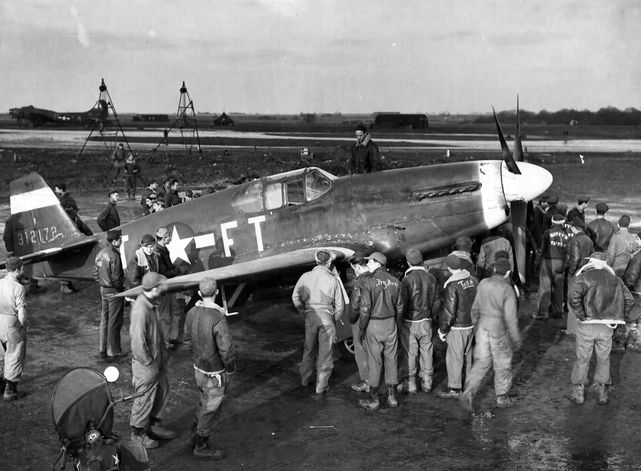
P-51B (s/n 43-12172), 1st Lt William Y. Anderson, 353rd FS, 354th FG
© USAF - Domaine public - Public domain
LE 352nd FIGHTER GROUP
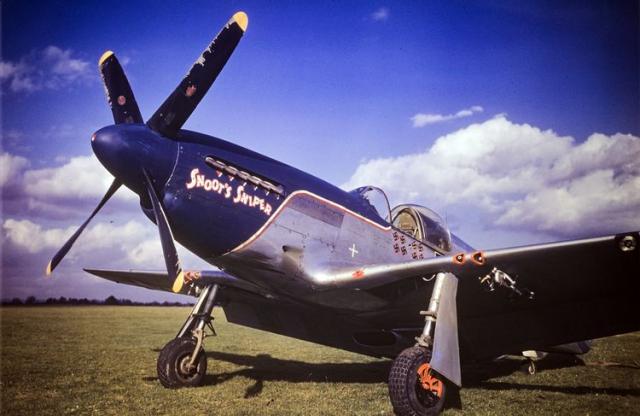
North-American Mustang P-51B-15-NA "PE-S" (s/n 42-106763) "Snoot's Sniper", 352nd FG
Mount Farm, Oxfordshire
Photo FRE 6033 © IWM - www.americanairmuseum.com
Le 352nd FG débarque à la base RAF Bodney dans le Norfolk, Angleterre, le 5 juillet 1943. Il était surnommé les "Blue-nosed Bastards of Bodney". Il fut affecté à la 8e AF. Equipé de P-47, il bascule sur les P-51 en avril 1944. Le 352nd FG fut employé à des missions d'escorte de bombardiers.
The 352nd FG arrived at RAF Bodney in Norfolk, England, on July 5, 1943. They were nicknamed the "Blue-nosed Bastards of Bodney". It was assigned to 8th AF. Equipped with P-47s, it converted to the P-51s in April 1944. The 352nd FG was used for bombers escort missions.
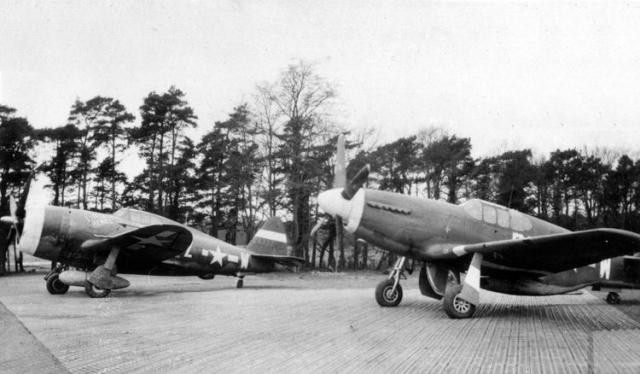
P-47 Thunderbolt (42-8377) & P-51 Mustang P-51-5-NA (43-7022), 352nd FG, mars/March 1944
Les 2 avions sont codés "PZ-W", surnommés "Little Rebel" et furent pilotés par le Captain Alton J Wallace
Both aircrafts are coded PZ-W", nicknamed "Little Rebel" and were flown by Captain Alton J Wallace
Photo FRE 2793 © IWM - www.americanairmuseum.com
Il effectua également des missions de support et d'attaque au sol lors du débarquement en Normandie et pendant l'opération Market Garden. Un détachement du 352nd FG fut affecté à la 9e AF en Belgique pendant la contre-offensive allemande dans les Ardennes pendant l'hiver 1944-1945. En février 1945, le Groupe fut transféré en Belgique et participa à l'opération aéroportée Varsity sur le Rhin en mars 1945. Le 352nd FG retourna à la base RAF Bodney en avril 1945.
It also carried out missions of support and ground attack during the Normandy landing and during the operation Market Garden. A detachment of the 352nd FG was assigned to the 9th AF in Belgium for the German counter-offensive in the Ardennes during the winter of 1944-1945. In February 1945, the Group was transferred to Belgium and took part in the Varsity airborne operation on the Rhine in March 1945. The 352nd FG returned to RAF Bodney in April 1945.
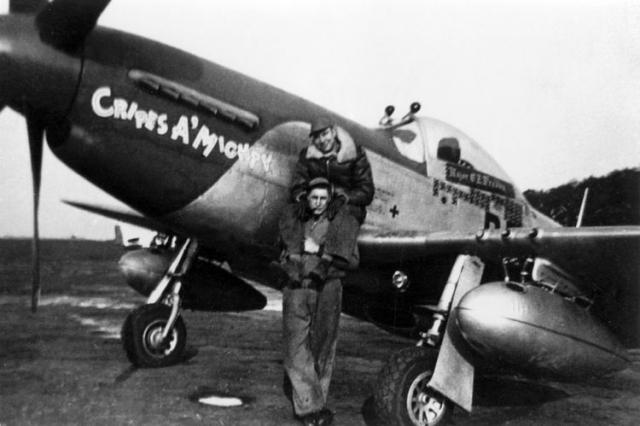
Mustang P-51D-15-NA 'PE-P' "Cripes A' Mighty" (44-14906), 328th FS, 352nd FG, mars/March 1944
L'équipage au sol devant le Mustang du Major George E. Preddy Jr.
Ground crew in front of Mustang of Major George E. Preddy Jr.
Photo FRE 337 © IWM - www.americanairmuseum.com
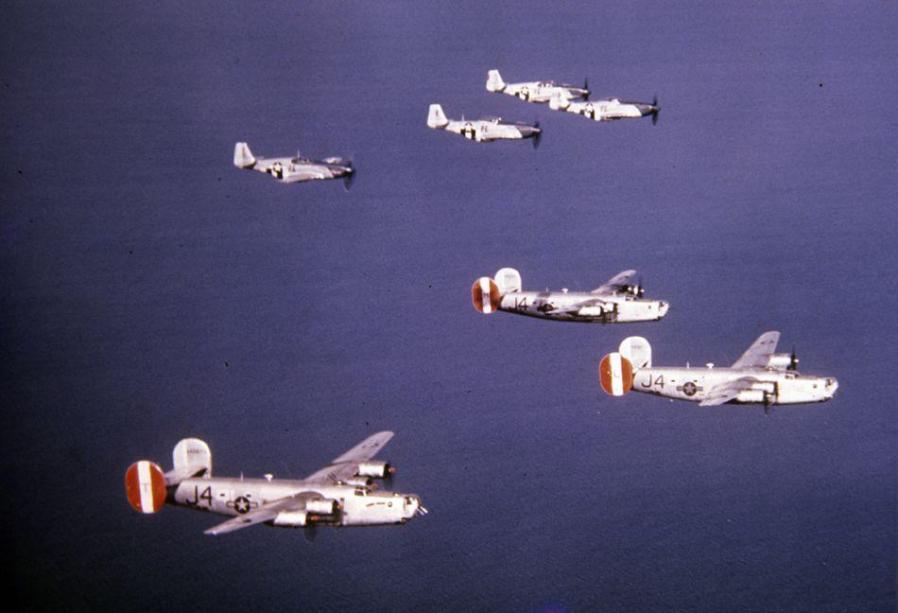
Mustang P-51D 352nd FG, Consolidated Liberator 458th BG
Photo FRE 6713 © IWM - www.americanairmuseum.com
OPERATION "DRAGOON"
Le 15 août 1944 débute l'opération "Dragoon", l'invasion du sud de la France, en Provence, par les forces alliées. Parmi les forces aériennes à participer à cette opération, le 111th Tactical Reconnaissance Squadron joua un rôle de soutien de la 7e Armée, qu'il avait rejoint en juillet 1944. Le 111th T.R.S. était équipé de vieux Mustang F-6A, F-6B et de quelques F-6C, plus récents.
On August 15th, 1944 began the operation " Dragoon ", the invasion of Southern France, in Provence, by the allied Forces. Among air forces to participate in this operation, the 111th Tactical Reconnaissance Squadron played a key role in supporting the 7th Army, which he had joined in July, 1944. The 111th T.R.S. was equipped with old Mustangs F-6A, F-6B but also newer F-6C.
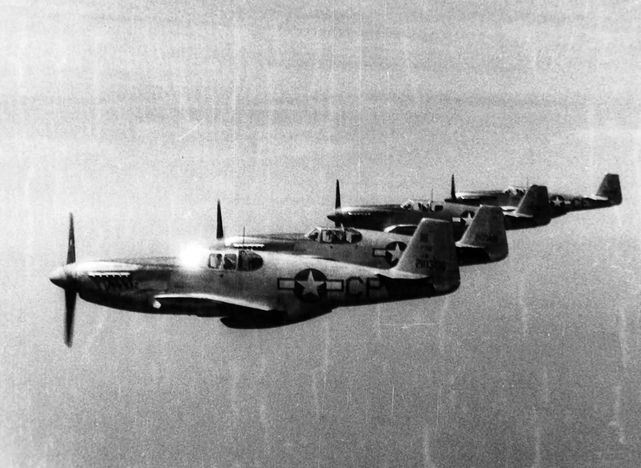
P-51 Mustang F-6, "Flight C", 111th Tactical Reconnaissance squadron
© US National Archives (domaine public - public domain)
Des Mustang P-51D du 31st Fighter Group furent également mobiliser pour assurer la protection des Douglas C-47 et C-53 de ravitaillement, mais également des B-24 chargés de bombarder des objectifs dans le Sud-est de la France.
Mustangs P-51D of the 31st Fighter Group were was missioned to protect the Douglas C-47s and C-53s in charge of provisioning, but also B-24 which had to bomb targets in the South-East of France.
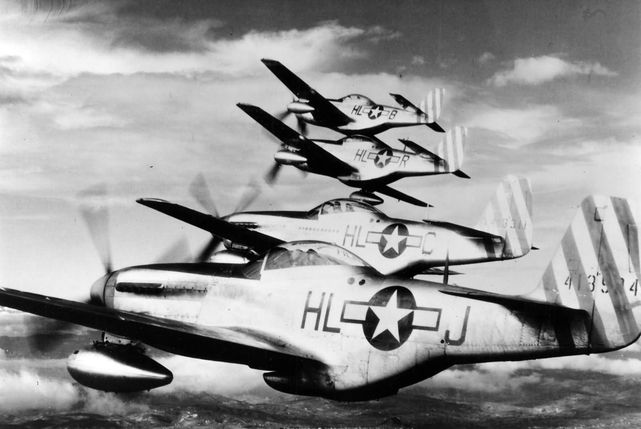
P-51D Mustang, 31st Fighter Group
© US National Archives (domaine public - public domain)
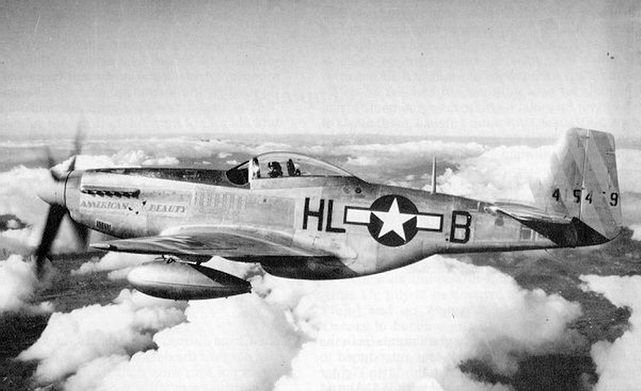
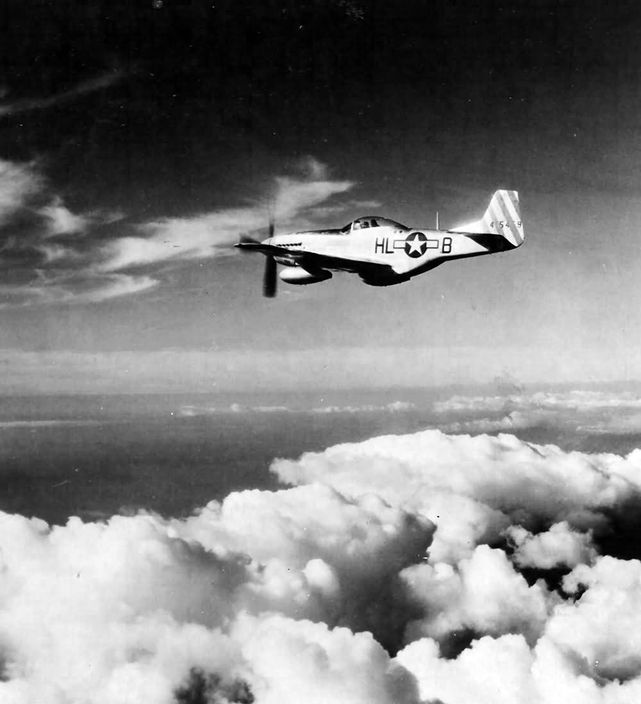
P-51D Mustang "American Beauty" (s/n 44-15459), 308th FS, 31st FG, Captain John J. Voll
© US National Archives (domaine public - public domain)
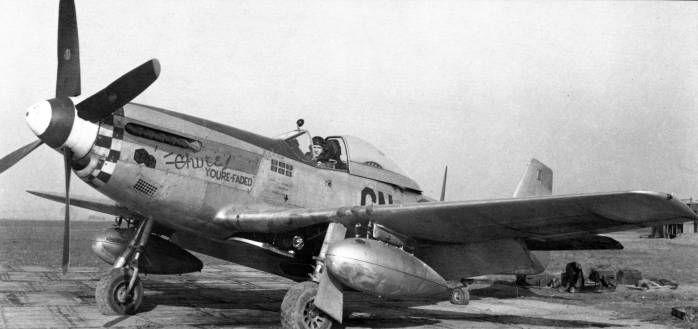
Mustang P-51D 'Chute ! You're faded', 339th FG
Photo USAF (domaine public - public domain)
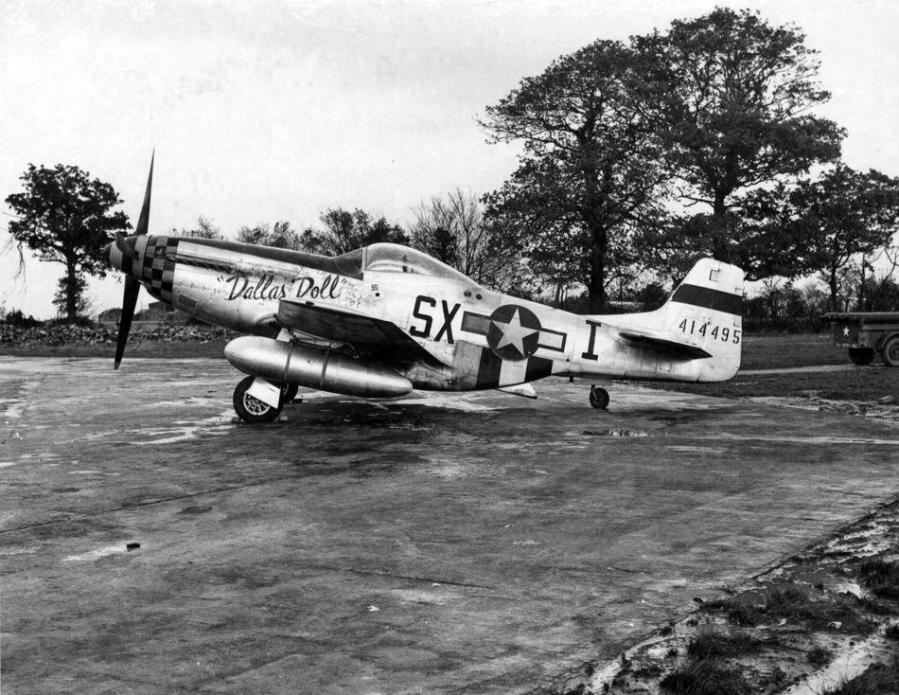
Mustang P-51D-10-NA 'Dallas Doll' 352nd FS, 353rd FG, - Frank H Bouldin, Jr - Angleterre, Décembre 1944 - England, December 1944
Photo UPL 26391 © IWM - www.americanairmuseum.com
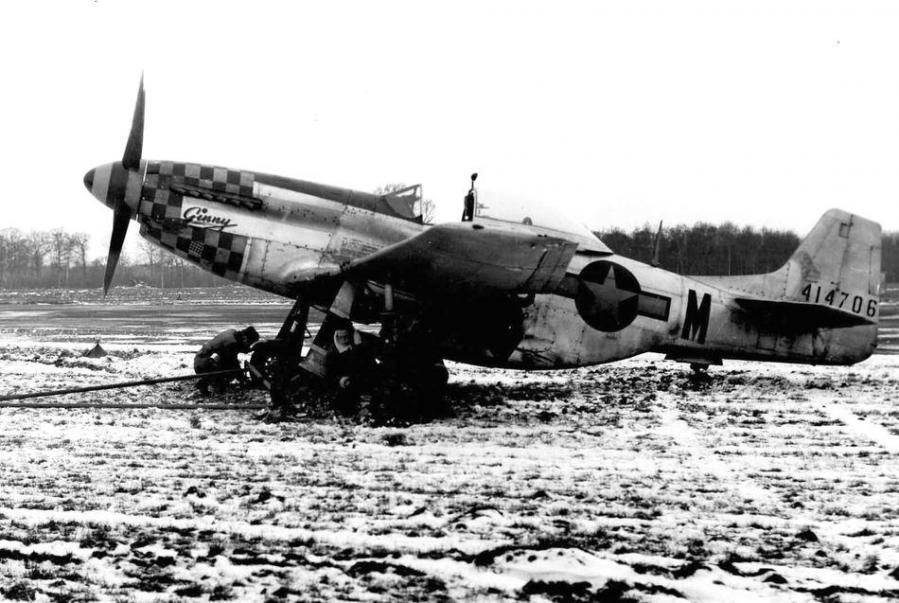
Mustang P-51D-10-NA (s/n 44-14706) 'Ginny' 351st FS, 353rd FG - Group Lt. Frye - Angleterre - England
Photo UPL 5589 © IWM - www.americanairmuseum.com
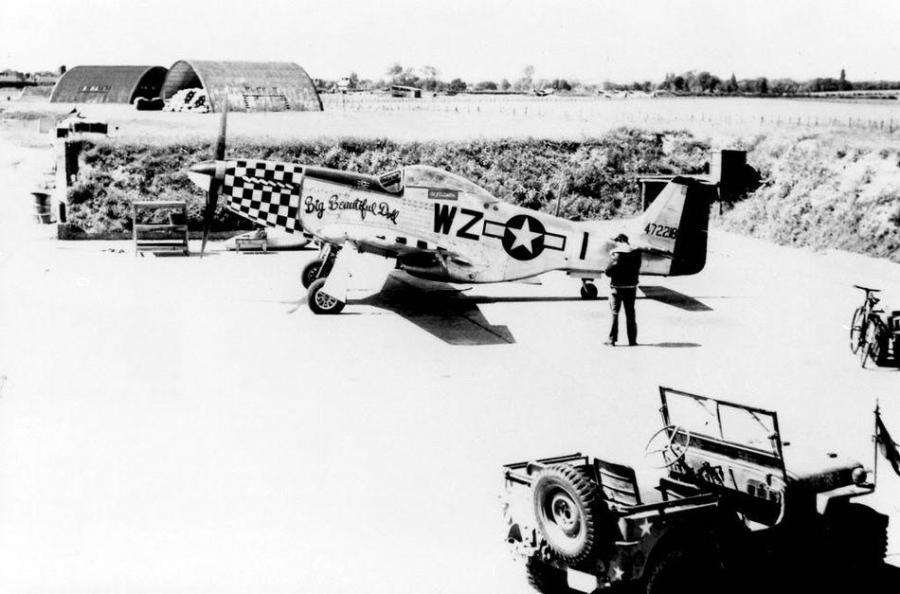
Mustang P-51D-20-NA (s/n 44-72218) 'Big Beautiful Doll' 84th FS, 78th FG - Col. John D. Landers (CO. 78th FG) - Duxford 1945
Photo USAF (domaine public - public domain)
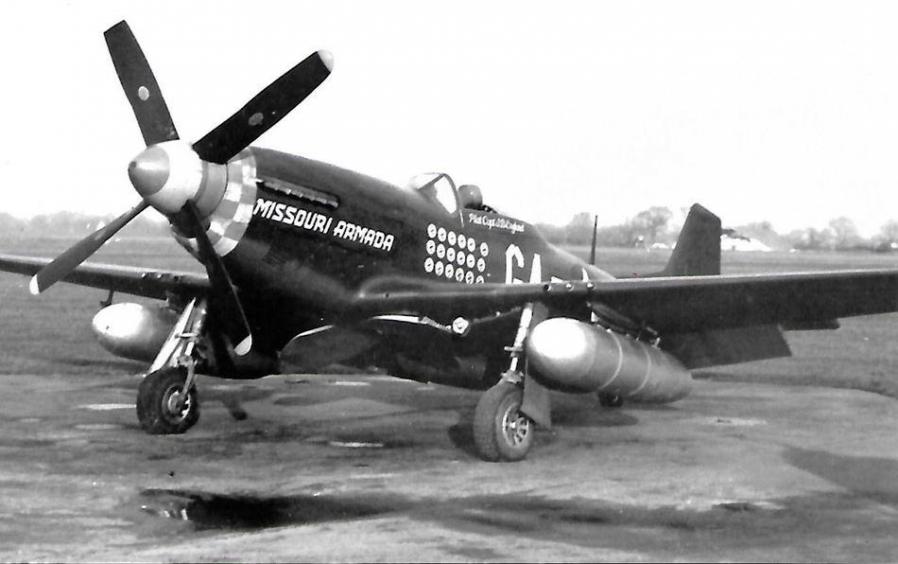
Mustang P-51D-10-NA (s/n 44-14789) 'Missouri Armada' 366th FS, 357th FG - Capt. John England
Photo UPL 22227 © IWM - www.americanairmuseum.com
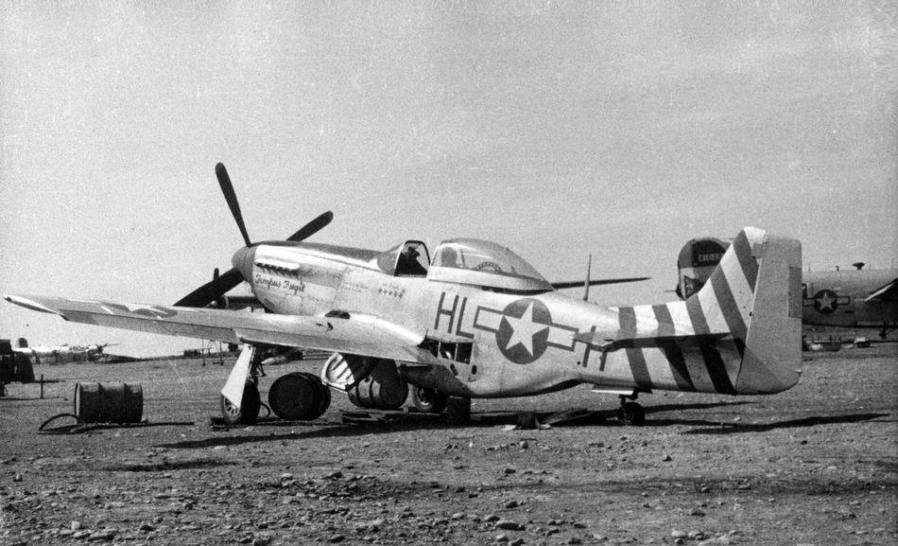
Mustang P-51D 'Tempus Fugit' - 31st FG, 15th AF - Col. William Daniel (5 vict.)
Photo FRE 8681 © IWM - www.americanairmuseum.com
EN ASIE - IN ASIA
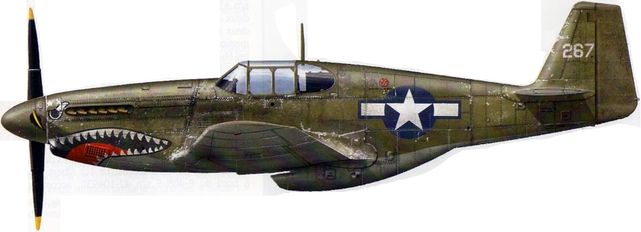
P-51B "267", 26th FS, 51st FG, Kunming 1944
Piloté par le Col. David "Tex" Hill dans un documentaire de l'USAAF
Flown by Col. David "Tex" Hill in a documentary of USAAF
© Dekker Art Work (Thierry Dekker) http://dekkerartwork.over-blog.com
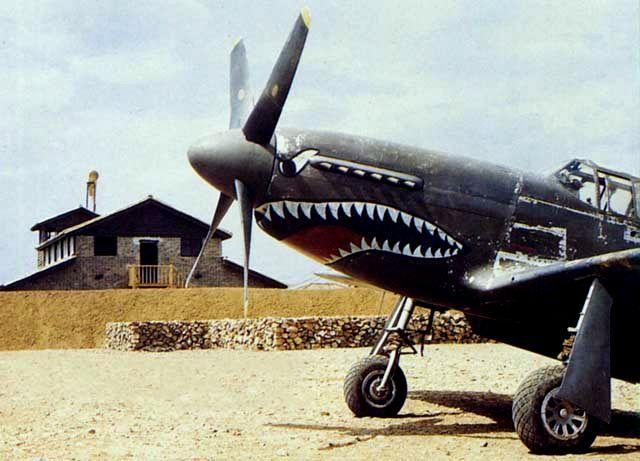
P-51B, 51st FG, Chine/China 1944
Photo USAF (domaine public - public domain)
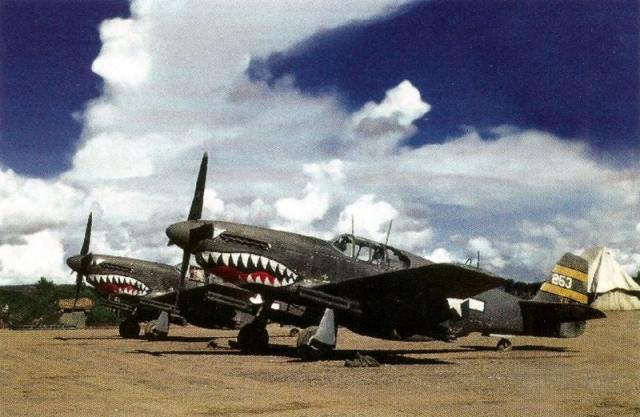
Mustang P-51C (B ?), 26th (16th ?) Fighter Squadron, 51st FG
Début 1945 - Early 1945
© US NARA (domaine public - public domain)
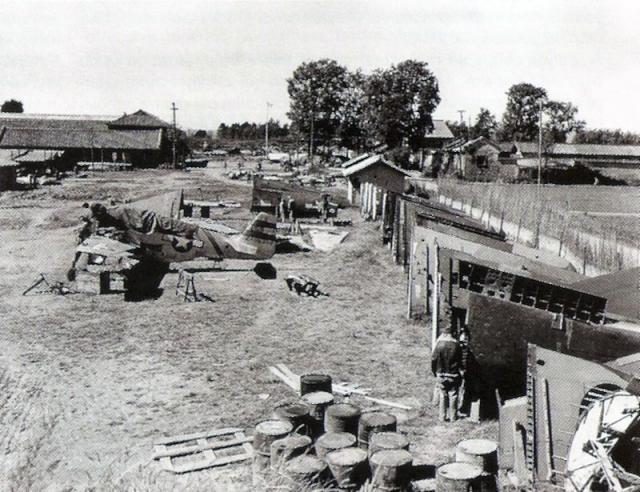
Mustang P-51B-15-NA (42-106958), 26th Fighter Squadron, 51st FG
Kunming, Chine - Kunming, China
© US NARA (domaine public - public domain)
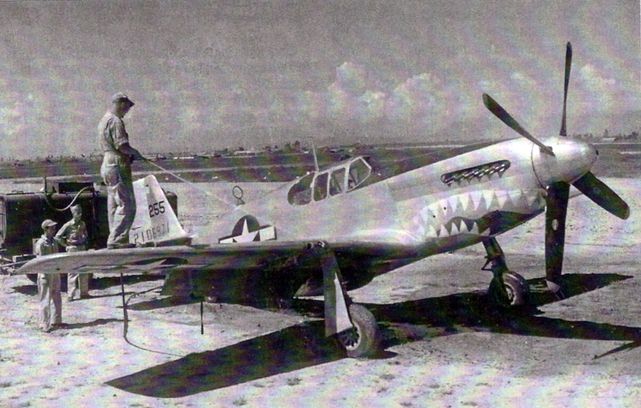
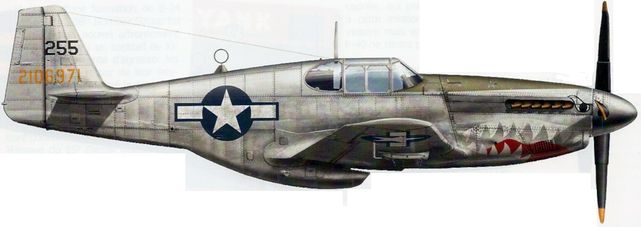
P-51B "255" s/n 42-106971, 26th FS, 51st FG
Chine, été-automne 1944 - China, Summer-Autumn 1944
Photo © USAF (domaine public - public domain)
Artwork © Dekker Art Work (Thierry Dekker) http://dekkerartwork.over-blog.com
La 14e Air Force, présente dans la zone Chine-Birmanie-Indes, fut également équipée de quelques P-51B, notamment les 51e et 23e FG. Le 23e FG était l'héritier des fameux Tigres Volants de 1941. De même, le 31e FBG (10e Air Force), basé aux Indes, fut équipé de P-51B qui complétèrent la flotte de A-36 et P-51A existants. Ce groupe s'installa en Birmanie en juillet 1944 puis en Chine en août aux côtés de la 14e Air Force.
The 14th Air Force, based in the China-Burma-Indies area, was also equipped with some P-51Bs, in particular the 51st and 23rd FG. The 23rd FG was the heir of the famous Flying Tigers of 1941. The 31st FBG (10th Air Force), based in the Indies, was also equipped with P-51B in addition to the existing fleet of A-36 and P-51A. This group was based in Burma in July 1944 and then in China in August with the 14th Air Force.
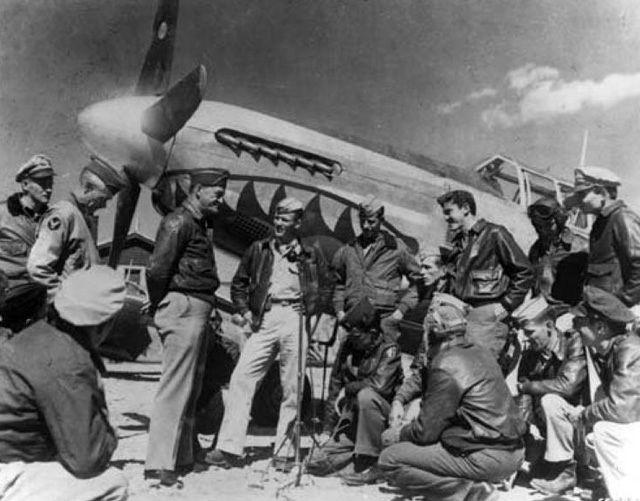
Le général Claire Chennault discute avec les pilotes du 26th FS, 23rd FG, le 3 novembre 1944
General Claire Chennault talking with pilots of 26th FS, 23rd FG, on 3rd November, 1944
© USAF (domaine public - public domain)
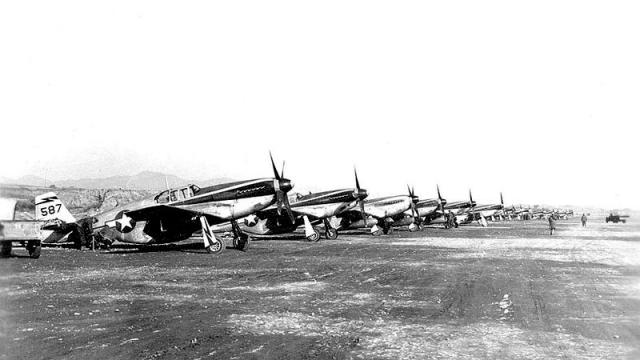
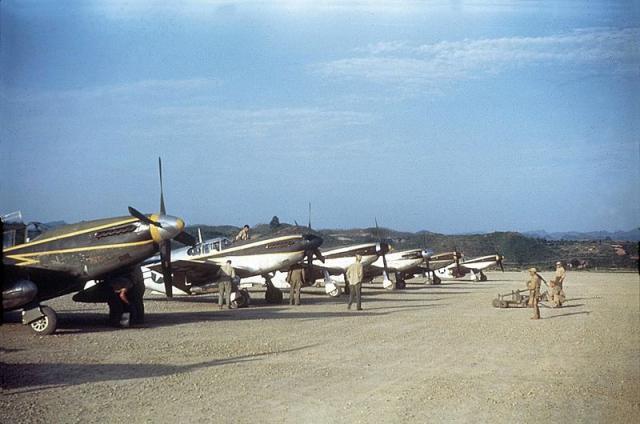
Mustang P-51B, 118th Tactical Reconnassance Squadron, 23rd FG
Début 1945 - Early 1945
© US NARA (domaine public - public domain)
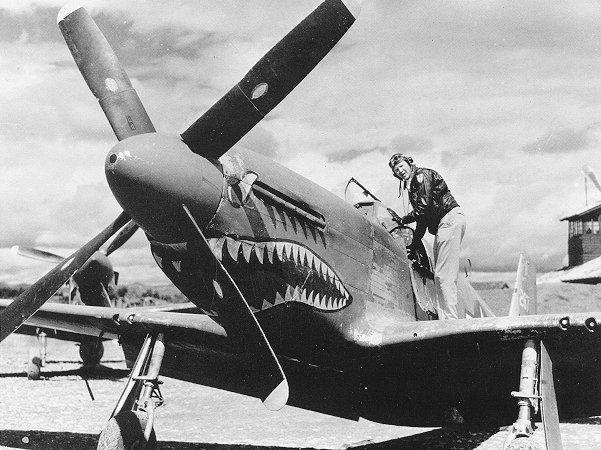
P-51B, Major David L. "Tex" Hill, 23rd FG
Fin 1944 - Late, 1944
© US NARA (domaine public - public domain)
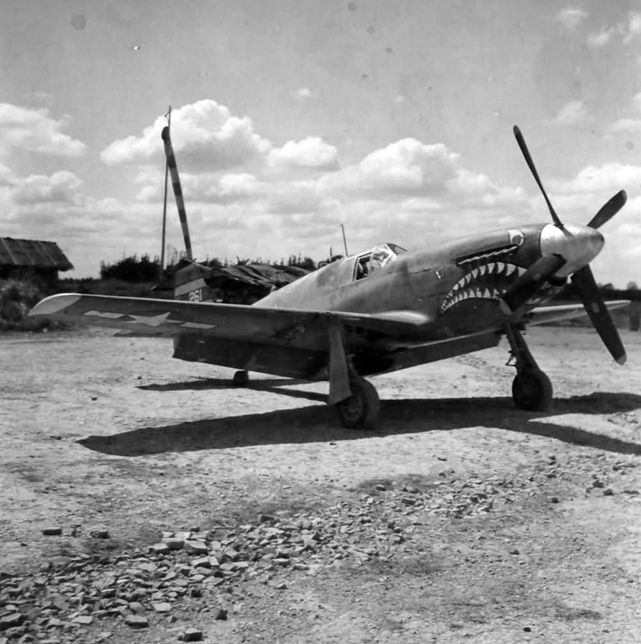
P-51B "261", 26th FS, 51st FG
Nanning, 20 octobre 1944 - Nanning, 20th October, 1944
© USAF (domaine public - public domain)
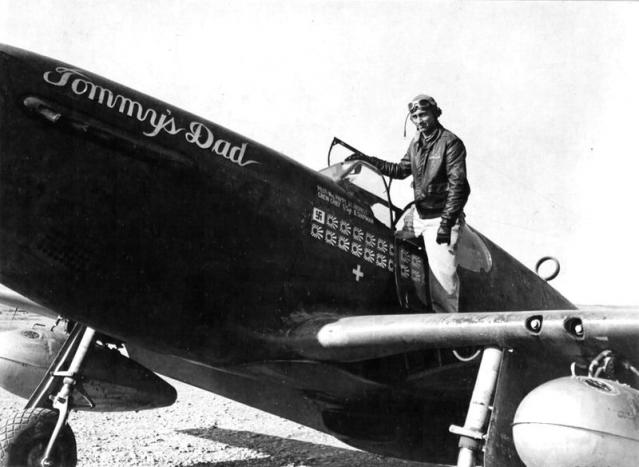
P-51B-5-NA "Tommy's Dad" (43-7060), 74th FS, 23rd FG, Major John C. Herbsty "Pappy"
Tommy était le prénom du fils de Herbst - Tommy was Herbst's son first name
© US NARA (domaine public - public domain)
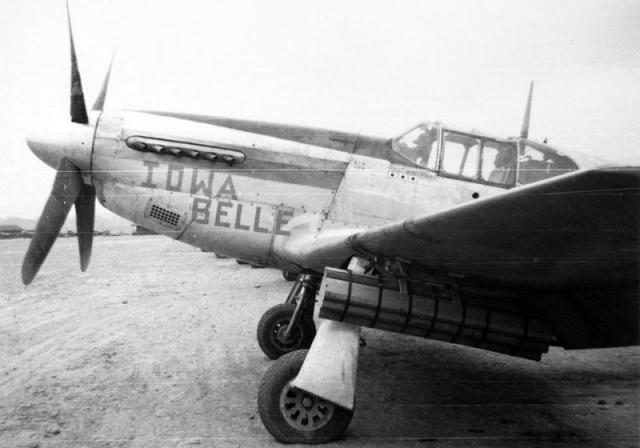
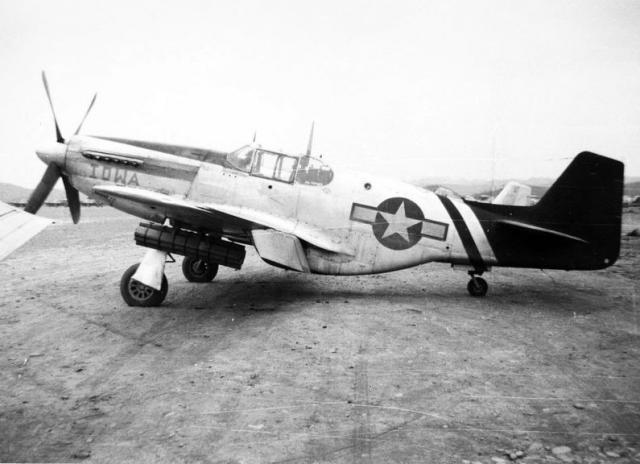
P-51B "Iowa Belle", 75th FS, 23rd FG, 1st Lieutenant Curtiss W. Mahannah
© US NARA (domaine public - public domain)
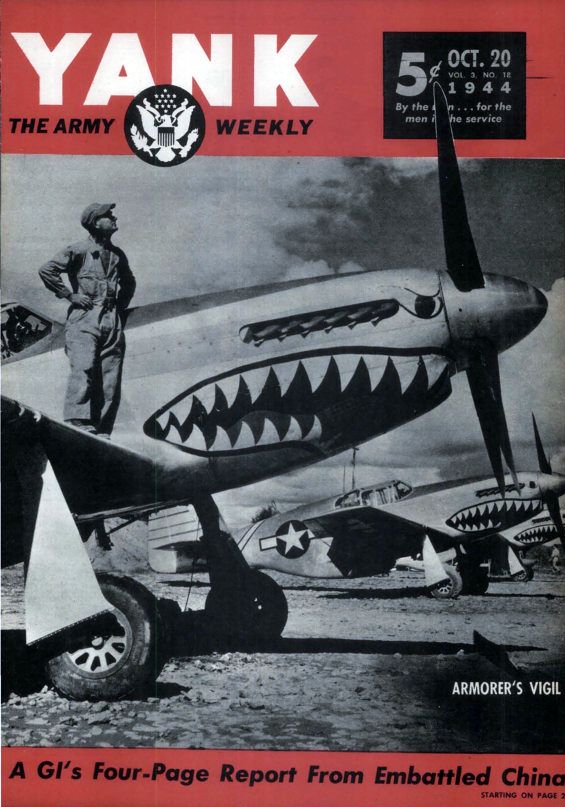
YANK magazine
Consacré aux "China Blitzers" du 26th FS, 51st FG - 20 octobre 1944
Special issue dedicated to "China Blitzers" of 26th FS, 51st FG - 20th October, 1944
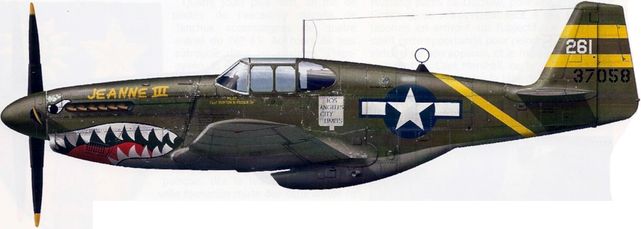
P-51B-7 "261" s/n 43-7058, 26th FS, 51st FG
Chine, début septembre 1944. Le Capt. Burton Rodier se tuera sur cet avion le 5 septembre
China, early September 1944. Capt. Burton Rodier was killed with this aircraft on 5th September
© Dekker Art Work (Thierry Dekker) http://dekkerartwork.over-blog.com
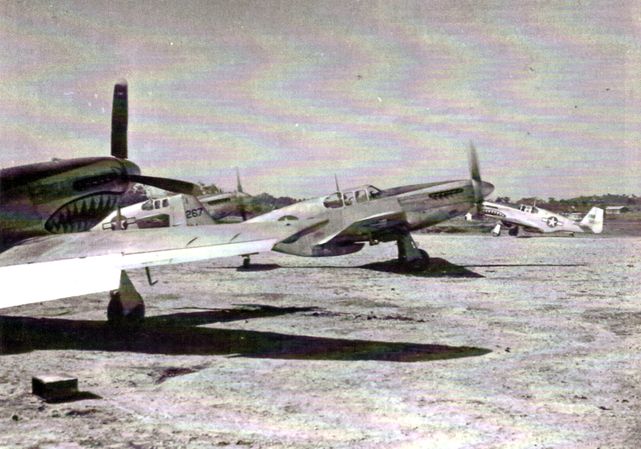
P-51B, 16th & 26th FS, 51st FG
Nanning, 16 novembre 1944 - Nanning, 16th November, 1944
© USAF (domaine public - public domain)
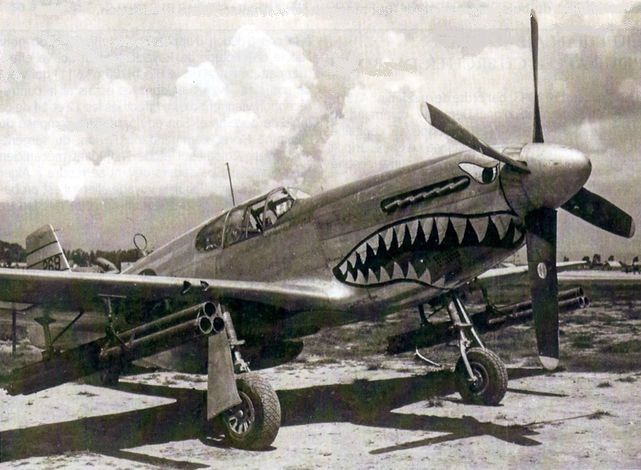
P-51B "269", 26th FS, 51st FG
Equipé de lance-roquettes M10, Kunming, juillet 1944
Fitted with M10 rocket-launchers, Kunming, July 1944
© USAF (domaine public - public domain)
Le 311th FG, qui passa de la 10th à la 14th Air Force en août 1944, fut équipé de P-51C.
The 311th FG, which switched from 10th to 14th Air Force, was equipped with P-51C.
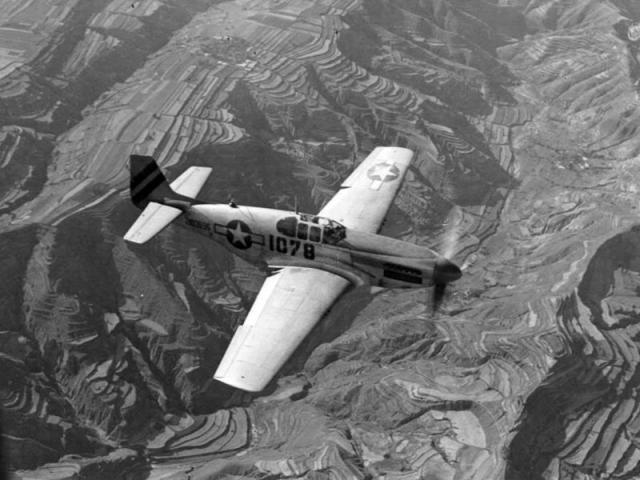
P-51C-10-NT (42-103896) "Princess", 530th FS, 311th FG
24 juillet 1945 - 24 July, 1945
© USAF (domaine public - public domain) - NARA 342-FH-3A01040-A83918AC
Rattaché à la 14th Air Force, la 1st Chinese American Composite Wing reçut 50 Mustang P-51C-11-NT (44-11043 à 44-11092).
Affected to the 14th Air Force, the 1st Chinese American Composite Wing receivedh 50 Mustang P-51C-11-NT (44-11043 to 44-11092).
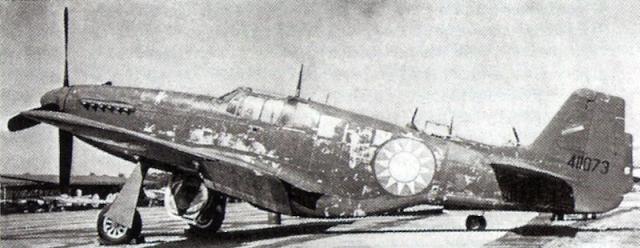
P-51C-11-NT (44-11073) 1st Chinese American Composite Wing
© US NARA (domaine public - public domain)

P-51C-11-NT (44-11073) 1st Chinese American Composite Wing, 3rd FG (provisional)
Ankang, Chine, printemps 1945 - Ankang, China, Spring 1945
© Jean-Marie Guillou
Les Mustang III dans la RAF
Mustang III in the RAF
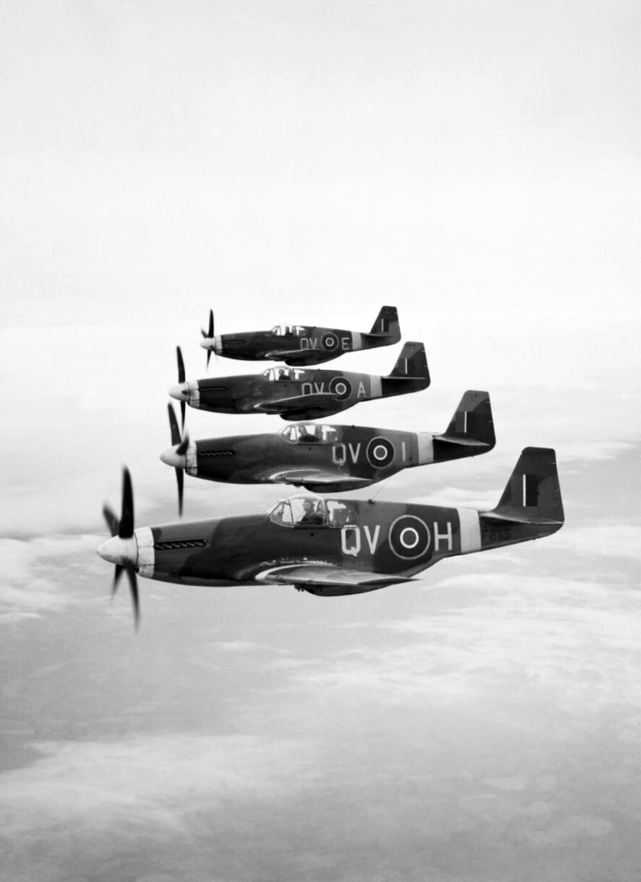
Mustang III - 19 Sqn, Ford (Sussex)
21 avril 1944 - 21st April, 1944
© IWM (CH 12876) - www.iwm.org.uk
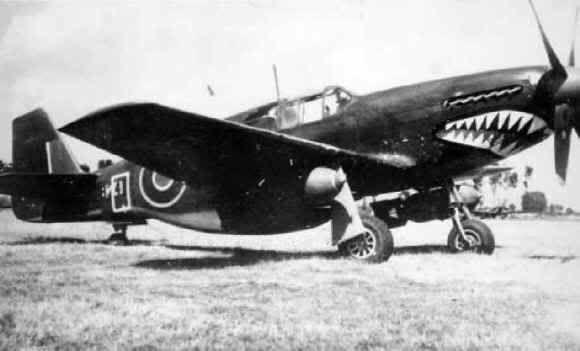
Mustang III - 112 'Sharkmouth' Sqn, Tantarella, Italie/Italy
© USAF (domaine public - public domain)
Les Squadrons 19, 65 et 122 du 122e Wing furent équipés début 1944. Les premières missions furent des escortes de routine sur la France et l'Allemagne jusqu'au premier combat le 22 avril 1944 : ce jour là, des Mustang du Squadron 19, en escorte au dessus de Nancy, furent attaqués par 14 Messerschmitt Bf 109 G. Un Mustang et trois Me 109 furent abattus. Le lendemain, quatre Mustang du Sqn 122 abattirent six Heinkel He 111 sur huit dans le région de Dôle (Jura).
The Squadrons 19, 65 and 122 of the 122nd Wing were equipped in early 1944. The first missions were basic escort missions over France and Germany until the first fights on April 22nd, 1944 : this day, Mustangs of Squadron 19, in an escort mission over Nancy, were attacked by 14 Messerschmitt Bf 109 G. One Mustang and three Me 109 were shot down. The following day, four Mustang of Sqn 122 shot down six Heinkel He 111 out of eight in the area of Dôle (Jura, France).
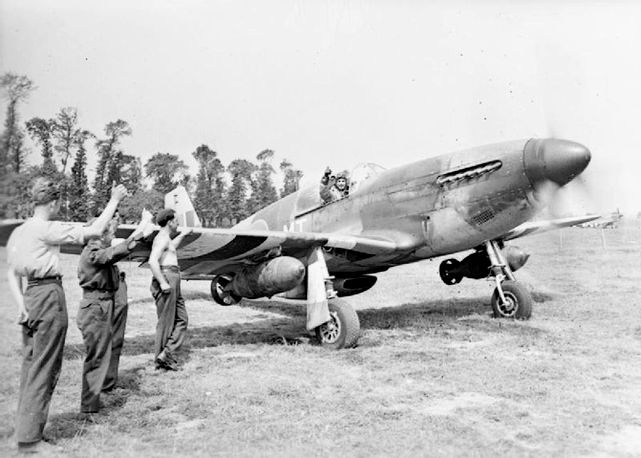
Mustang III - 122 Sqn, Warrant Officer C R Castleton, B12/Ellon, Normandy
Equipé de deux bombes de 1000 lb - Fitted with two 1000-lb bombs
© IWM
En tout 28 Squadrons britanniques furent équipés de Mustang III dont quatre formés de Polonais, trois de Canadiens et un de français (en Afrique du Nord). Rapide, le Mustang fut beaucoup utilisé pour l'interception de V-1 allemands : sur 8000 V-1 lancés, 1 847 furent abattus par la chasse dont 86 par le Sqn 129 (le meilleur score).
In total 28 British Squadrons were equipped with Mustang III including four with Polish pilots, three with Canadians and one with French (in North Africa). Fast, the Mustang was often used for the interception of German V-1s : out of 8000 V-1 launched, 1,847 were shot down by hunters including 86 by Sqn 129 (the best score).

Mustang III - 19 Sqn, Ford Air Base, RAF, Flg.Off.F.Cooper - Eté 1944 - Summer 1944
artiste inconnu - artist unknown - source :http://wp.scn.ru
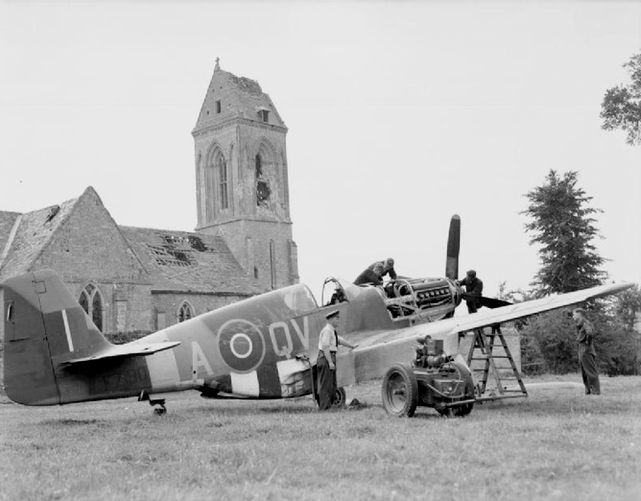
Mustang III - 19 Sqn
Photo : auteur inconnu - author unknown
En Méditerranée, les "Kittyhawk" du 239e Wing furent remplacés par des Mustang III au printemps 1944. Les missions étaient des missions de soutien de la 8e Armée en italie. Vers la fin de la guerre, ils opérèrent dans les Balkans jusqu'en Yougoslavie.
In the Mediterranean area, the "Kittyhawks" of the 239th Wing were replaced by Mustang III in the Spring 1944. The missions were support missions of the 8th Army in Italy. At the end of the war, they operated in Balkans up to Yugoslavia.
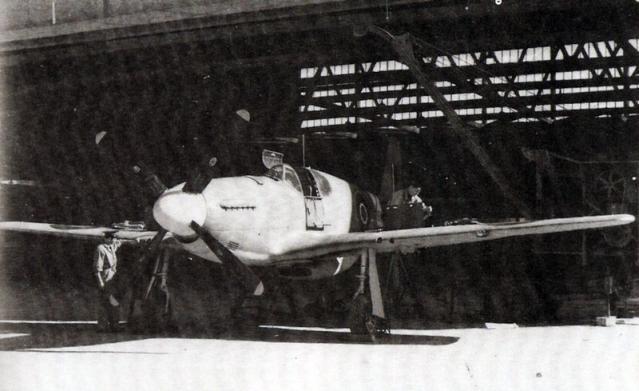
Mustang III - Blida (Afrique du Nord - Northern Africa)
Maintenance effectuée par des mécanos des Forces Aériennes Françaises Libres.
Maintenance operated by mechanics of the Free French Air Force
Photo : auteur inconnu - author unknown
Le 22 juin 1944, Tadeus Tamowicz, pilote Polonais du Sqn 315, fut touché et se posa derrière les lignes ennemies. Son chef, l'as Eugeniusz Horbaczewski se posa pour le récupérer. Ils laissèrent leurs parachutes pour entrer dans le cockpit. Ce fut le premier sauvetage de ce type qui incita d'autres pilotes à faire de même plus tard.
On June 22nd, 1944, Tadeus Tamowicz, Polish pilot of Sqn 315, was touched and was obliged to land behind the ennemy lines. His chief, the ace Eugeniusz Horbaczewski landed to rescue him. They left their parachutes to enter both into the cockpit. It was the first rescue of this type which encouraged others pilot to do later the same.

Mustang III - 315 Sqn, Eugeniusz Horbaczewski
© Gaëtan Marie - source : Gaëtan Marie's Aviation Profiles http://www.gaetanmarie.com
Les P-51 D/K et Mustang IV au combat
P-51 D/K and Mustang IV at war
Les unités équipées de P-51D - Units equipped with P-51D
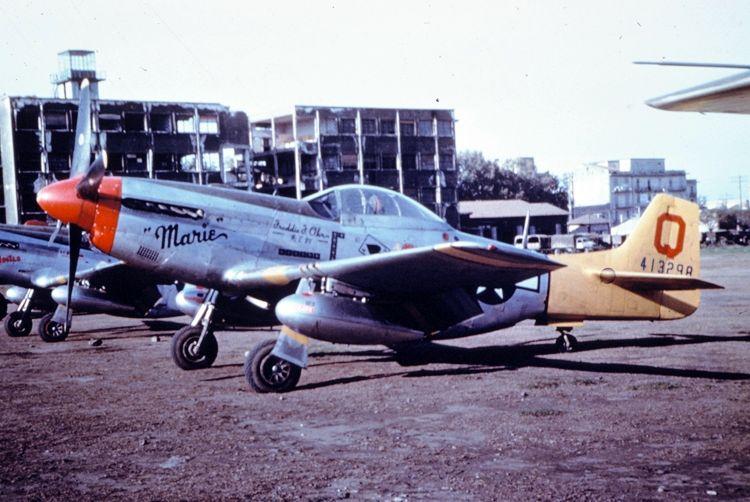
Mustang P-51D-5 'QP+Q' - (s/n 44-13298) - 2nd FS, 52nd FG, Major Freddie Ohr, Italie/Italy 1945
Photo - UPL 28479 © IWM - www.americanairmuseum.com
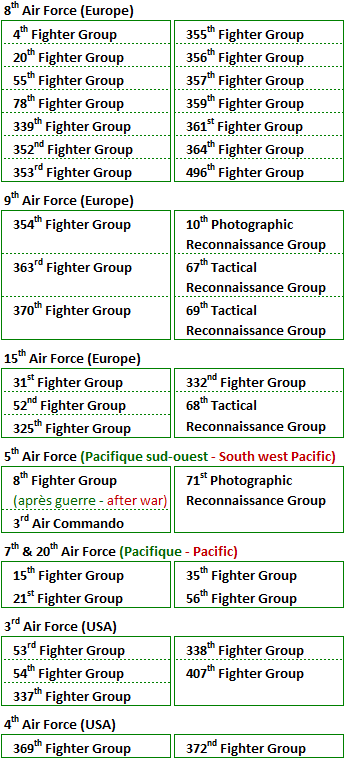
EN EUROPE - IN EUROPE
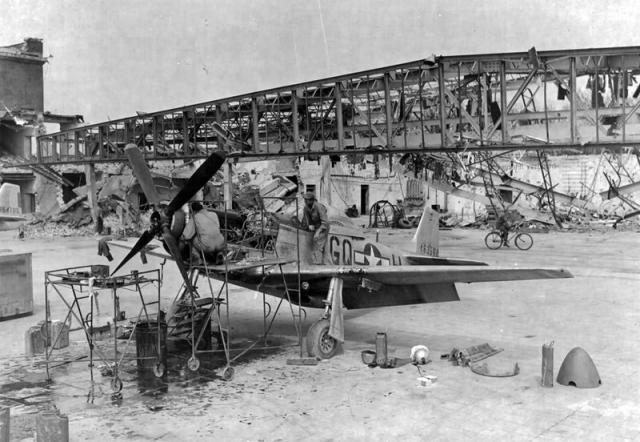
P-51D-20-NA 44-63562 "GQ-H", 355th FS, 354th FG
17 avril 1945, Olm (code Y-64), Allemagne - 17th, April 1945, Olm (code Y-64), Germany
© USAF (domaine public - public domain)
Les P-51 D furent dans la plupart des cas livrés dans les unités pour compléter ou remplacer les P-51 B. Dès l'été 1944, ils se retrouvent dans des missions d'escorte de bombardiers sur l'Allemagne ou en appui des troupes sur le sol de France.
The P-51 Ds were mostly delivered in the units to supplement or to replace P-51 Bs. During summer 1944, they were used in escort missions of bombers over Germany or in support of troops engaged in France.
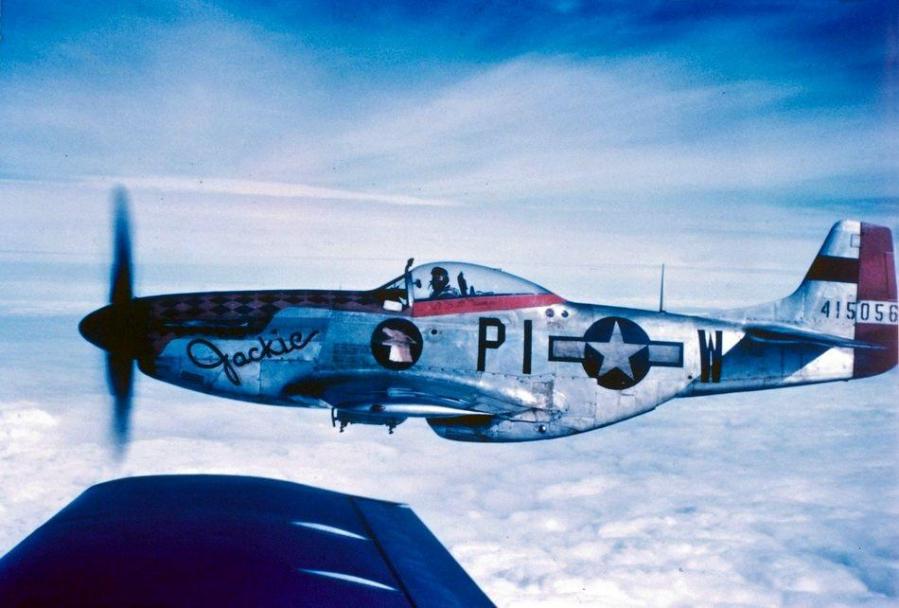
P-51D-15-NA 44-15056 "PI-W", 360th FS, 356th FG, Captain Jack W. "Wild Bill" Crump
avril 1945, Allemagne - April 1945, Germany
© USAF (domaine public - public domain) - Photo Herbert Rutland
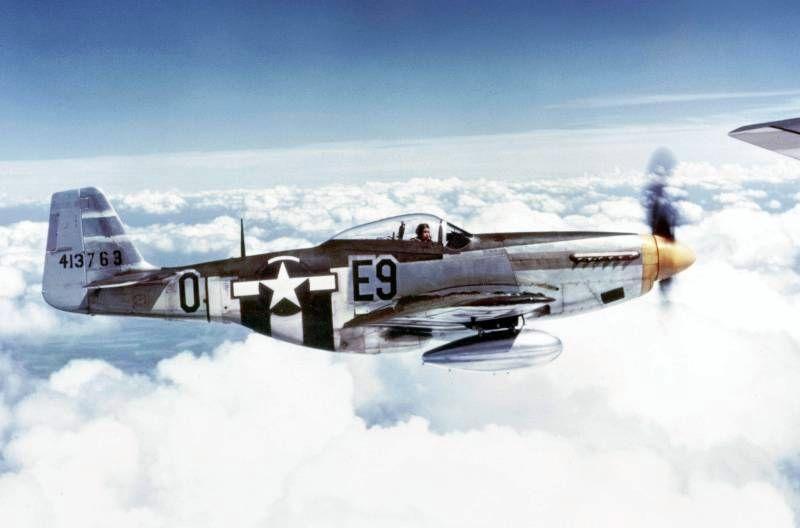
P-51D-5-NA 44-13763, 376th FS, 361st FG, Captain Sam C. Wilkerson
Little Walden Airfield, Angleterre/England, 1944
© USAF (domaine public - public domain) - National Archives via the United States Air Force Historical Research Agency, Maxwell AFB Alabama.
La 8e Air Force fut totalement équipée de P-51 tandis que la 9e AF l'était de P-51 mais également de P-47 et P-38. Les Mustang IV du Fighter Command furent affectés aux mêmes missions que les Mustang III, notamment à la destruction des V-1.
The 8th Air Force was completely equipped with P-51s while the 9th AF was equipped with P-51s but also P-47s and P-38s. The Mustangs IV of Fighter Command were assigned to the same missions as Mustangs III, particularly the destruction of V-1.
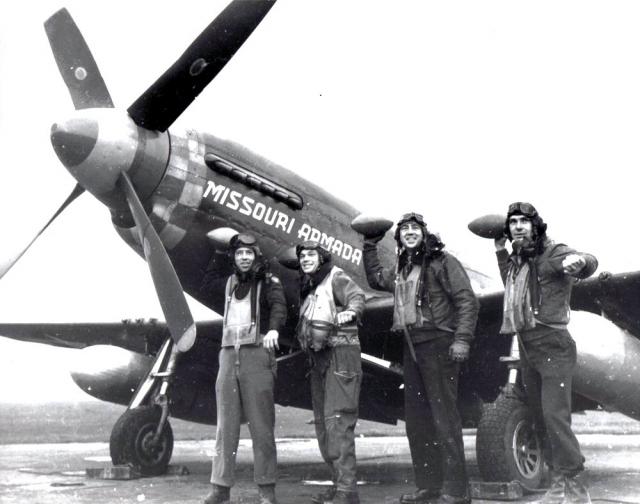
P-51D-10-NA 44-14789" "Missouri Armada" 362nd FS 357th FG, Angleterre/England, 1944
de gauche à droite / from left to right : Jenkins, England (?), Murphy, Carson
© USAF (domaine public - public domain)
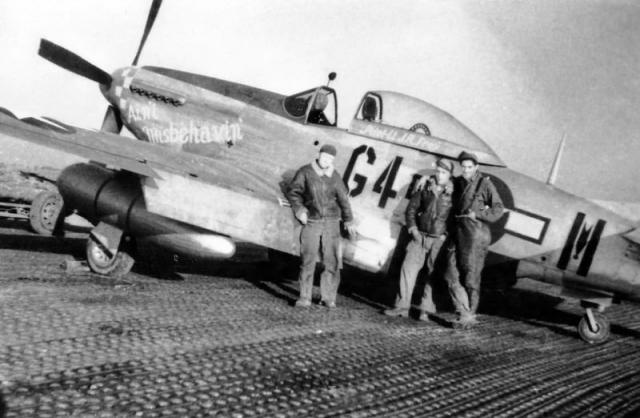
P-51D 362nd FS 357th FG
© USAF (domaine public - public domain)
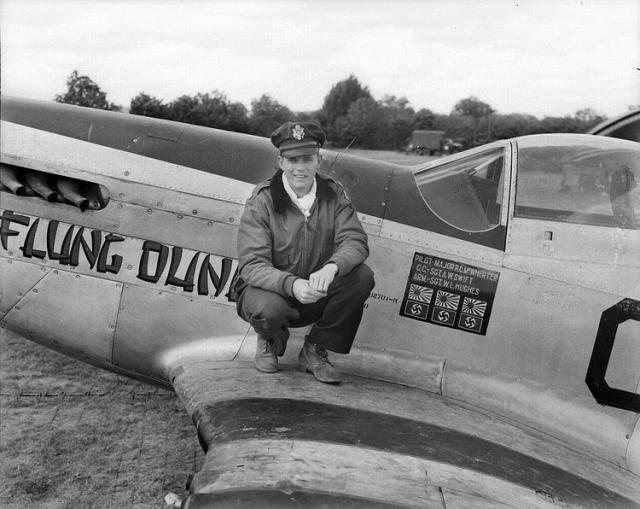
© USAF (domaine public - public domain)

© Jean-Marie Guillou
P-51D-5-NA (44-13380) 382nd FS 363th FG, Major McWerther
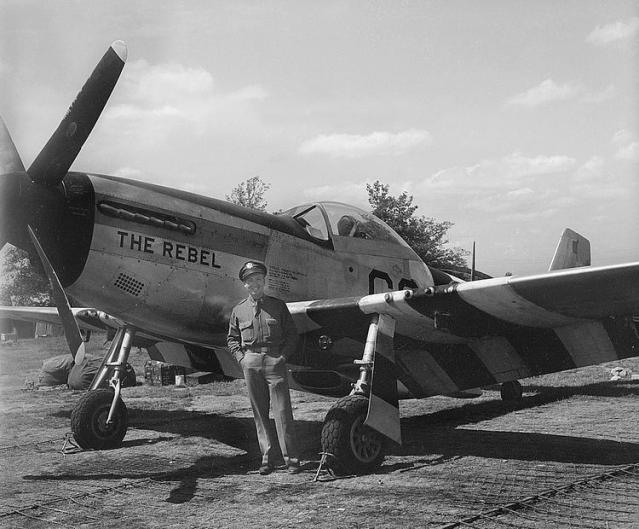
P-51D 'The Rebel' #44-13304, 382nd FS 363th FG
Le Lt. Kiernan, Ordnance Officer du 382nd FS pose devant l'avion
Lt. Kiernan, Ordnance Officer of 382nd FS in front of the aircraft
© USAF (domaine public - public domain)
LA DERNIERE MISSION DU "FOOL'S PARADISE IV" - THE LAST MISSION OF FOOL'S "PARADISE IV"
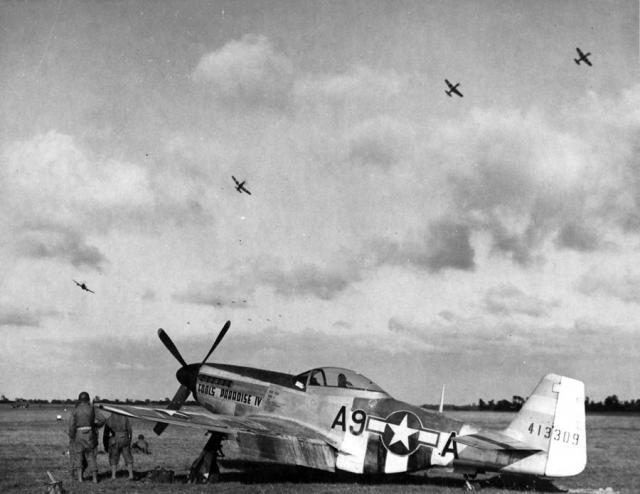
P-51D-5-NA "Fool's Paradise IV", 380th FS, 363rd FG
Juillet 1944 - July 1944, Cherbourg-Maupertus (France)
© USAF (domaine public - public domain)
Le "Fool's Paradise IV" était le 4e avion piloté par Evan McCall, pilote américain breveté en 1941 à 23 ans. Le "Fool's Paradise" et "Fool's Paradise II" furent des Bell P-39 que McCall pilota aux Etats-Unis. Affecté en Grande-Bretagne, il pilota d'abord un P-51B, "Fool's Paradise III", puis le P-51D "Fool's Paradise IV". Le 9 août 1944, un escadrille de Mustang est appelé en support pour attaquer une colonne allemande à proximité de Morlaix, en Bretagne.
The "Fool's Paradise IV " was the 4th aircraftflown by Evan McCall, an American pilot, licensed in 1941 at 23. The "Fool's Paradise " and "Fool's Paradise II" were the names of Bell P-39s that McCall flown in the United States. Later affected in Great Britain, he flown at first a P-51B, "Fool's Paradise III ", then the P-51D "Fool's Paradise IV ". On August 9th, 1944, a squadron of Mustang was called to support and attack a German column near Morlaix, in Brittany (France).

Mustang P-51D-5-NA "Fool's Paradise IV" - 380th FS, 363rd FG, Louis Morrison
© Vincent Dhorne
Ce jour là, c'est Louis Morrison qui pilote l'avion de McCall. Alors qu'il mitraille les allemands, son Mustang est touché par la flak et perd son liquide de refroidissement. Morrison sait alors qu'il ne pourra pas rentrer ; il cabre l'avion pour monter le plus haut possible et saute en parachute. "Fool's Paradise IV", livré à lui même, s'écrase dans un champ. Morrison, aidé par des paysans bretons, rejoint les troupes américaines.
This day there, Louis Morrison flown McCall's aircraft. While he was machine-gunning the Germans, his Mustang was hit by the flak and lost cooling liquid. Morrison knew he could not fly back home ; he rotated the aircraft to climb as high as possible and parachuted. The "Fool's Paradise IV", left on its own, crashed in a field. Morrison, helped by Breton farmers, joined the American troops.
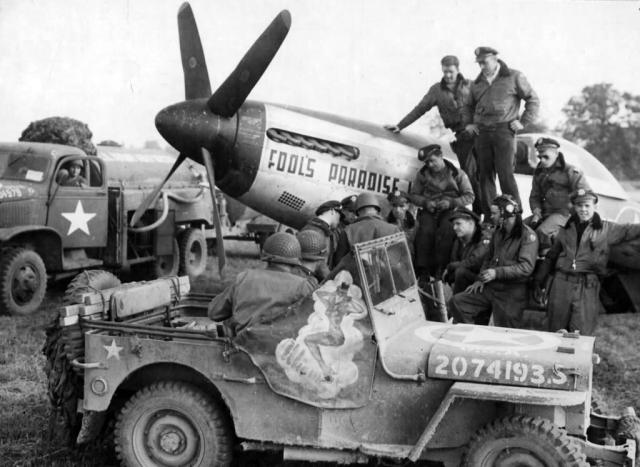
P-51D-5-NA "Fool's Paradise IV", 380th FS, 363rd FG
© USAF (domaine public - public domain)
En 2011, une équipe de l'A.B.S.A. 39-45, association de recherche des avions tombés pendant la seconde guerre mondiale en Bretagne et Loire Atlantique, retrouva de nombreuses pièces du "Fool's Paradise IV" dans le champ où celui-ci était tombé, dans le Finistère.
In 2011, a team of the A.B.S.A. 39-45, an association which researches aircrafts fallen during the Second World War in Brittany and Loire-Atlantique, discovered numerous parts the "Fool's Paradise IV " in the field where this one had fallen, in Finistère (Brittany, France).
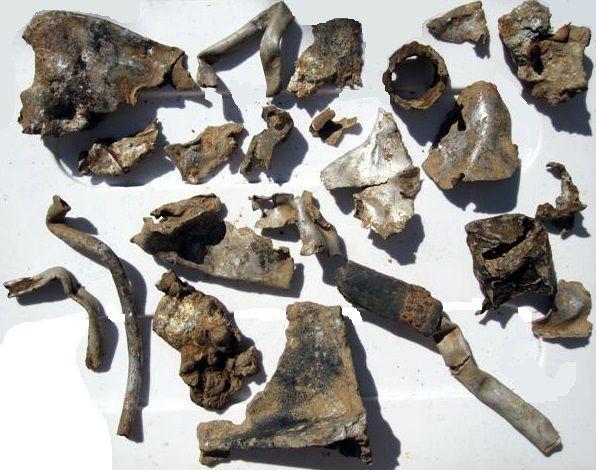
Pièces du/parts of "Fool's Paradise IV"
© A.B.S.A. www.ABSA3945.com
Les missions d'escorte étant particulièrement longues, une tactique particulière fut adoptée : un premier groupe de Mustang effectuait l'escorte à l'aller et un deuxième groupe venait à leur rencontre pour effectuer l'escorte retour. Le premier groupe rentrait alors en "chasse libre", moins monotone. Ces missions d'escorte étaient souvent l'occasion de gigantesques combats aériens, opposant parfois 800 P-51 à 900 chasseurs allemands.
Des missions "Rhubarb" consistant à attaquer les aérodromes allemands en arrivant au ras du sol furent également organisées : elles étaient efficaces mais coûteuse en avions abattus par la DCA.
The escort missions being particularly long, a particular tactic was adopted : a first group of Mustangs were escorting bombers to Germanyt and a second group flew to meet them and escort bombers on the way back. The first group could then fly back "free fighting", less monotonous. These escort missions were often the occasion of gigantic aerial dogfights, opposing sometimes 800 P-51s to 900 German fighters.
"Rhubarb" missions, consisting in attacking the German airfields by surprise at low height were also organized : they were efficient but the cost in planes shot down by the AA guns was important.
QUELQUES P-51D FACE AUX ME 262 - SOME P-51Ds VS ME 262
Mustang P-51D-20-NA s/n 44-72181 "Sunny VIII" :
Avion personnel du Commandant du 4th FG, le Colonel Everett W. Stewart, il était piloté le 4 avril 1945 par le 1/Lt. Harold H. Fredericks du 336th FS qui abattit un Me 262 en combat aérien. Fredricks se tua également à bord de cet avion lors d'un convoyage entre Debden et Speke Air Depot, à Castleshaw Moor, le 29 mai 1945. Il fut la dernière perte par accident du 4th FG pendant la 2e guerre mondiale
Personal aircraft of the Commanding Officer of the 4th FG, Colonel Everett W. Stewart, it was flown on April 4th, 1945 by 1st/Lt. Harold H. Fredericks of 336th FS who shot down a Me 262 in dogfight. Fredricks was killed also aboard this aircraft during a ferrying mission between Debden and Speke Air Depot, at Castleshaw Moor, on May 29th, 1945. He was the last fatality of the 4th FG in WW II.
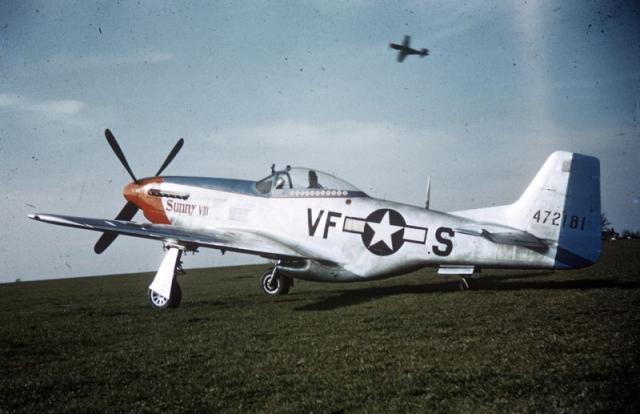
Mustang P-51D-20-NA s/n 44-72181 "Sunny VIII", Debden, 04/1945
© IWM (Roger Freeman Collection - FRE 5355) - www.americanairmuseum.com
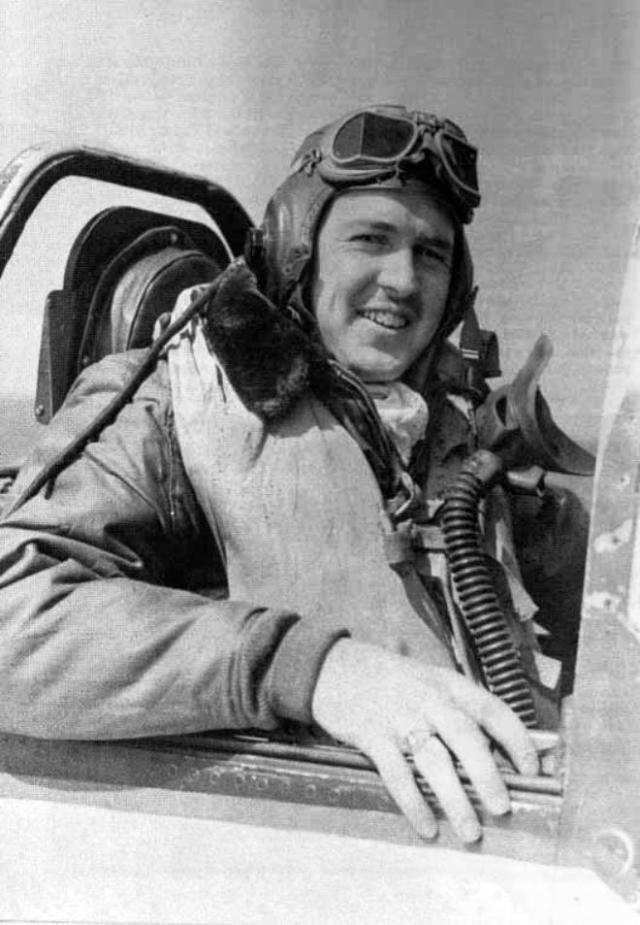
Harold H. Fredericks
© IWM (UPL 20761) - www.americanairmuseum.com
Mustang P-51D-10-NA s/n 44-14332 "Lazy Daisy" :
Le Lt. Raymond A. Dyer abattit un Me 262 le 4 avril 1945 à bord de cet appareil. Sur le côté droit de l'appareil était inscrit "Dyer-ria" (jeu de mot avec le nom du Lt. Dyer).
Lt. Raymond A. Dyer shot down a Me 262 on April 4th, 1945, on board this aircraft. On the starboard side of the aircraft was written "Dyer-ria" (word play on Lt. Dyer's name).
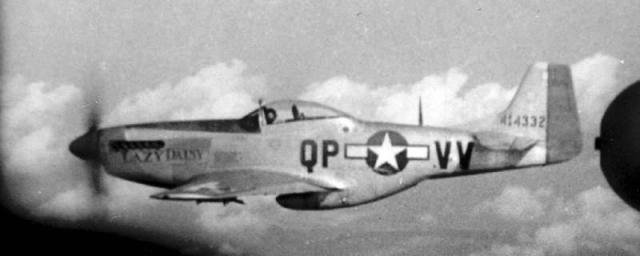
Mustang P-51D-10-NA s/n 44-14332 "Lazy Daisy"
Photo prise depuis un B-24 Liberator du 458th BG
Photo taken from a B-24 Liberator of the 458th BG
© IWM (UPL 21106) - www.americanairmuseum.com
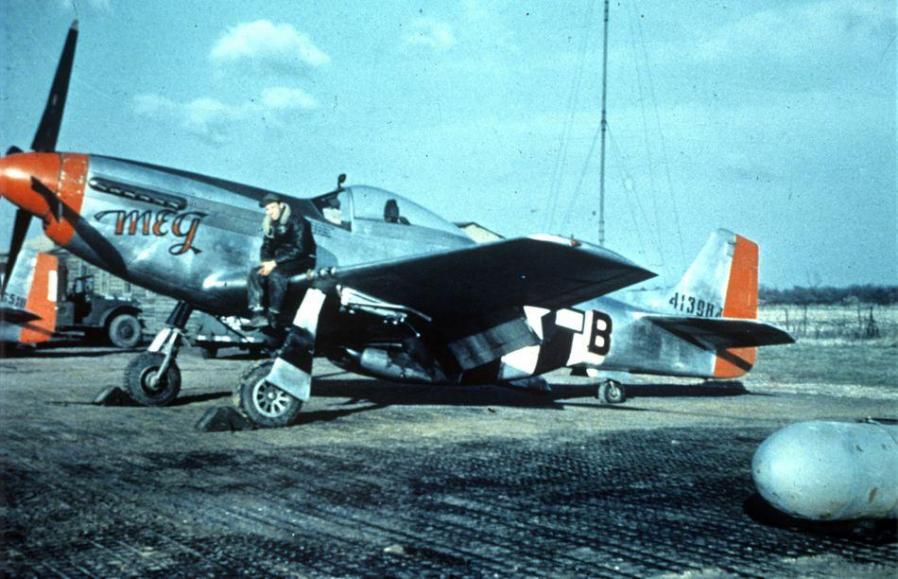
Mustang P-51D-5-NA '44-13984' 'Meg', 334th FS, 4th FG, Debden. Pilot Lieutenant Clarence Boretsky.
Sur l'aile/On wing, crew chief SSgt. Don Allen
© IWM (Roger Freeman Collection - FRE 5307) - www.americanairmuseum.com
DES MUSTANG EN ZONE PACIFIQUE
MUSTANG IN THE PACIFIC AREA
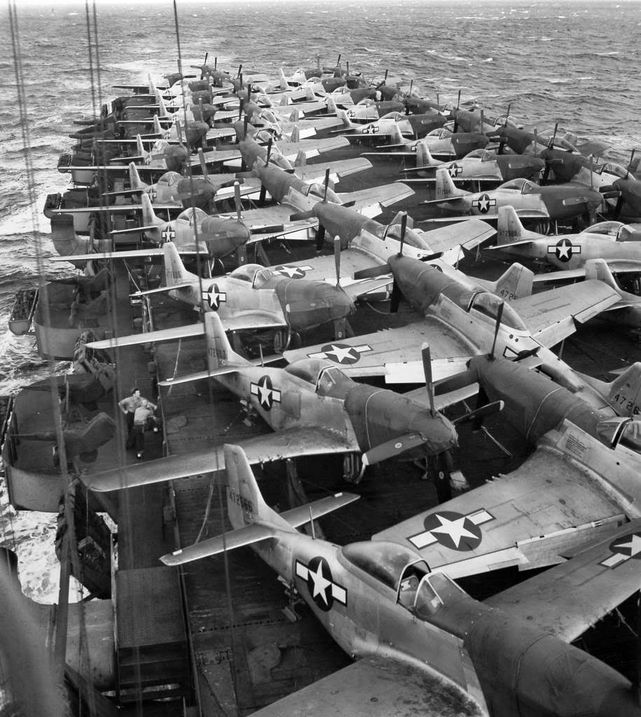
P-51D-10-NA, USS Kalinin Bay
En route pour Tinian (îles Mariannes) à destination du 506th FG, mai 1945
Heading for Tinian (Mariana Islands) to be delivered to the 506th FG, May, 1945
© US NARA (domaine public - public domain)
5TH AIR FORCE
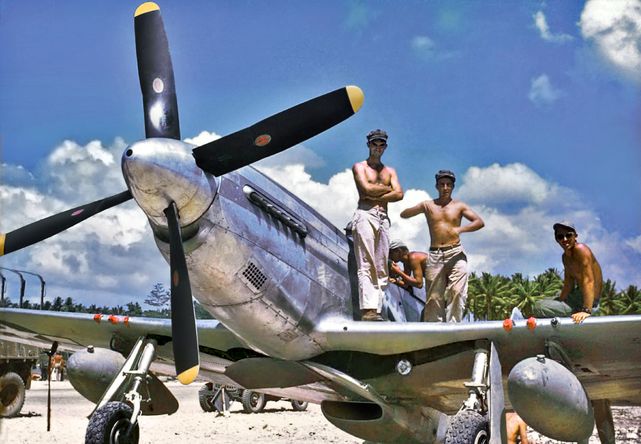
P-51 Mustang, 82nd TRS, Morotai, 11/1944
5th Air Force © Bob Rocker
3RD AIR COMMANDO GROUP (ACG)
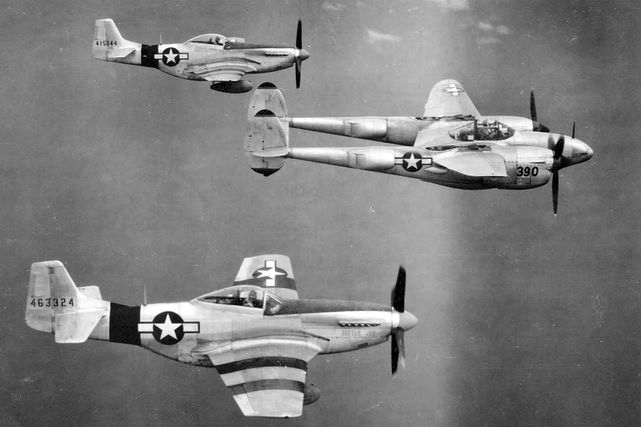
P-51D-20-NA (44-63324 & 44-15044) - 4th FS - 3rd ACG
Escortant un F-5 Lightning - Escorting a F-5 Lightning
© US NARA (domaine public - public domain)
Depuis une base de fortune sur l’île de Luçon, le 3rd ACG soutient l’avancée des troupes du général Krueger. Equipé de P-51D, mais également de C-47 et de L-5, ce groupe a été activé en Floride en 1944 avant de rejoindre Leyte en fin d’année, puis Mangaldan (Luçon) en janvier 1945.
From a makeshift base on the Luzon Island, the 3rd ACG supported the advance of general Krueger's troops. Equipped with P-51D, but also with C-47 and L-5, this group was activated in Florida in 1944 before reaching Leyte at the end of the year, then Mangaldan (Luzon) in January, 1945.

Mustang P-51D-20-NA (44-64076) “Jumpin'-Jacques”
3rd FS, 3rd Air Commando 1st Lt Jacques E. Young
© Jean-Marie Guillou
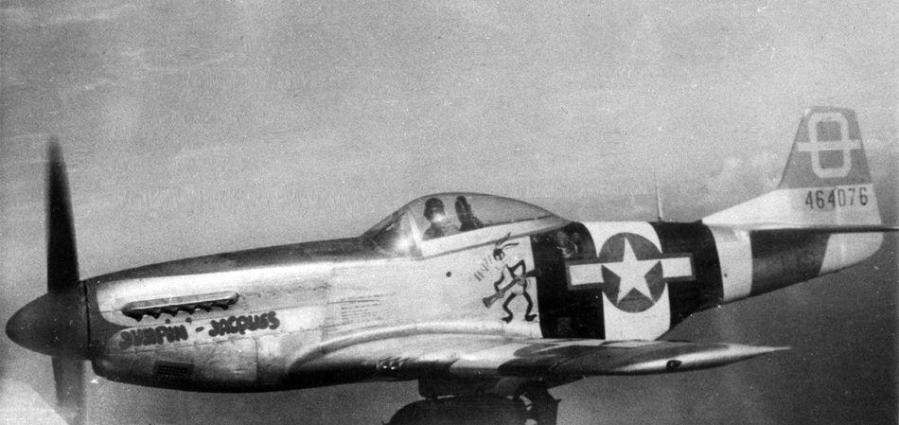
Mustang P-51D-20-NA (44-64076) “Jumpin'-Jacques”
3rd FS, 3rd FG, 5th AF, Fl. Lt Jacques E. Young
Photo FRE 10205 © IWM - www.americanairmuseum.com
Le 10 février 1945, 4 avions avaient pour mission d’attaquer un aérodrome temporaire japonais au sud de Taïwan. Lors de l’attaque, le Lt La Croix fut touché et dû amerrir. Le Lt Louis E. Curdes, restant sur zone à bord de son P-51D « Bad Angel » pour guider un avion de sauvetage vers son camarade, aperçut alors un C-47 qui s’apprêtait à atterrir sur un terrain encore sous contrôle japonais sur l’île de Bataan.
On February 10th, 1945, 4 aircraftstook off to attack a Japanese temporary airfield in the South of Taiwan. During the attack, the Lt La Croix was hit and had to ditch. The Lt Louis E. Curdes, while flying his P-51D "Bad Angel" over La Croix to guide a rescue aircraft, saw a C-47 which was approaching to land on an airfield still under Japanese control in the island of Bataan.
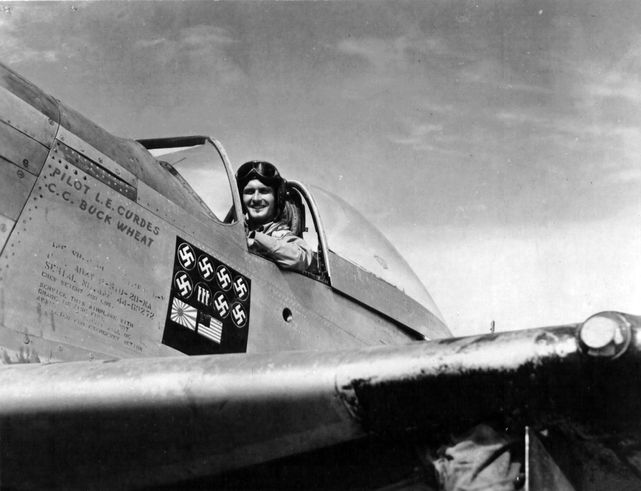
1st Lieutenant Louis E. Curdes
© US NARA (domaine public - public domain)
Essayant sans succès de le contacter par radio, puis lui faisant des signes en lui passant devant, le C-47 continuait son approche pour atterrir. Curdes pris donc la décision d’abattre le C-47 en tirant sur ses deux moteurs mais en évitant le fuselage afin que celui-ci amerrisse pour éviter la capture.
He tried unsuccessfully to contact him by radio, then made him signs by flying in front of him, but the C-47 continued its approach for landing. Then Curdes made the decision to shoot down the C-47 by firing at its two engines but by avoiding the fuselage, in order to force it to ditch and then avoid the capture.

P-51D-20NA "BAD ANGEL", 1st Lt Louis E. Curdes
© Jean-Marie Guillou
Le C-47 se posa donc sur l’eau. Les 12 passagers, dont deux infirmières, furent ainsi sauvés de la capture. Curdes appris un peu plus tard qu'il avait passé une soirée avec l'une de ces deux infirmières. Quelques mois plus tard, il rencontra de nouveau cette infirmière, Valerie, qui accepta finalement de l'épouser.
The C-47 ditched. The 12 passengers, including two nurses were safe and rescued. Curdes learnt later that he met one of these two nurses during a party. A few months later, he met again this nurse, Valerie, and finally decided to get married.
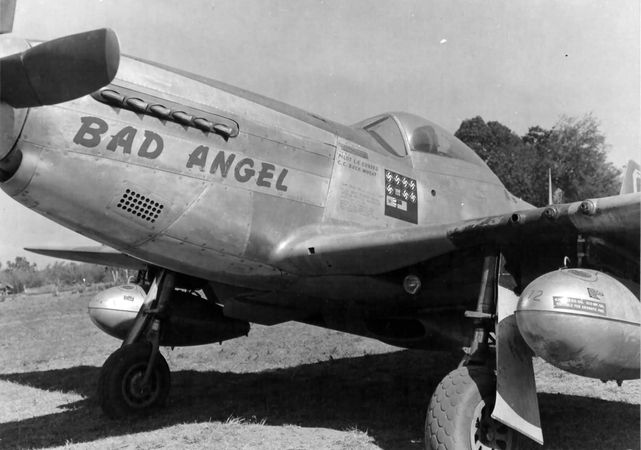
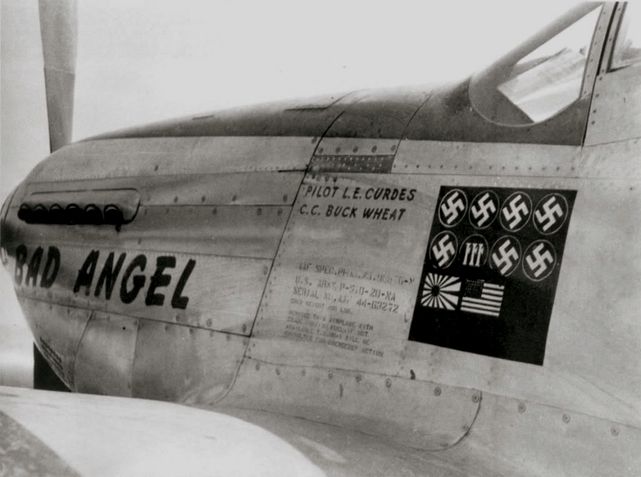
P-51D "BAD ANGEL", 1st Lt Louis E. Curdes
Avec la marque de "victoire" sur le C-47 !
With the "air kill" mark of the C-47 !
© US NARA (domaine public - public domain)
35TH FIGHTER GROUP
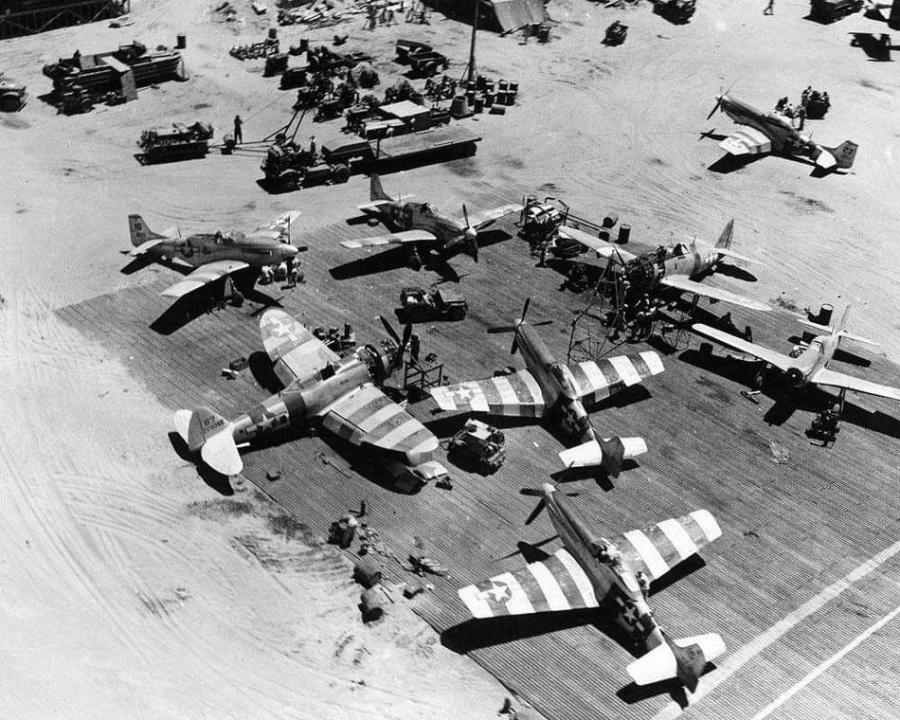
P-51 Mustangs & P-47 Thunderbolt, 35th FG, Lingayen Airfield, Luçon, avril 1945 - Luzon, Apr 1945
© US NARA (domaine public - public domain)
Formé aux USA en 1940, le 35th FG passa au P-51 en mars 1945, dans des missions de support des troupes au sol à Luçon. Les pilotes affrontent lors de ces missions des chasseurs japonais plus récents comme le Kawanishi N1K2-J « George » ou le Nakajima Ki-84 « Frank ». Le 5 juillet 1945, le 1st Lt Ellis Baker (40th FS – 35th FG) se débarrasse de deux « George ».
Formed in the USA in 1940, the 35th FG converted to the P-51 in March, 1945 when supporting the ground troops on Luzon. The pilots faced during these missions Japanese fighters more recent such as Kawanishi N1K2-J "George" or Nakajima Ki-84 "Frank". On July 5th, 1945, 1st Lt Ellis Baker (40th FS - 35th FG) gets rid of two "George".
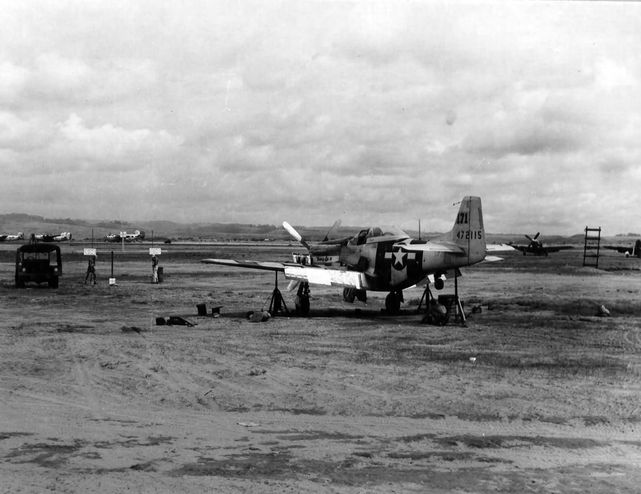
P-51D-20-NA (44-72115) “Nancy Lou II”, 41st FS 35th FG, 25 juin/June 1945
348TH FIGHTER GROUP
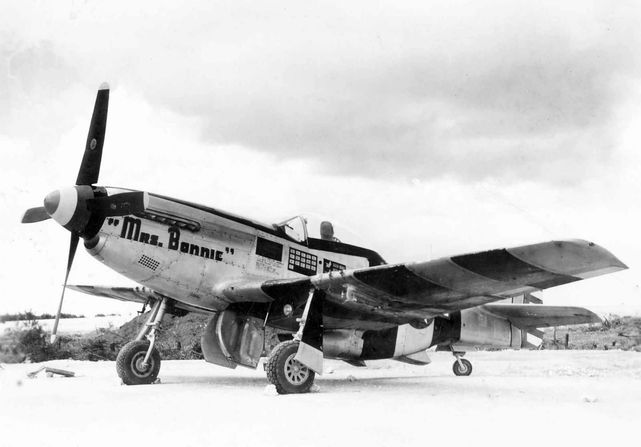
P-51K-10 "Mrs Bonnie", Lt Col. William D. Dunham, 348th FG
© US NARA (domaine public - public domain)
Formé aux USA en 1942, le 348th FG fut d'abord envoyé à Port-Moresby (Nouvelle-Guinée). Le groupe fut converti au P-51 début 1945 pour effectuer des missions d'escorte de bombardiers ou d'attaque au sol sur Kyushu. Il fut basé à Luçon (février à juillet 1945) puis à Ie Shima (à partir de juillet). Le 1er août 1945, avec des P-51K-10, le Lt Colonel William D. « Dinghy » Dunham et le Major Edward S. « Ed » Popek abattent respectivement 1 et 2 « Frank » qui s’attaquaient à un groupe de B-24 en route vers Kyûshû. Dunham obtenait ainsi sa 16e victoire, les 15 autres ayant été obtenues sur P-47.
Formed in the USA in 1942, the 348th FG was at first sent to Port-Moresby (New-Guinea). The group converted to the P-51 in early 1945 to make a mix of bomber escort and ground attack missions on Kyushu. It was based at Luzon (February to July, 1945) then at Ie Shima (from July). On August 1st, 1945, flying P-51K-10, Lt Colonel William D. " Dinghy " Dunham and Major Edward S. "Ed " Popek shot down respectively 1 and 2 "Franks" which were attacking a group of B-24s on the way to Kyûshû. Dunham obtained his 16th air kill, the 15 others having been obtained on P-47.
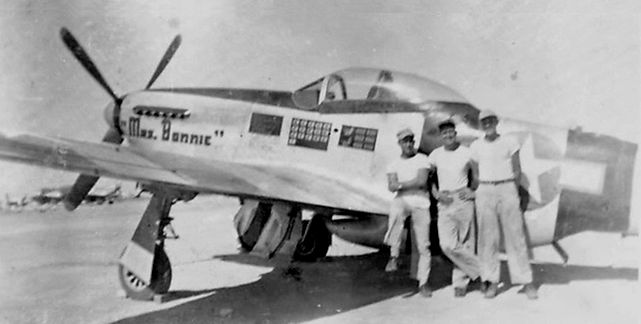
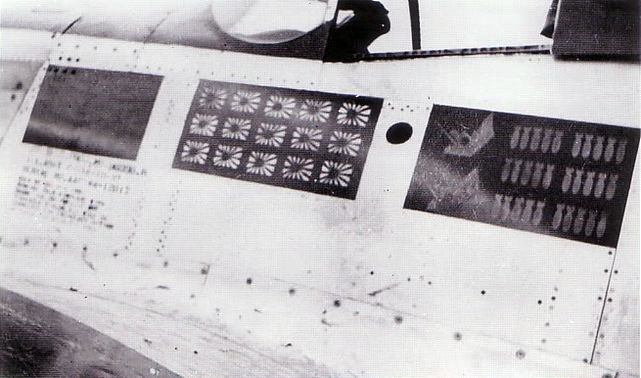
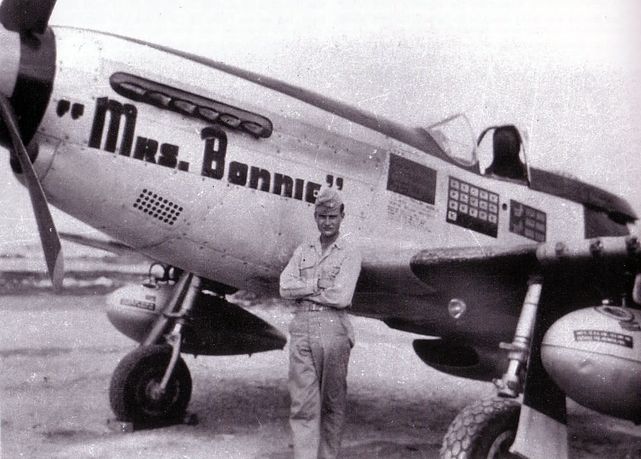
P-51K-10 "Mrs Bonnie", 348th FG
© US NARA (domaine public - public domain)

P-51K-10 "Mrs Bonnie", Lt Col. William D. Dunham, 348th FG
auteur inconnu - author unknown
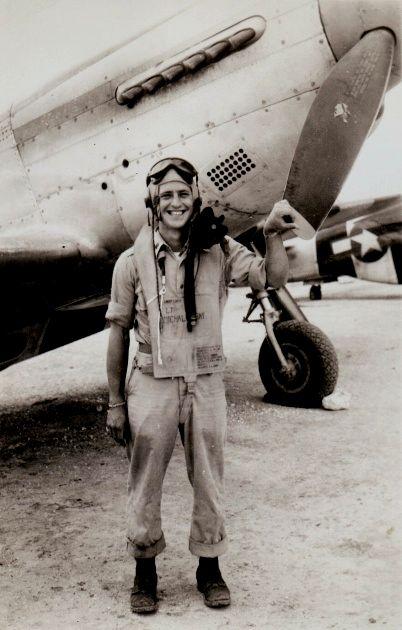
P-51D - Ie Shima, 1945. 342nd FS, 348th FG, 2nd LtStanley E. Michalowski
© S. Michalowksi Jr (domaine public - public domain)
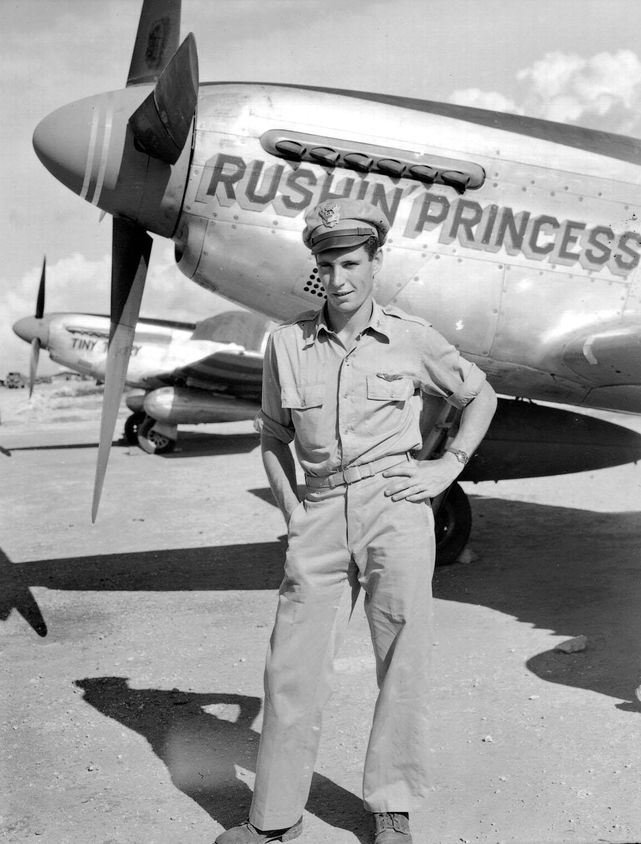
P-51D ''Rushin' Princess'', 1st Lt. Wayne Smith 348th FG, Ie Shima, août/August 1945.
© US NARA (domaine public - public domain)
82ND TACTICAL RECONNAISSANCE SQUADRON (TRS)
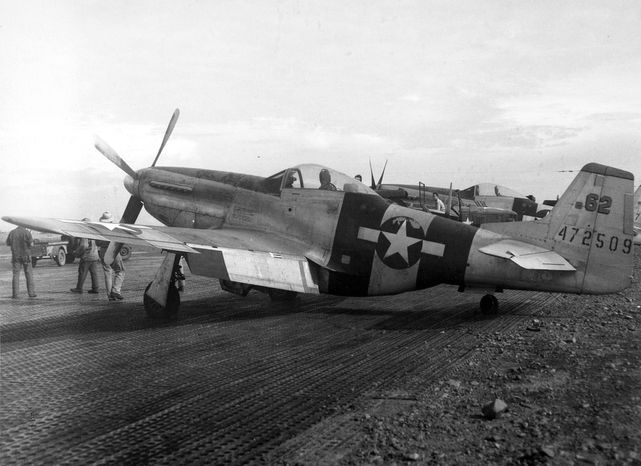
P-51D-20-NT (44-72509), 82nd TRS, 71st TRG
© US NARA (domaine public - public domain)
Les unités du Pacifique seront tardivement équipées de Mustang. Basé à Morotai (Moluques Nord, Indonésie), le 82nd TRS, dépendant du 71st Reconnaissance Group (5th AF), passe sur P-51D et K et F-6D à l’automne 1944 pour remplacer ses vieux P-39Q.
Units of the Pacific were equipped late with Mustang. Based in Morotai (Northern Moluccas, Indonesia), the 82nd TRS, belonging to the 71st Reconnaissance Group (5th AF), converted to P-51D and K and F-6D in the autumn, 1944 to replace their old P-39Q.
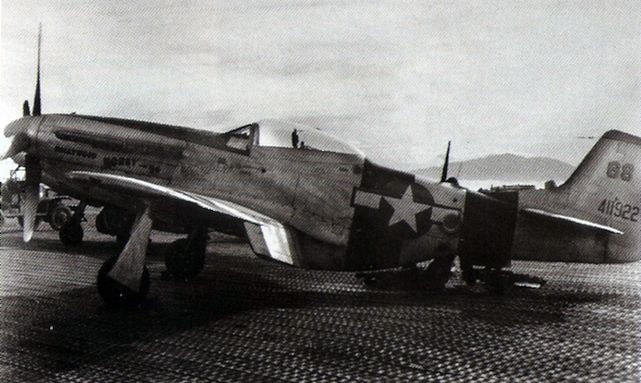
P-51K-5-NT "Hollywood Honey 5TH" (44-11922), 82nd TRS, 71st TRG
© US NARA (domaine public - public domain)
Le 11 janvier 1945, le Captain William A. Shomo et le 1st Lieutenant Paul M. Lipscomb partent en mission de reconnaissance. Shomo pilote le Mustang F-6D 44-14841 (P-51D-10-NA converti en F-6D). A proximité de la ville de Baguio (au nord de Manille), ils aperçoivent une trentaine d’avions japonais, répartis en 2 groupes, visiblement conduits par un G4M « Betty ». Les deux Mustang se glissent derrière un groupe de 12 chasseurs Kawasaki Ki-61 « Tony » et Nakajima Ki-44 « Tojo ». Shomo se rapproche de la dernière section de chasseur en « V ».
On January 11th, 1945, Captain William A. Shomo and the 1st lieutenant Paul Mr Lipscomb took off for a reconnaissance mission. Shomo flew the Mustang F-6D 44-14841 (P-51D-10-NA converted in F-6D). Close to the town Baguio (Northern Manila), they saw about thirty Japanese aircrafts, parted in 2 groups, apparently led by a G4M "Betty". Both Mustangs manoeuvered to arrive behind a group of 12 Kawasaki Ki-61 "Tony" and Nakajima Ki-44 "Tojo" fighters. Shomo got closer to the rear section of fighers in "V".
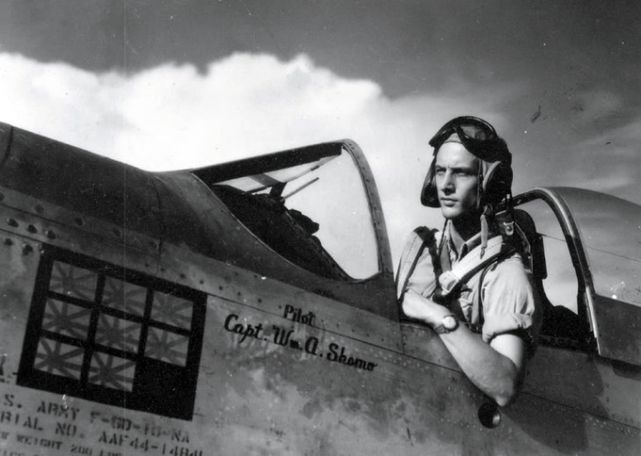
William A. Shomo, Mustang F-6D-10 Mustang 44-14841 “Snooks 5th”
© USAF (domaine public - public domain)
A 25 m il tire une rafale sur l’ailier, qui explose. Le leader de la section japonaise, prenant Shomo pour un des siens, ouvre la verrière de son Tony et lui fait des signes. Shomo lui répond par une courte rafale et le pilote s’effondre juste avant que l’avion n’explose. Puis Shomo tire sur un 3e « Tony » qui explose également.
At 80 ft, he fired a shot at the wingman, who exploded. The leader of the Japanese section, taking Shomo for one of his, opened the window of his Tony and made him signs. Shomo answered by a short shot and the pilot collapsed before his aircraft exploded. Then Shomo fired at a 3rd "Tony" which also exploded.
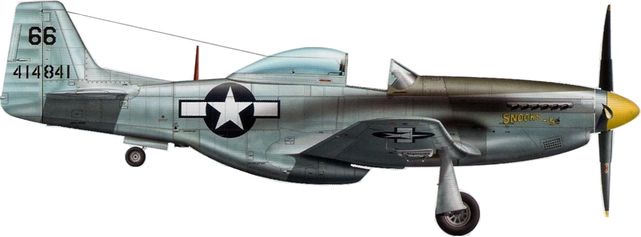
Mustang F-6D-10 Mustang 44-14841 “Snooks 5th”, William A. Shomo
© Jean-Marie Guillou
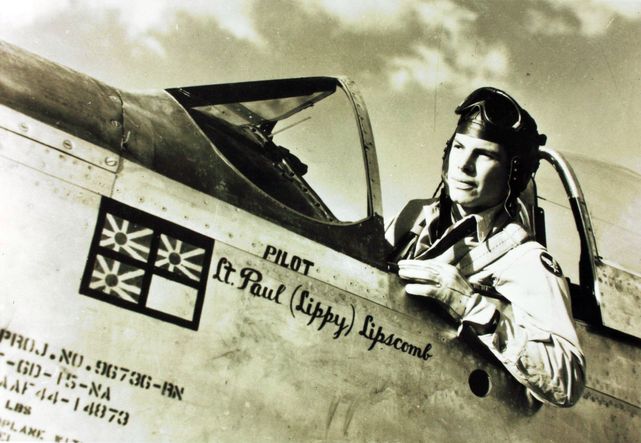
P-51D-15-NA (44-14873), Lt Paul "Lippy" Lipscomb, 82nd TRS, 71st TRG
© San Diego Air and Space Museum (domaine public - public domain)
Pendant ce temps, Lipscomb abat le dernier avion de la section voisine. Les deux pilotes continuent l’attaque, à 2 contre 9. Shomo tire sur 2 appareils dont un explose. Lipscomb abat également un autre avion qui s’écrase. Les deux pilotes s’en prennent ensuite au bombardier ; Lipscomb le rate mais Shomo tire une longue rafale, mettant ainsi le feu à une aile. Lipscomb abattit alors un autre chasseur.
Meanwhile, Lipscomb shot down the last aircraft of the nearby section. Both pilots continued the attack, 2 against 9. Shomo fired at 2 other aircrafts, one of them exploded. Lipscomb also shot down another fighter which crashed. Both pilots then went after the bomber ; Lipscomb missed it but Shomo fired a long shot, which fired a wing fire. Lipscomb then shot down another fighter.
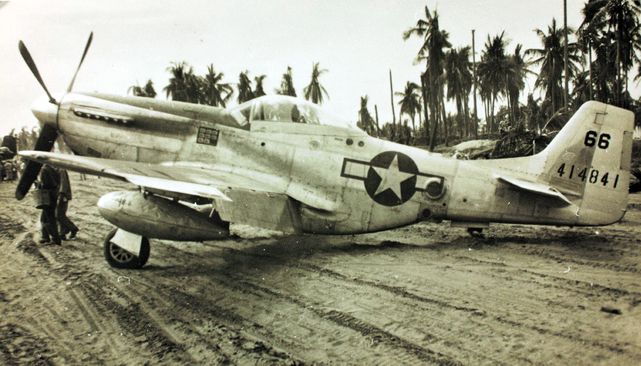
Mustang F-6D-10 Mustang (44-14841) “Snooks 5th”, William A. Shomo
© San Diego Air and Space Museum (domaine public - public domain)
Accroché par un japonais, Shomo manoeuvra pour le semer. Il aperçut un peu après le bombardier s’écraser. Il revint alors sur 2 autres chasseurs : il abattit le leader par l’arrière et poursuivit le second pour l’abattre à quelques mètres du sol. Shomo et Lipscomb se regroupèrent et rentrèrent à la base. Shomo revendiqua 7 victoires (pour lesquelles il reçut la Medal of Honor) et Lipscomb 3. Suite à cette action, la 5th AF fit livrer des P-51 D-20 tout neufs. Shomo baptisa le sien « The flying undertaker » (le croque-mort volant), Shomo étant embaumeur dans le civil.
Attacked by a Japanese, Shomo maneuvered to get rid of him. He saw a little after the bomber crashing. He then returned on the 2 other fighters : he shot down the leader by the rear and pursued the second and shot him down a few feet away from the ground. Shomo and Lipscomb then gathered together and flew back to base. Shomo claimed 7 kills (he received the Medal of Honor) and Lipscomb 3. Further to this action, the 5th AF delivered brand new P-51 D-20. Shomo baptized his P-51 " The flying undertaker ", Shomo being an embalmer in civilian life.
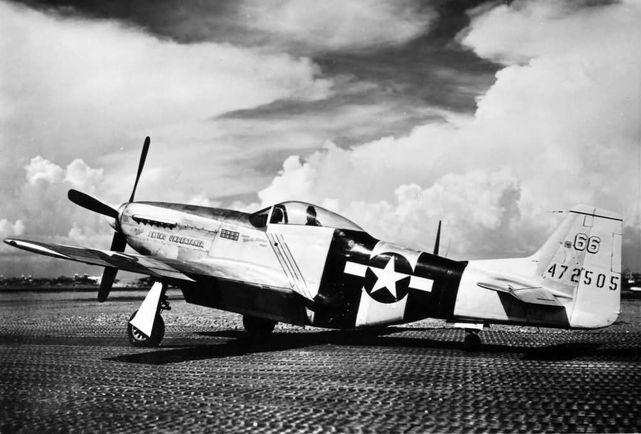
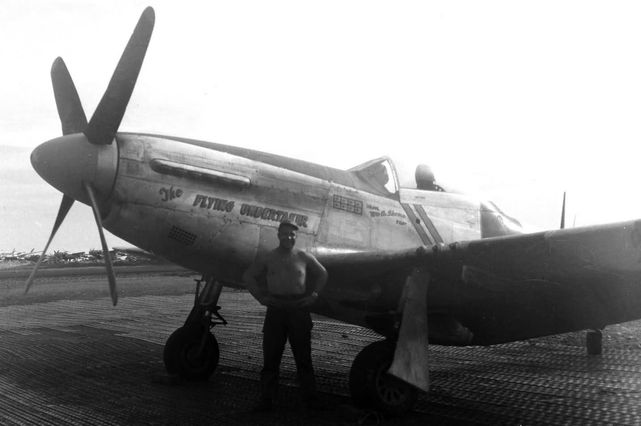
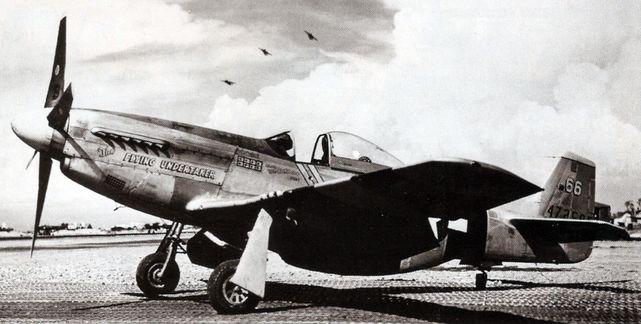
P-51D-20-NA (44 72505) - 71st TRG 82 TRS, Maj Bill Shomo, “The Flying Undertaker”
© US NARA (domaine public - public domain)

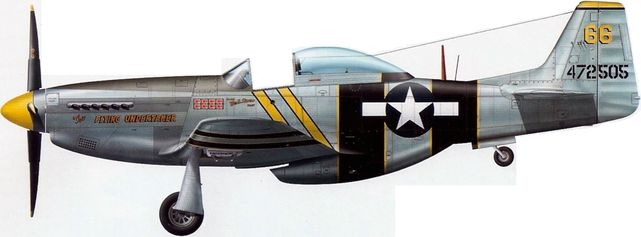
Mustang P-51D-20-NA (44-172505) “Snooks 6th” " Flying Undertaker", William A. Shomo
© Jean-Marie Guillou
110TH TACTICAL RECONNAISSANCE SQUADRON (TRS)
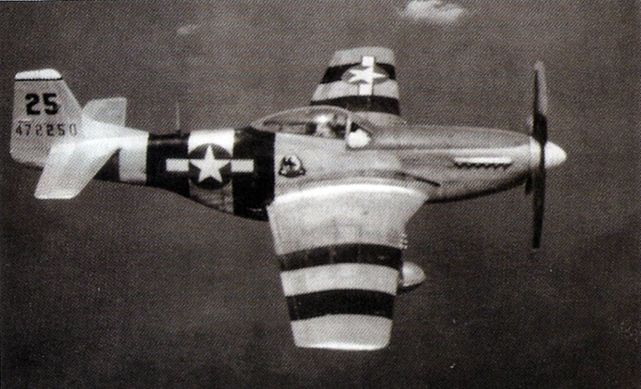
P-51D-20-NA (44-72250) - 71st TRG 110thTRS
© US NARA (domaine public - public domain)
Rattaché également au 71st TRG, le 110th TRS est rééquipé fin 1944 avec des Mustang F-6 et P-51K. Mais les premières missions ne débuteront qu’en juillet 1945, à partir de la base d’Ie Shima (Okinawa), vers l’Indochine et le Japon. Les Mustang doivent harceler les défenses japonaises sur Kyûshû et Honshû, en vue d’un possible débarquement. Le 14 août 1945, des F-6K du 110th TRS revendiquent 6 victoires.
Belonging also to the 71st TRG, the 110th TRS was equipped at the end of 1944 with Mustang F-6 and P-51K. But the first missions began only in July, 1945, from Ie Shima base (Okinawa), towards Indochina and Japan. Mustangs had to attack Japanese defenses at Kyûshû and Honshû, to prepare a possible landing. On August 14th, 1945, F-6Ks of 110th TRS claimed 6 air kills.
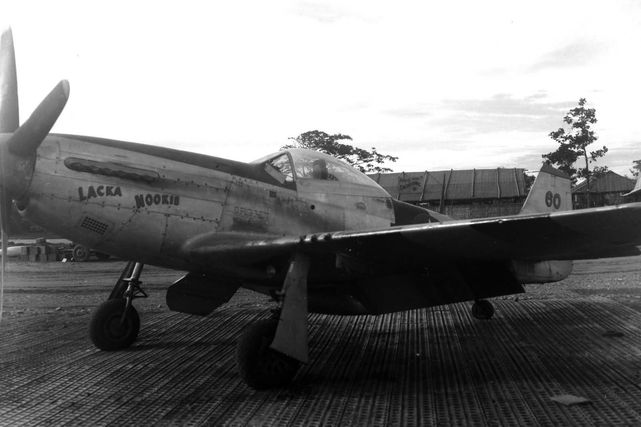
P-51D "Lacka Nookie", 71st TRG
© US NARA (domaine public - public domain)
7TH AIR FORCE
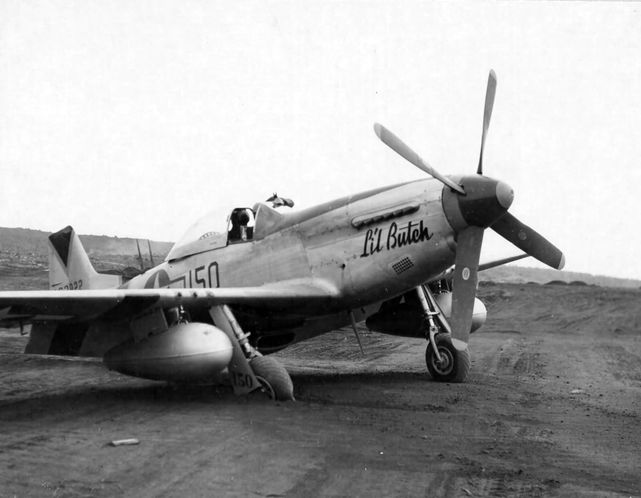
P-51D-20-NA (44-63822) “Lil Butch”, 47th FS 15th FG, Iwo Jima, 12 avril/April 1945
© US NARA (domaine public - public domain)
« TOKYO CLUB » : 15TH, 21ST, 506TH FG
Le 15th FG, du Colonel James O. Beckwith, fut le premier équipé de P-51 dans la zone du Pacifique Central. Il arrive à Iwo Jima le 22 février 1945. Début mars, le 47th FS inaugure des missions d’appui aux Marines. Le 21st FG, du Colonel Kenneth R. Powell, arrive ensuite à Iwo Jima le 15 mars.
The 15th FG, led by Colonel James O. Beckwith, was the first unit equipped with P-51 in the Central Pacific area. It arrived at Iwo Jima on February 22nd, 1945. In early March, the 47th FS started support missions for the Marines. As for Colonel Kenneth R . Powell's 21st FG, it arrived at Iwo Jima on March 15th.
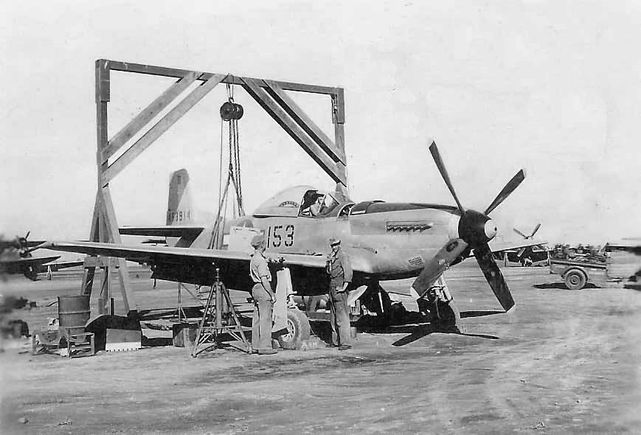
P-51D 15th FG, 47th FS
© US NARA (domaine public - public domain)
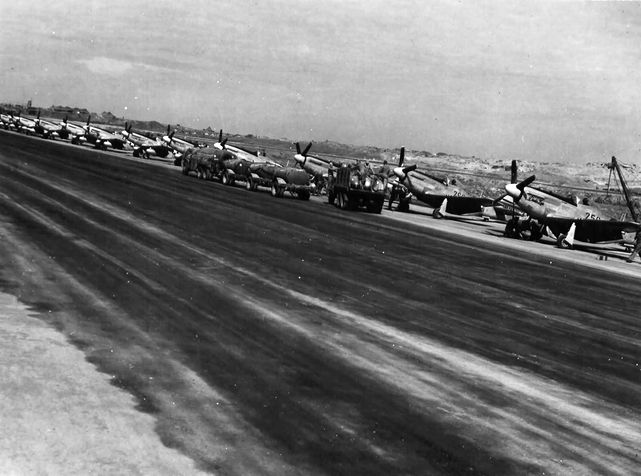
P-51D, Iwo Jima, 1945
Le premier P-51 est le P-51D-20-NA n°44-63733 "Dede Lou" du 21st FG, 72th FS
The first P-51 is the P-51D-20-NA #44-63733 "Dede Lou" of the 21st FG, 72th FS
© US NARA (domaine public - public domain)
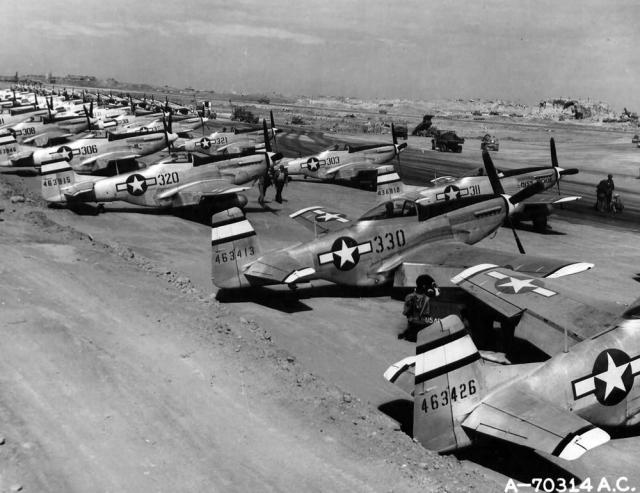
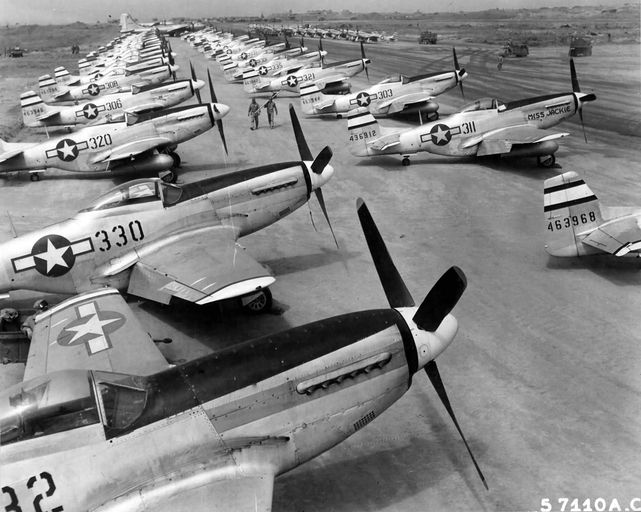
P-51D-20-NA, Iwo Jima, 1945
A noter sur le "311" une erreur de s/n : cela aurait dû être "463912" pour "44-63912". Le "44-36912" était en fait le s/n d'un Douglas A-26C Invader d'une commande résiliée par la suite.
Note the mistake on #311 with the s/n : it should have been "463912" for "44-63912". "44-36912" was originally assigned to a Douglas A-26C Invader in an order finally cancelled
© US NARA (domaine public - public domain)
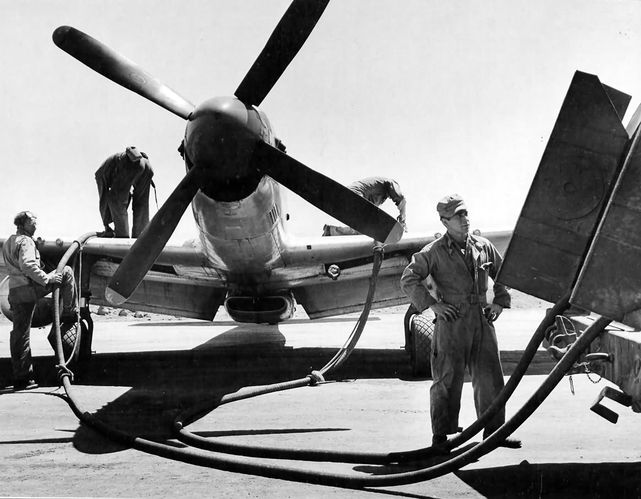
P-51D 15th FG, Iwo Jima, 1945
© US NARA (domaine public - public domain)
Le 7 avril 1945, la première " Very Long Range (VLR) ", mission d’escorte à long rayon d’action, est lancée ; c’est ce type de mission qui permet aux pilotes, qui se font appeler les « Sun-setters » en arborant un insigne de soleil couchant, de devenir membre du " Tokyo club ". 108 Mustang escortent des B-29 chargées de bombarder les usines Nakajima dans la banlieue de Tokyo.
On April 7th, 1945, the first " Very Long Range (VLR) ", a long range escort mission, was launched ; it was that kind of mission which allowed pilots, nicknamed "Sun-setters" and exhibiting a badge of setting sun, to become member of the " Tokyo club ". 108 Mustang escorted B-29 sent to bomb Nakajima factories in the suburb of Tokyo.
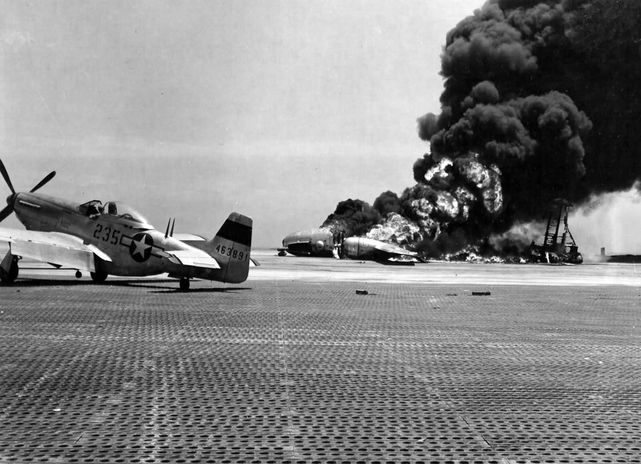
Mustang P-51D-20-NA (44-63891), 1st Lt John W. Brock, 46th FS 21st FG
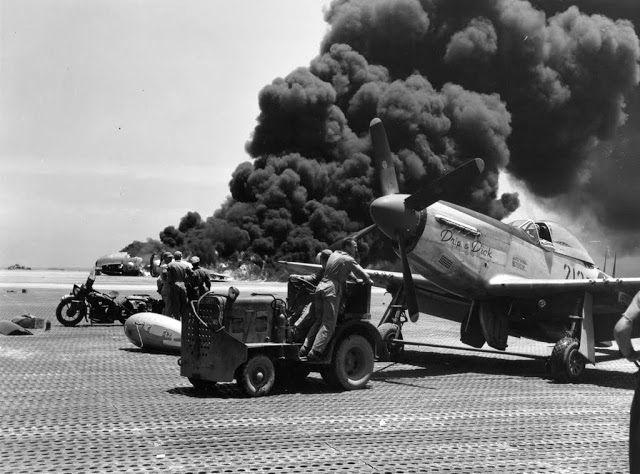
Mustang P-51D Drip & Dick, 46th FS 21st FG, 24/04/1945, Iwo Jima
Un B-29 s'est crashé ! - A B-29 has crashed !
© US NARA (domaine public - public domain)
21 victoires seront homologuées au retour mais 2 Mustang sont perdus (1 pilote disparu) : parmi ces victoires, deux Mitsubishi A6M3 attribués au Captain Robert W. Moore et quatre victoires au Major James B. Tapp, tous deux du 78th FS - 15th FG.
21 air kills were registered after the mission but 2 Mustangs were lost (1 missing pilot) : among these kills, two Mitsubishi A6M3 claimed by Captain Robert W. Moore and four kills claimed by Major James B. Tapp, both of them from 78th FS - 15th FG.
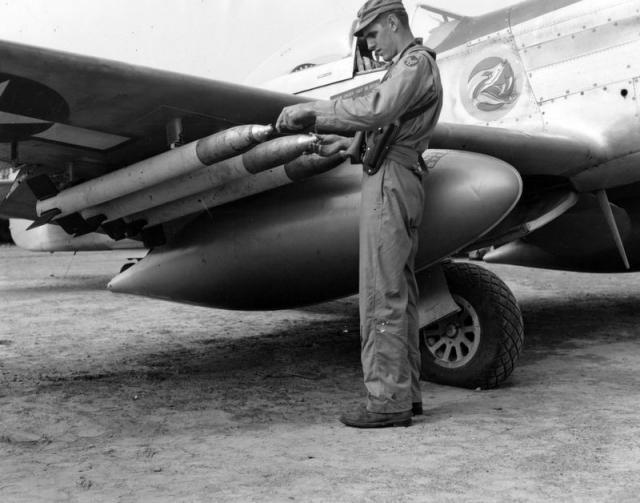
Mustang P-51D "Margaret IV, pilot James B. Trapp, 78th FS 15th FG
Chargement de roquettes par le Sgt Bianco
Rockets loading by Sgt Bianco
© USAF (domaine public - public domain)
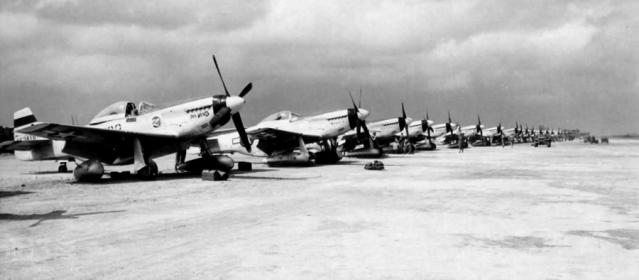
Mustang P-51D-20-NA "Pee Wee" (44-63416), 78th FS 15th FG
© US NARA (domaine public - public domain)
Le 16 avril, les " Sun-setters " se lancent dans un nouveau type de mission, le "strike", qui consiste à attaquer les aérodromes de Kyûshû. La mission est peu efficace et 3 Mustang sont victimes de pannes ou de la DCA.
On April 16th, " Sun-setters " started a new type of mission, the "strike", which consisted in attacking Kyûshû airfields. The mission was not efficient and 3 Mustangs were victims of breakdowns or the flak.
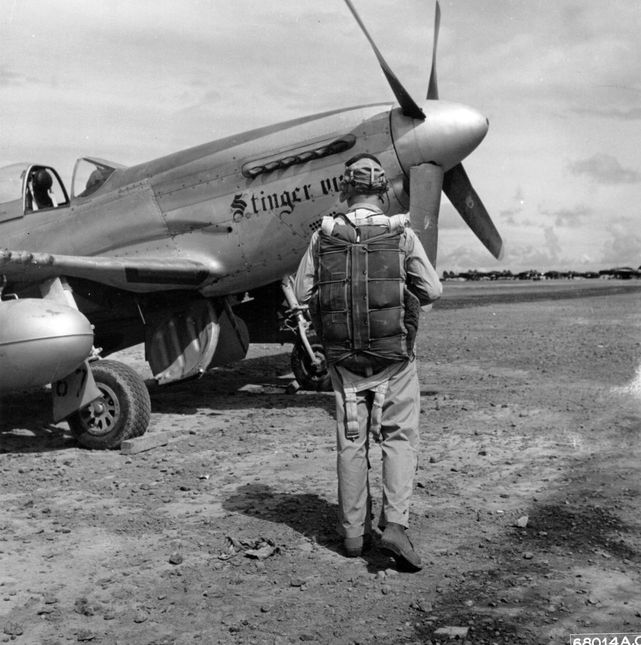
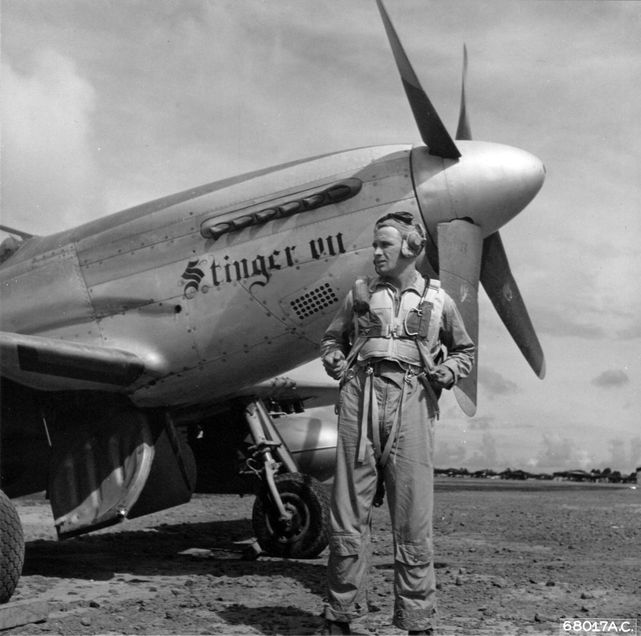
P-51D-20-NA "Stinger VII" (44-63483), Captain Robert W. "Todd" Moore, 15th FG
© US NARA (domaine public - public domain)
Quelques jours plus tard, une sortie similaire se révèlera plus efficace sur les aérodromes de Tokyo : 53 appareils ennemis sont déclarés détruits au sol. L’arrivée du 506th FG va intensifier les missions " VLR ". Les mauvaises conditions météorologiques de cette région ont parfois entraîné des pertes d’avions ; ainsi, le 1er juin 1945, 26 Mustang disparaissent dans une tempête tropicale.
A few days later, a similar mission was more efficient over Tokyo airfields : 53 enemy aircrafts were declared destroyed on the ground. The arrival of the 506th FG allowed and intensified the " VLR " missions. The bad weather conditions in this region sometimes involved losses of aircrafts ; on June 1st, 1945, 26 Mustang disappeared in a tropical storm.
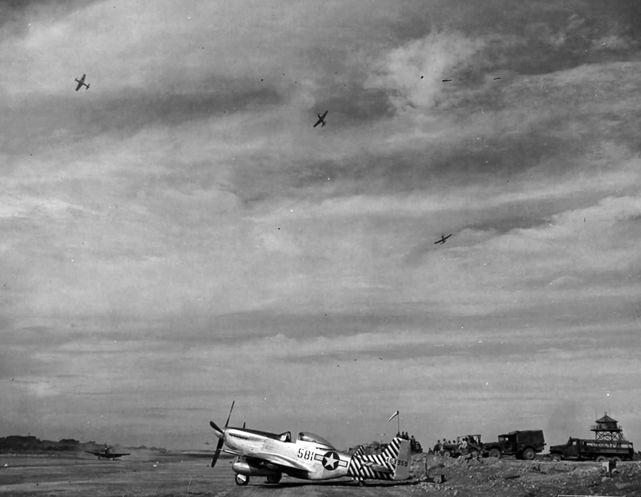
P-51D-20-NA (44-63959), 457th FS, 506th FG, Iwo Jima, 1945
© US NARA (domaine public - public domain)
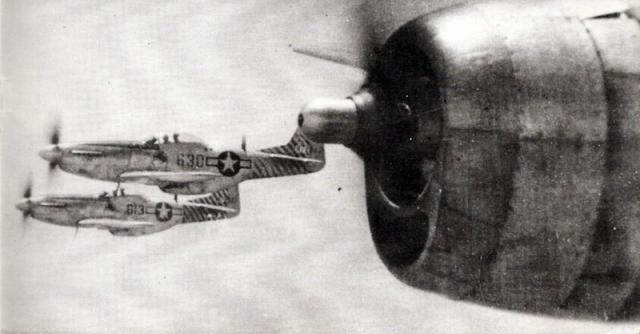
P-51D, 506th FG
Escorte de B-29 - Escorting B-29s
© USAF (domaine public - public domain)
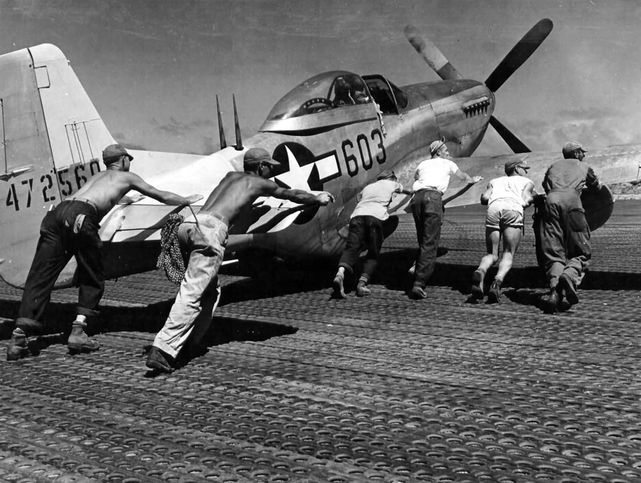
P-51D-20-NA (44-72560), 462nd FS, 506th FG, Iwo Jima, 1945
© US NARA (domaine public - public domain)
Témoin de ce drame, le 1st Lt Evan S. Stuart, du 506th FG, explique qu’ils étaient chargés, avec 2 autres groupes de Mustang, d’escorter des B-29 vers Oasaki. L’escorte avançant plus vite que les bombardiers, le leader demande de faire un large 360° pour se replacer derrière les bombardiers.
As a witness of this drama, 1st Lt Evan S. Stuart, from 506th FG, explained that they were in charge, with 2 other groups of Mustangs, of escorting B-29 towards Oasaki. The escort flying faster than the bombers, the leader asked to make a wide 360° curve to reposition themselves behind bombers.
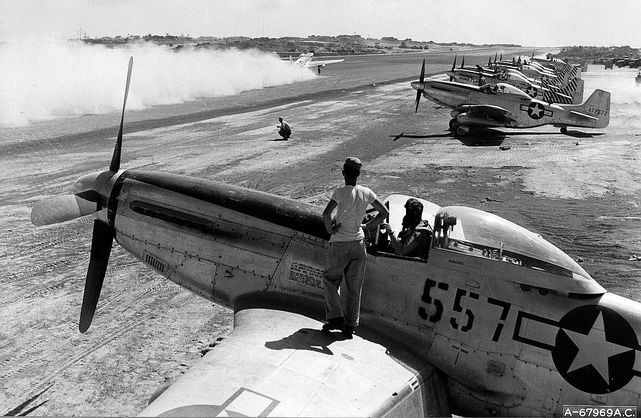
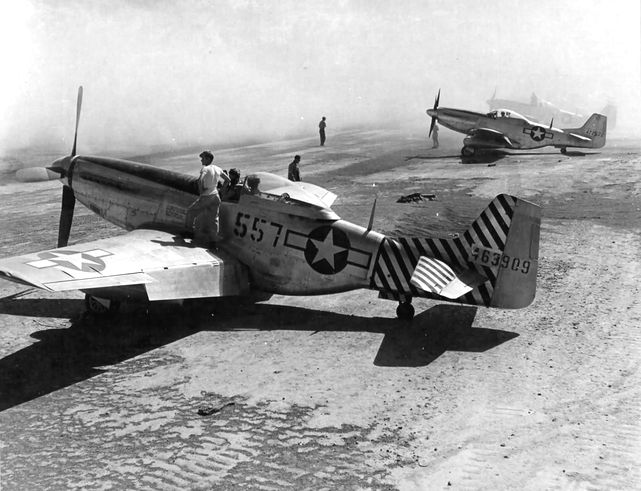
P-51D-20-NA (44-63909), 458th FS, 506th FG, Iwo Jima, 1945
© US NARA (domaine public - public domain)
C’est cette manœuvre qui fit entrer les Mustang dans une formation nuageuse très dense. La formation se disloqua ; Stuart réussit difficilement à se retrouver et à rentrer. Sur les 26 Mustang disparus, seul un pilote fut retrouvé en vie dans son canot de sauvetage.
This operation led the Mustangs in a very dense cloud formation. The group dismantled itself ; Stuart found with difficulty his bearings and and flew back. Out of the 26 missing Mustangs, only one pilot was rescued alive in his lifeboat.
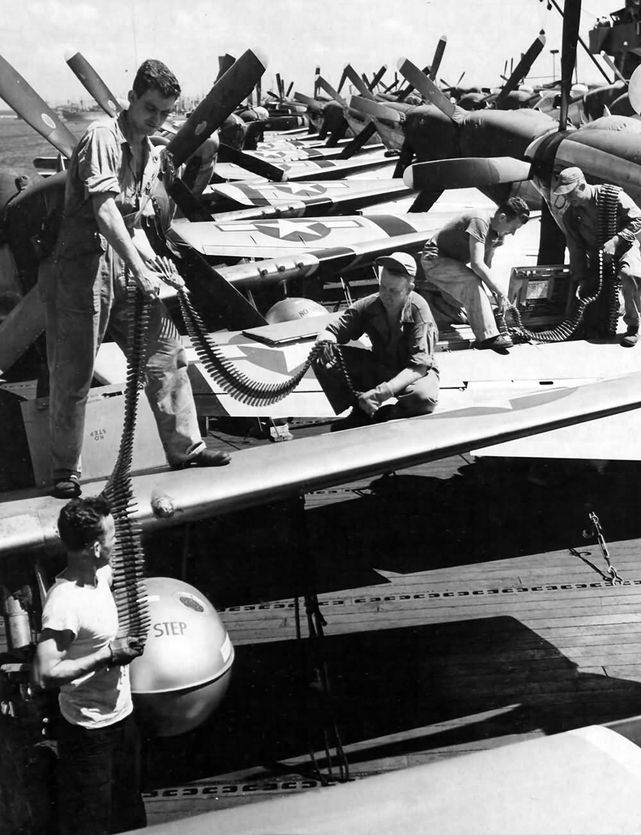
P-51D 15th FG, Guam, 1945
© US NARA (domaine public - public domain)
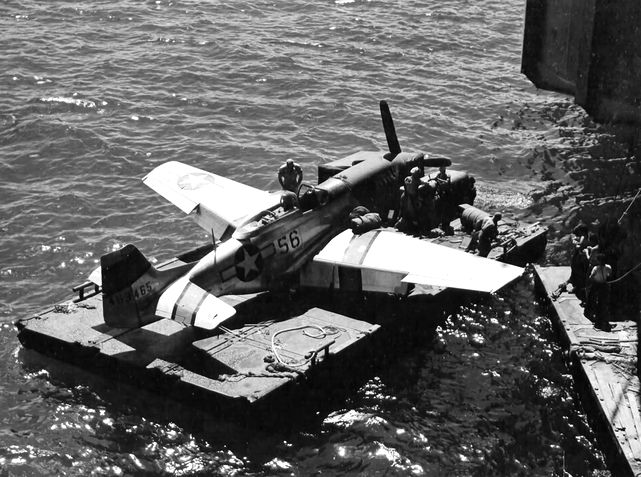
P-51D-20-NA (44-63465), 45th FS 15th FG, Guam 1945
© US NARA (domaine public - public domain)
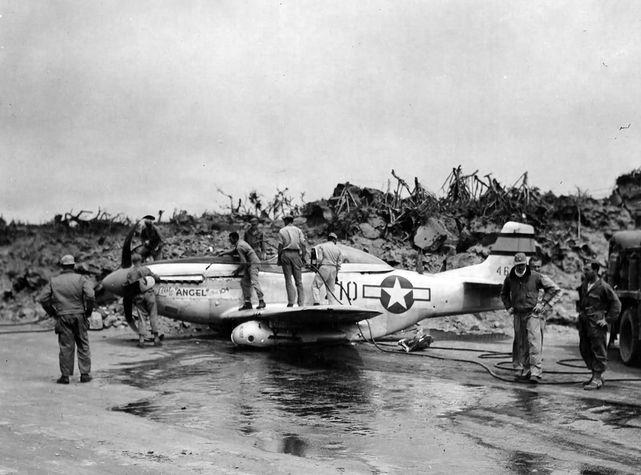
P-51D-20-NA (44-63532), Lt Thomas Quinn, 46th FS 21st FG, Iwo Jima 12 avril/April 1945
© US NARA (domaine public - public domain)

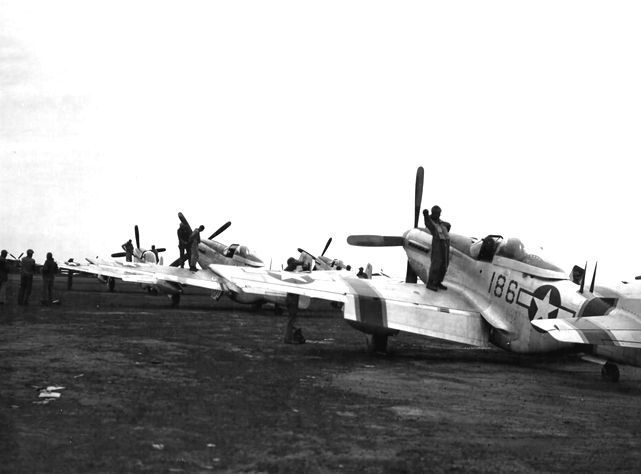
Mustang P-51D-20-NA (44-63375) 47th FS 15th FG, Iwo Jima, 1945
© US NARA (domaine public - public domain)
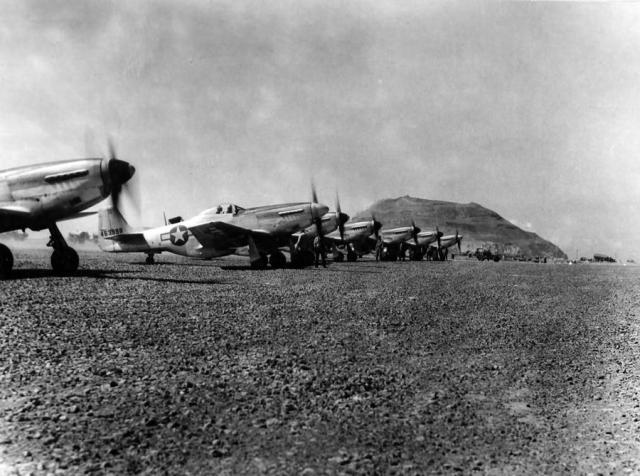
Mustang P-51D-20-NA (44-63998) 47th FS 15th FG, Iwo Jima, 1945
© US NARA (domaine public - public domain)
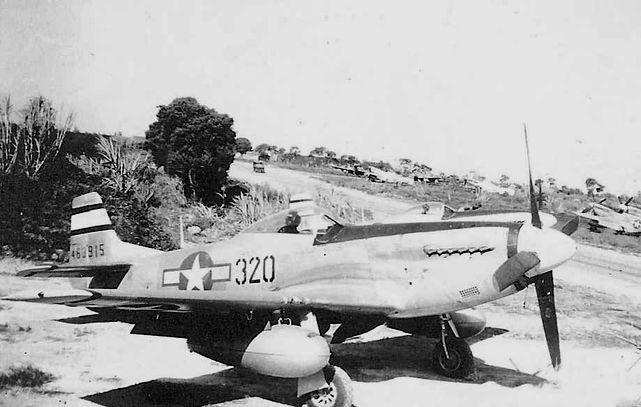
Mustang P-51D-20-NA (44-63915) 531st FS 21st FG
© US NARA (domaine public - public domain)
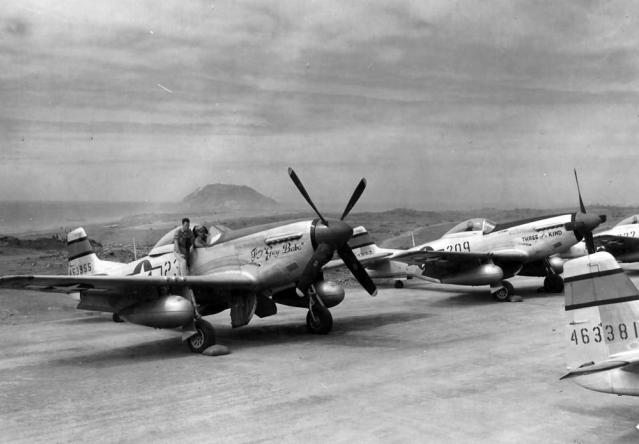
Mustang P-51D-20-NA (44-63955) “Tiny gay Baba”, 46th FS 21st FG, Iwo Jima 1945
© US NARA (domaine public - public domain)
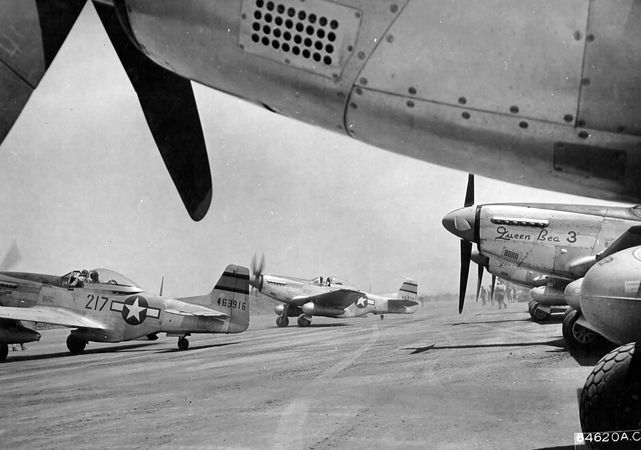
Mustang P-51D-20-NA (44-63916) “Elaine”, 46th FS 21st FG, Iwo Jima 1945
© US NARA (domaine public - public domain)
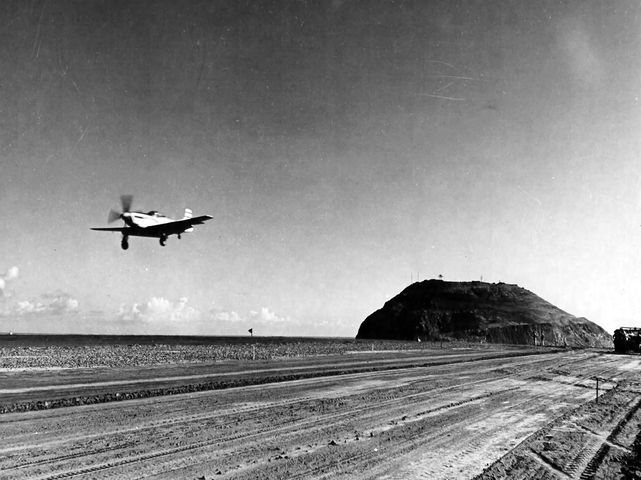
Mustang P-51D, Iwo Jima, 21st FG
A l'atterrissage - About to land
© US NARA (domaine public - public domain)
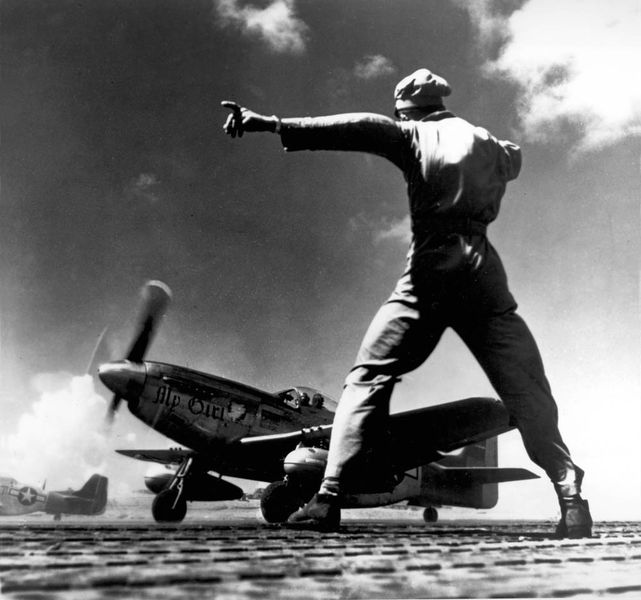
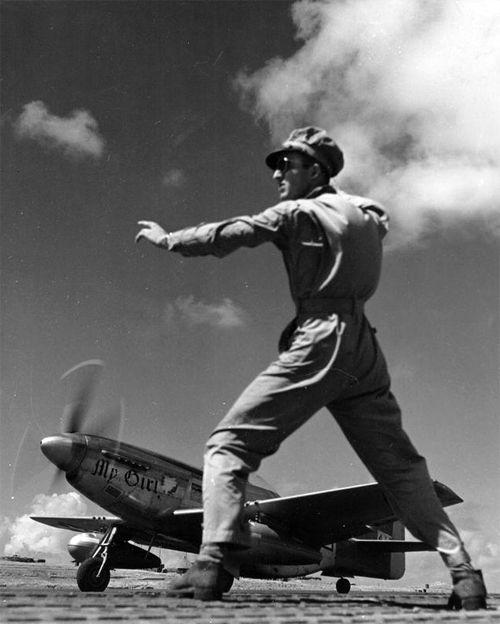
P-51D "MY GIRL", 457th FS, 506th FG, North Field, Iwo Jima
© US NARA (domaine public - public domain)
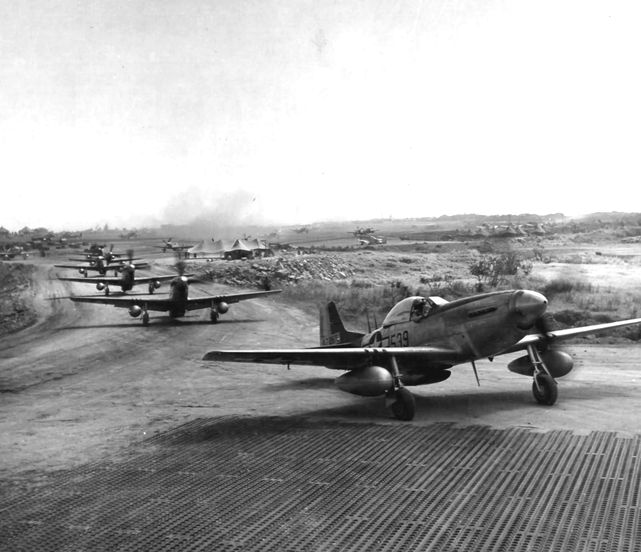
P-51D-25-NA (44-72875), 457th FS, 506th FG, Iwo Jima, 1945
© US NARA (domaine public - public domain)
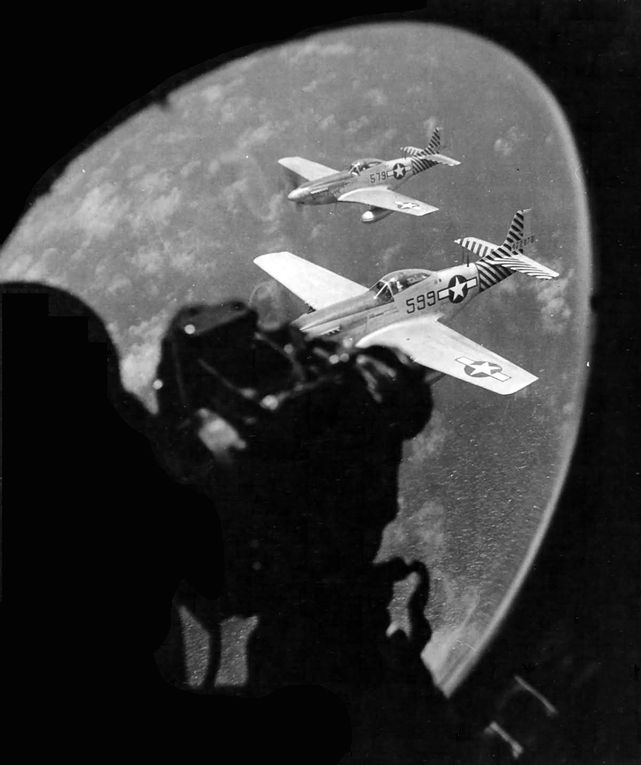
P-51D-20-NA "Satans Flame" (44-72559), 458th FS, 506th FG, Iwo Jima, 1945
Vu depuis un B-29 - View from a B-29
© US NARA (domaine public - public domain)
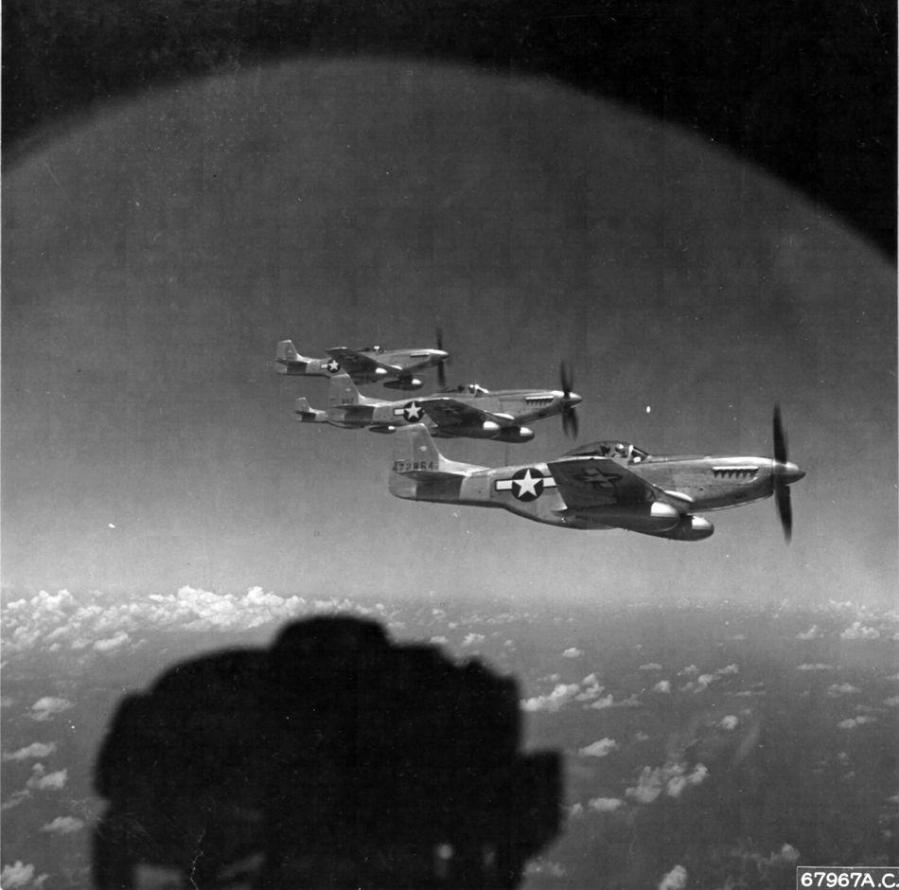
P-51D (s/n 44-72864 + ...), Iwo Jima, 1945
Escortant des B-29 lors d'un vol retour d'Iwo Jima, Bonin Islands, juillet 1945 - Escorting B-29 on a trip Back To Iwo Jima, Bonin Islands. July 1945
© US NARA (domaine public - public domain) NARA 342-FH-3A03156-67967AC
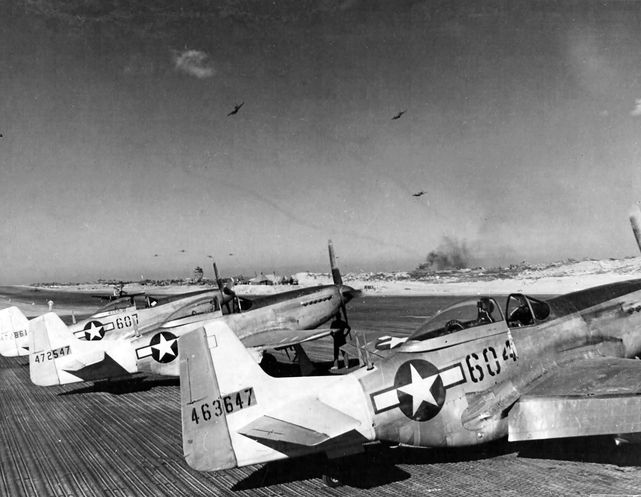
P-51D-20-NA (44-63647), 462nd FS, 506th FG, Iwo Jima, 1945
© US NARA (domaine public - public domain)
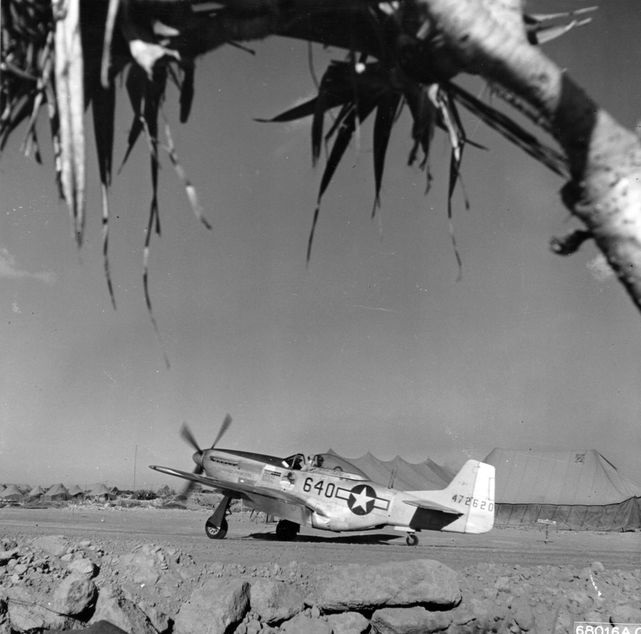
P-51D-20-NA (44-72620), 462nd FS, 506th FG, Iwo Jima, 1945
© US NARA (domaine public - public domain)
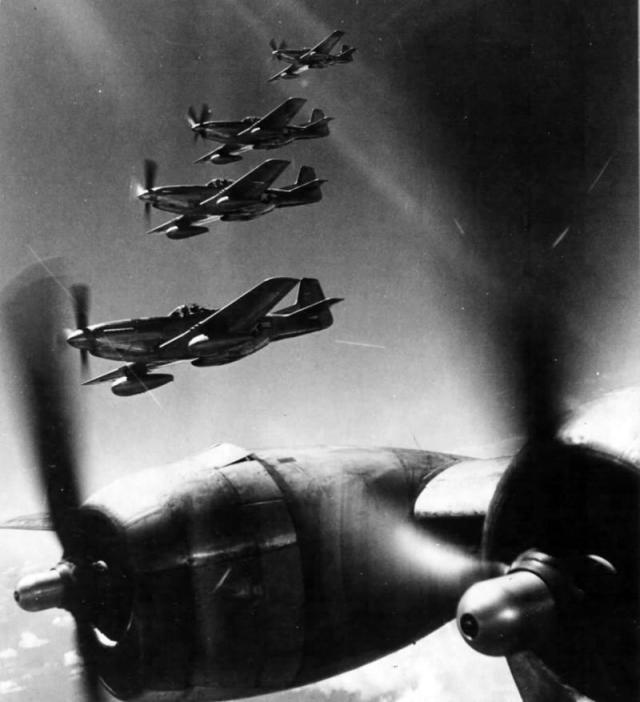
P-51D, Iwo Jima, 1945
Escorte de B-29 - Escorting B-29s
© USAF (domaine public - public domain)
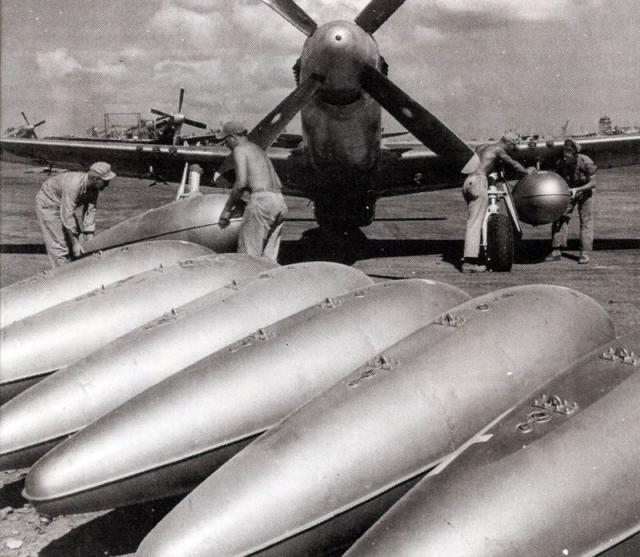
P-51D, Iwo Jima, 1945
© USAF (domaine public - public domain)
14TH AIR FORCE
Après avoir fait partie de la 10th Air Force, équipé alors de A-36, P-51 A, puis B et C, le 311th FG fut rattaché à la 14th Air Force d'août 1944 à décembre 1945. Il était alors basé à Pungchacheng, en Chine.
Having been affected to the 10th Air Force, then equipped with A-36, P-51 A, later B and C, the 311th FG was affected to the 14th Air Force from August, 1944 till December, 1945. It was then based at Pungchacheng, in China.
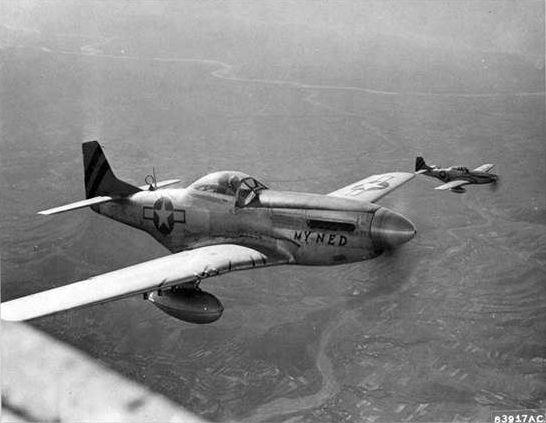
P-51D “MY NED”, 530th FS 311th FG
Mission d'escorte de C-47, 24 juillet 1945 - Escorting C-47, 24th July, 1945
© US NARA (domaine public - public domain)
P-51H
Le P-51 H ne fut pas utilisé outre Atlantique bien qu'une rumeur dit qu'un groupe en aurait été équipé dans le Pacifique.
The P-51 H was not used across the Atlantic ocean although a rumor says that a group used P-51 H in the Pacific area.
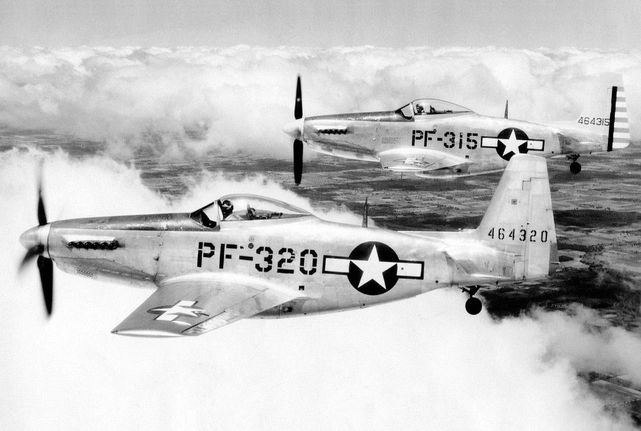
P-51H-5-NA (44-64320 & 44-64315)
© US NARA (domaine public - public domain)
Les Mustang français
The french Mustang
Le 1er janvier 1945, la 1ère escadrile du GR 2/33 devient le GR 1/33 Belfort et la 2ème escadrille le GR 2/33 Savoie. Le 1/33 devra être rééquipé en Lightning pour la reconnaissance photographique. Le 2/33 devra remplacer ses Spitfire par des Mustang de reconnaissance photographique. C'est ainsi que le 14 (16 ?) janvier, le Mustang 43-7045 est livré à Luxeuil au 2/33.
On January 1st, 1945, the 1st squadron of the GR 2/33 became GR 1/33 Belfort and the 2nd squadron GR 2/33 Savoie. The 1/33 was converted in Lightning for photo reconnaissance. The 2/33 had to replace its Spitfire by Mustang of photo reconnaissance. Then on January 14th (16th ?), the Mustang s/n 43-7045 was delivered at Luxeuil to the 2/33.
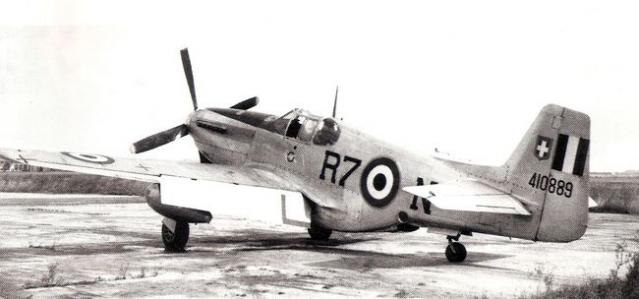
F-6C-10-NT s/n 44-10889 - GR II/33
Photo : source inconnue - source unknown
22 Mustang seront livrés entre le 16 janvier et le 24 mars 1945 (3 P-51B, 9 P-51C, 9 P-51D et 1 P-51K). Ces Mustang, tous appelés P-51 seront en fait des F-6 de reconnaissance. Au final 27 F-6 auraient été livrés jusqu'en mai et 26 figurent sur les contrôles du 2/33. Après les hostilités, les F-6 du 2/33 participent aux manoeuvres et effectuent des missions photographiques pour l'IGN, notamment en Afrique.
22 Mustang were delivered between January 16th and March 24th, 1945 (3 P-51B, 9 P-51C, 9 P-51D and 1 P-51K). These Mustangs, all named P-51 were in fact reconnaissance F-6. In total 27 units of F-6 were delivered until May and 26 appeared on the controls of the 2/33. After the war, the F-6s of 2/33 participated in various manoeuvres and operated photographic missions for the IGN (National Geographic Institute), in particular in Africa.
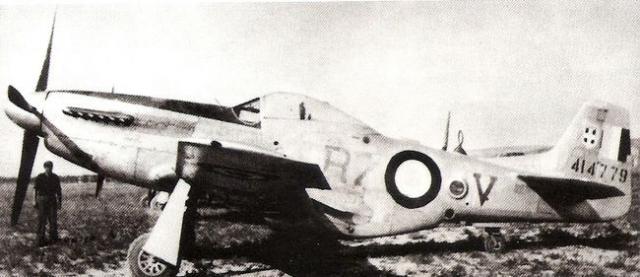
F-6D-10-NT s/n 44-14743 - GR II/33
Photo : source inconnue - source unknown

North American F-6
Dans l'Armée de l'Air du 16-01-1945 au 07-05-1945
In th French Air Force from 1945-01-16 to 1945-05-07
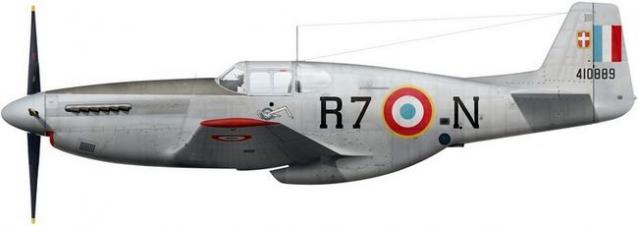
F-6C-10-NT s/n 44-10889 - GR II/33
© Gaëtan Marie - Mustang !

F-6D-10-NT s/n 44-14717 - GR II/33
© Gaëtan Marie - Mustang !

F-6D-10-NT s/n 44-14779 - GR II/33
© Jean-Marie Guillou
LES PERTES - LOSSES
44-14494 - Lt Reder, 01/01/1945 accidenté au décollage - damaged during take-off
44-10884 - Lt Callac, 22/02/1945 perdu en mer, blessé - lost in the sea, injured
44-14512 - Lt Labadie, 20/03/1945 flak sur la Forêt Noire, prisonnier - flak over Black Forest, prisoner
44-14605 - Lt Delègue, 17/04/1945 abattu par la chasse (Me 109), tué - shot down by fighters (Me 109), killed
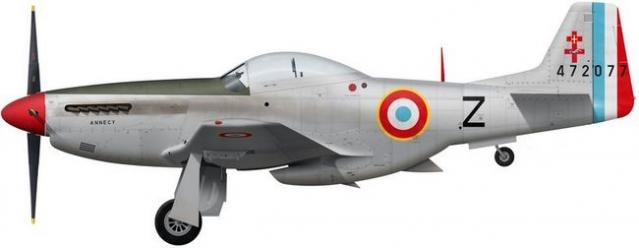
P-51D-20-NA 'Annecy' - GR II/33, 1952
© Gaëtan Marie - Mustang !
